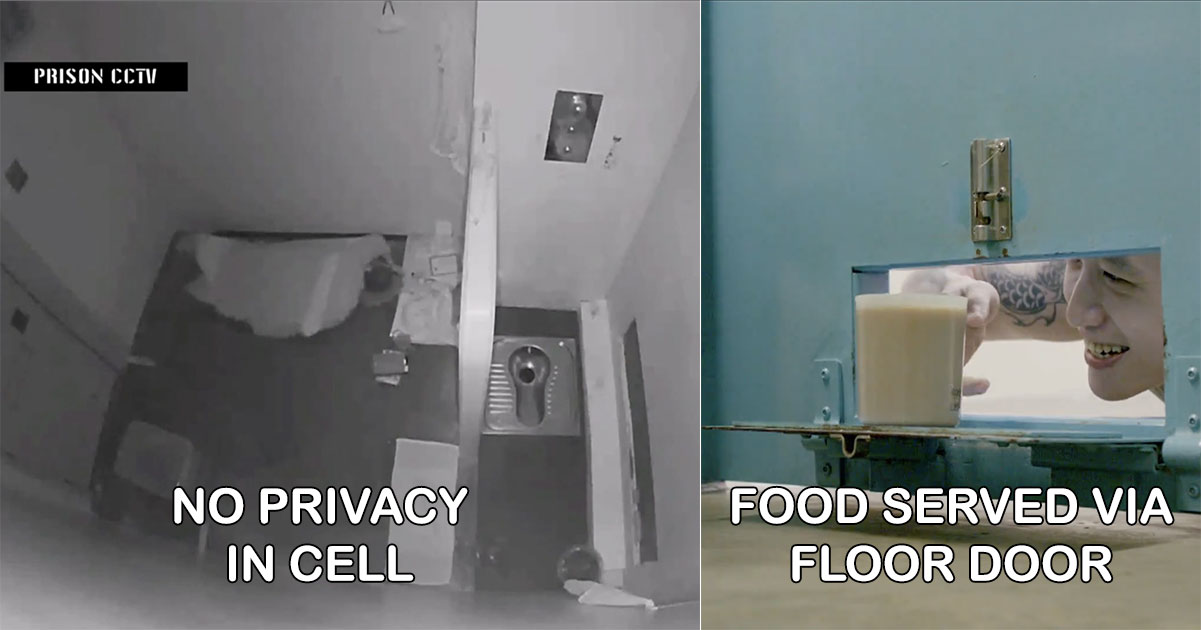Follow us on Telegram for the latest updates: https://t.me/mothershipsg
There is a lot of stigma attached to going to jail in Singapore.
Life behind bars is fraught with preconceived notions, such as how the facility is filled with scourges of society that need to be tucked away in a corner of the island, or else.
But what people who have never been incarcerated don't know, is that prison is a microcosm of society -- there are indeed "bad people", but also people from all walks of life who end up there because of circumstances.
Society fears what it doesn't know
Over the years, Singapore has emphasised efforts of the Yellow Ribbon Project, which is an initiative to foster societal acceptance of those convicted so as to allow rehabilitated former inmates to re-enter society as gainfully employed and law-abiding citizens.
It is, essentially, a "second chance" initiative.
But as always, what the public doesn't know, the public fears and questions.
New documentary series can change public perception
Which is why a new documentary series on CNA Insider produced by Mediacorp is giving, for the first time, an eye-opening intimate peek into what life is like inside the fortress that is Changi Prison Complex.
The docuseries, "Inside Maximum Security", provides a never-before-seen look into one of Singapore's most tightly guarded facilities, owing to the unparalleled access that was given to the show's makers.
One fact of the series stood out though.
It stated that at least one in five inmates are back in jail within two years after their release.
Who are the criminals that go to Changi Prison?
And if this is part of the demystifying process of who goes to prison and what happens inside, it is doing its job.
Five inmates were interviewed to get a fuller profile of who they are and why they ended up in prison, all of whom agreed to show their faces and reveal their identities -- a set-up to remind everyone that convicts are also people who have their own troubles, but also hopes, aspirations, and regrets
The spotlight on the selected inmates humanises them.
In the first episode, four of the inmates were profiled and given significant airtime for the audience to get a sense of their personalities.
1. Boon Keng, 34
Not the place, but a person who apparently enjoys dining at restaurants. Will be best remembered for rating prison food, especially the noodles, a zero on a 0 to 10 rating. From certain angles, he looks like a pirated Asian version of the late Chester Bennington of Linkin Park.
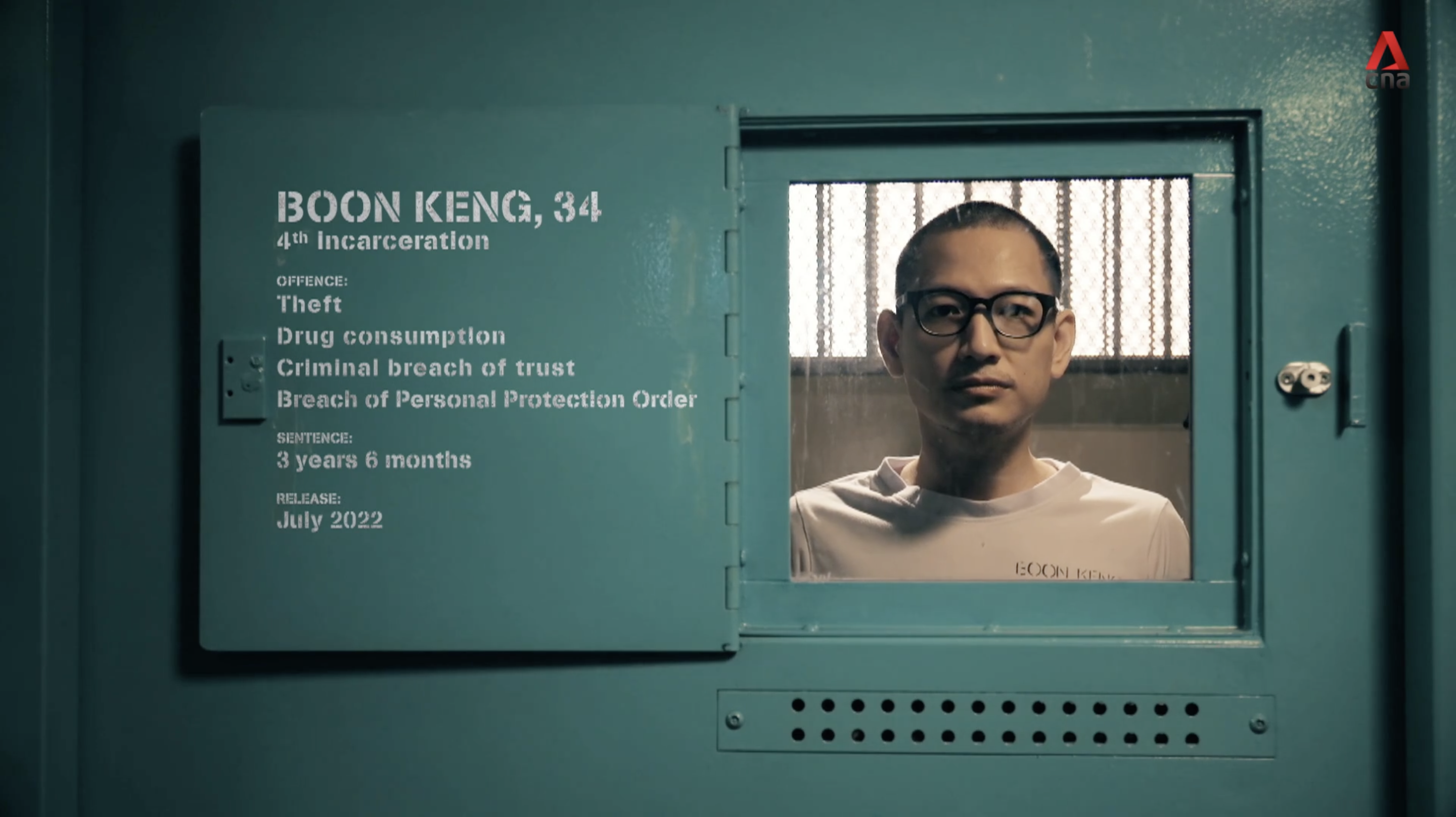 Image screenshot from CNA video.
Image screenshot from CNA video.
2. Rusdi, 33
A personal trainer who ventured onto Istana's grounds illegally while under the influence of drugs and was caught with drug paraphernalia. Claims he likes to go to new places.
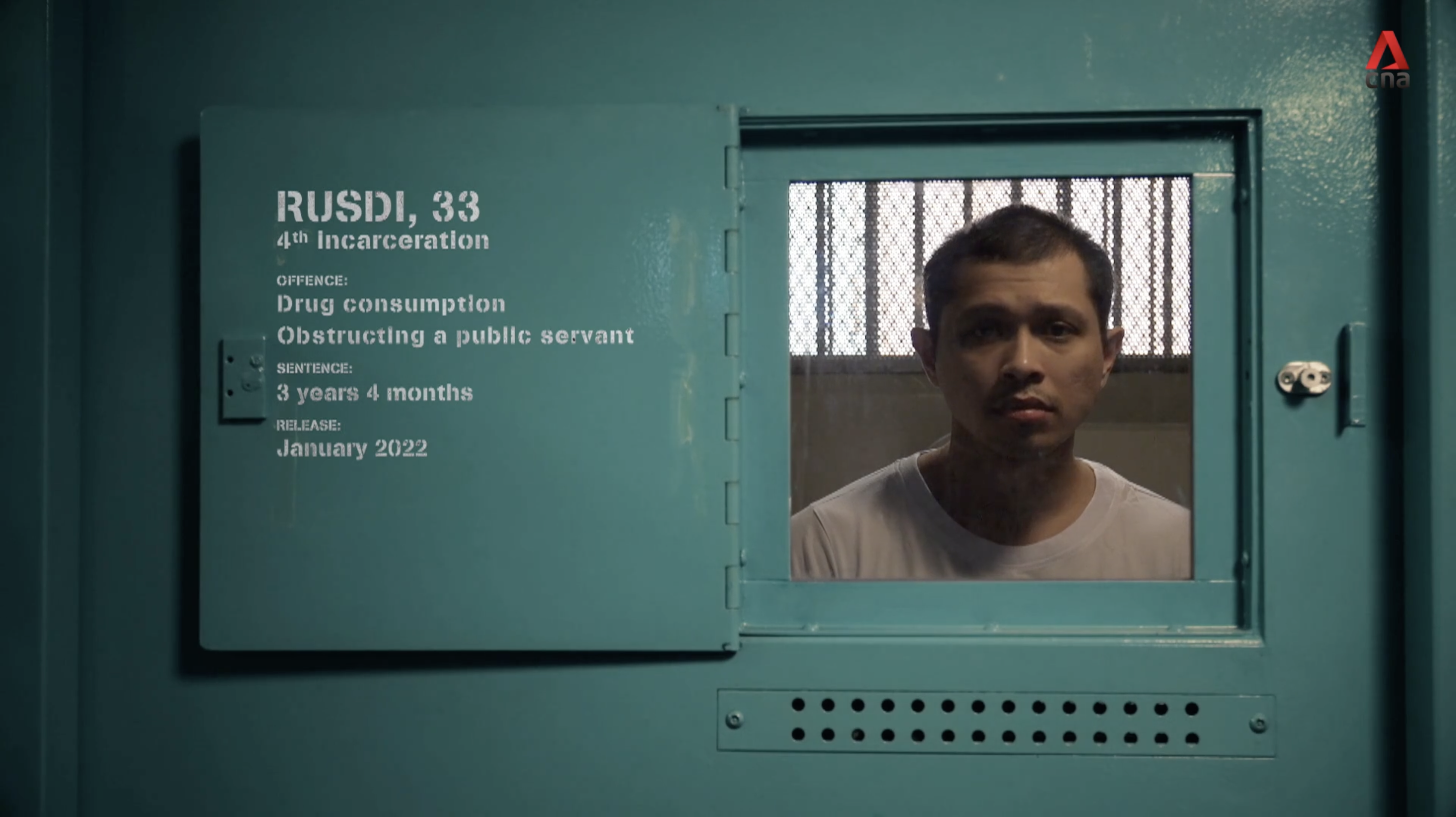 Image screenshot from CNA video.
Image screenshot from CNA video.
3. Graceson, 36
A secret society member who recounted carrying three different weapons on three separate occasions. On one occasion, he wanted to slash another man to teach him a lesson on not messing with another man's wife.
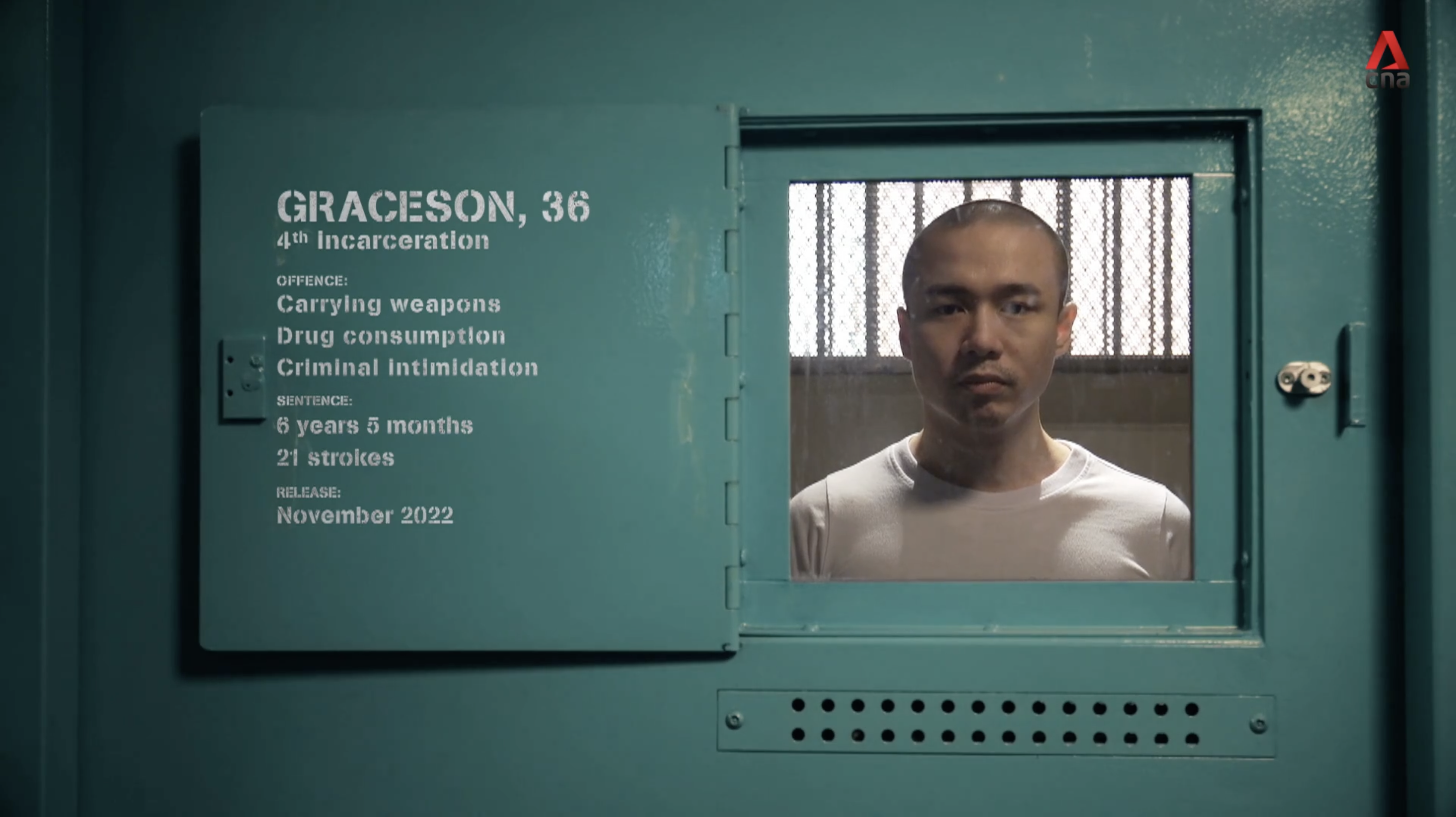 Image screenshot from CNA video.
Image screenshot from CNA video.
4. Khai, 31
An ex-skateboarder who "grabbed" and caused hurt to his then-girlfriend in the midst of an argument. Had gone semi-professional with his skateboarding stint overseas.
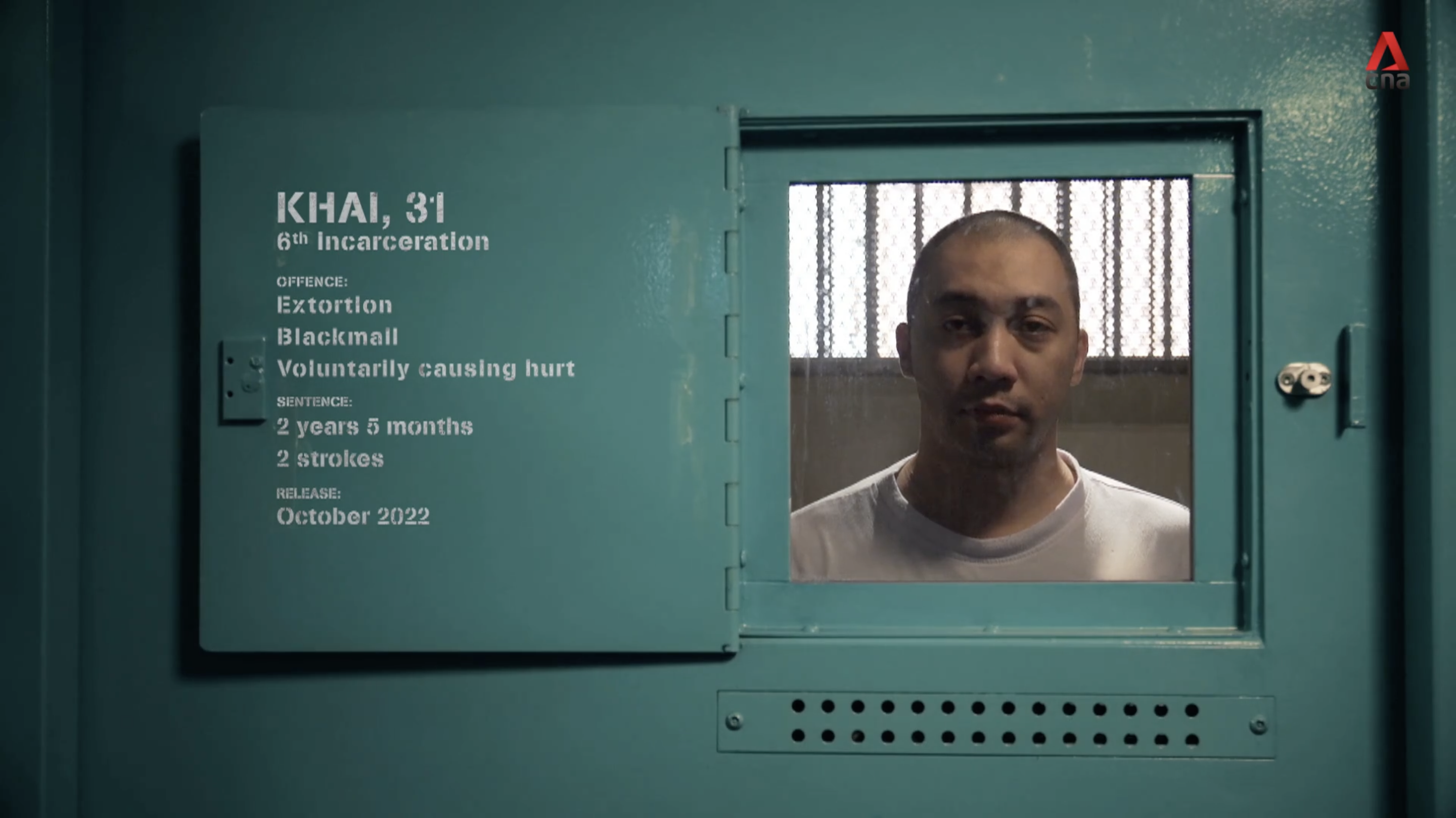 Image screenshot from CNA video.
Image screenshot from CNA video.
Based on their short bios, these four "hardened criminals" have been incarcerated at least four times for a bevy of crimes.
Here is a look at what unprecedented access into Singapore's prison wrought.
B1 and the cells within
These inmates are serving their sentences at the B1 facility at Changi Prison Complex.
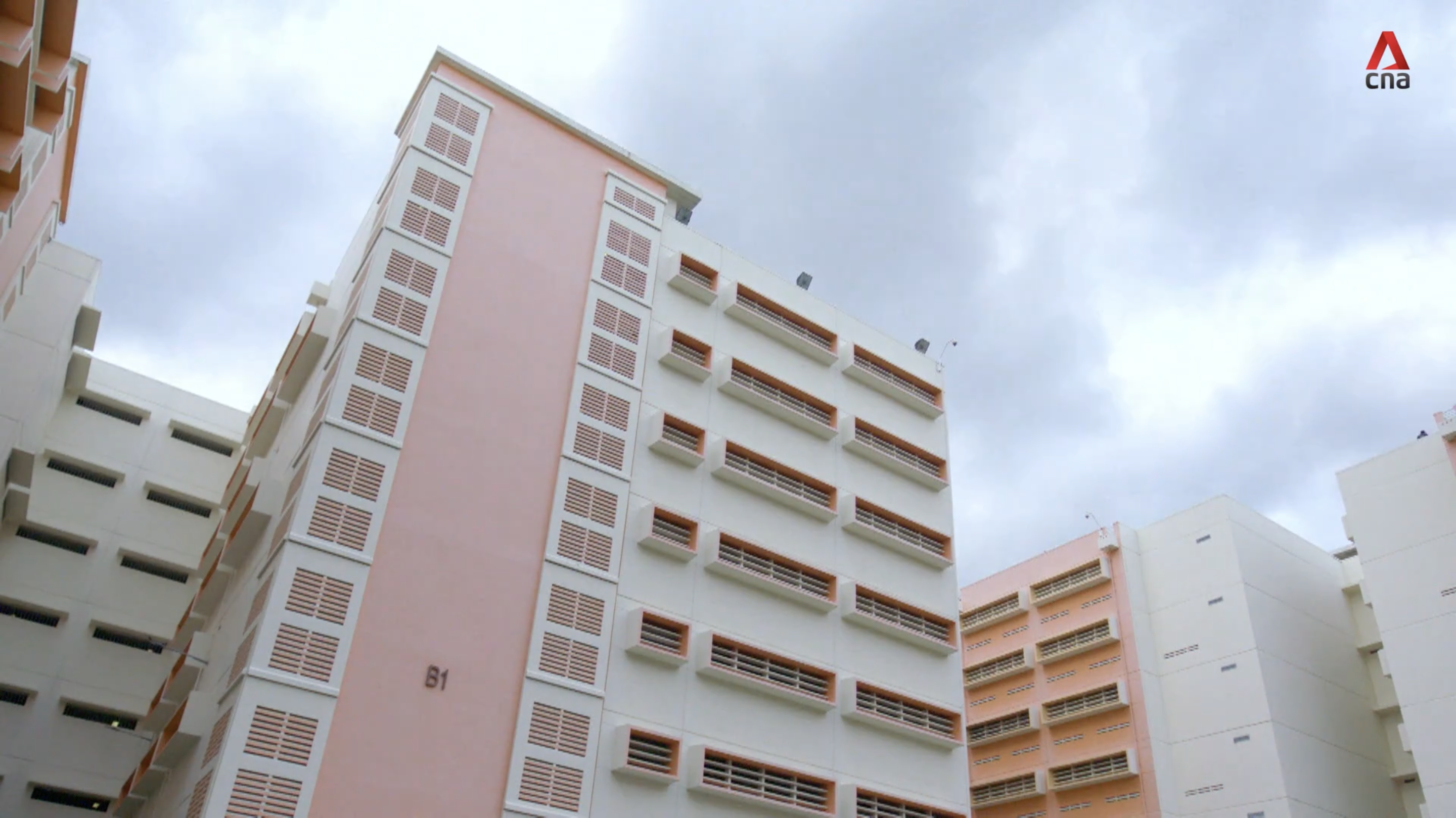 Image screenshot from CNA video.
Image screenshot from CNA video.
Single-man holding cells
B1 is a "maximum security institution" that houses inmates with long prison sentences, and/ or are receiving violence intervention programmes in single-man holding cells.
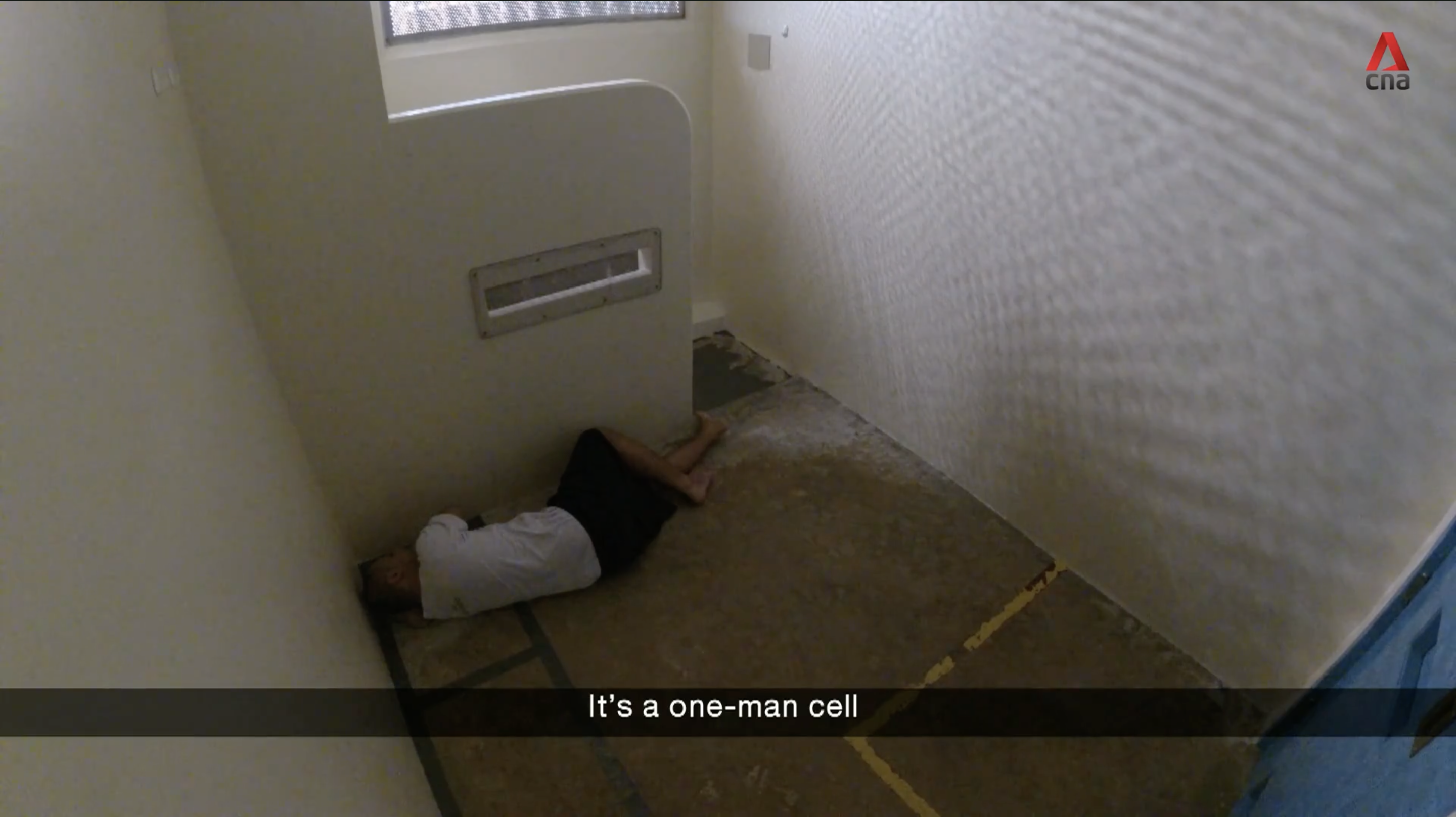 Image screenshot from CNA video.
Image screenshot from CNA video.
Prison cells are spartan
A "modesty wall" separates the combined shower and toilet area from the sleeping and living quarters within the cell.
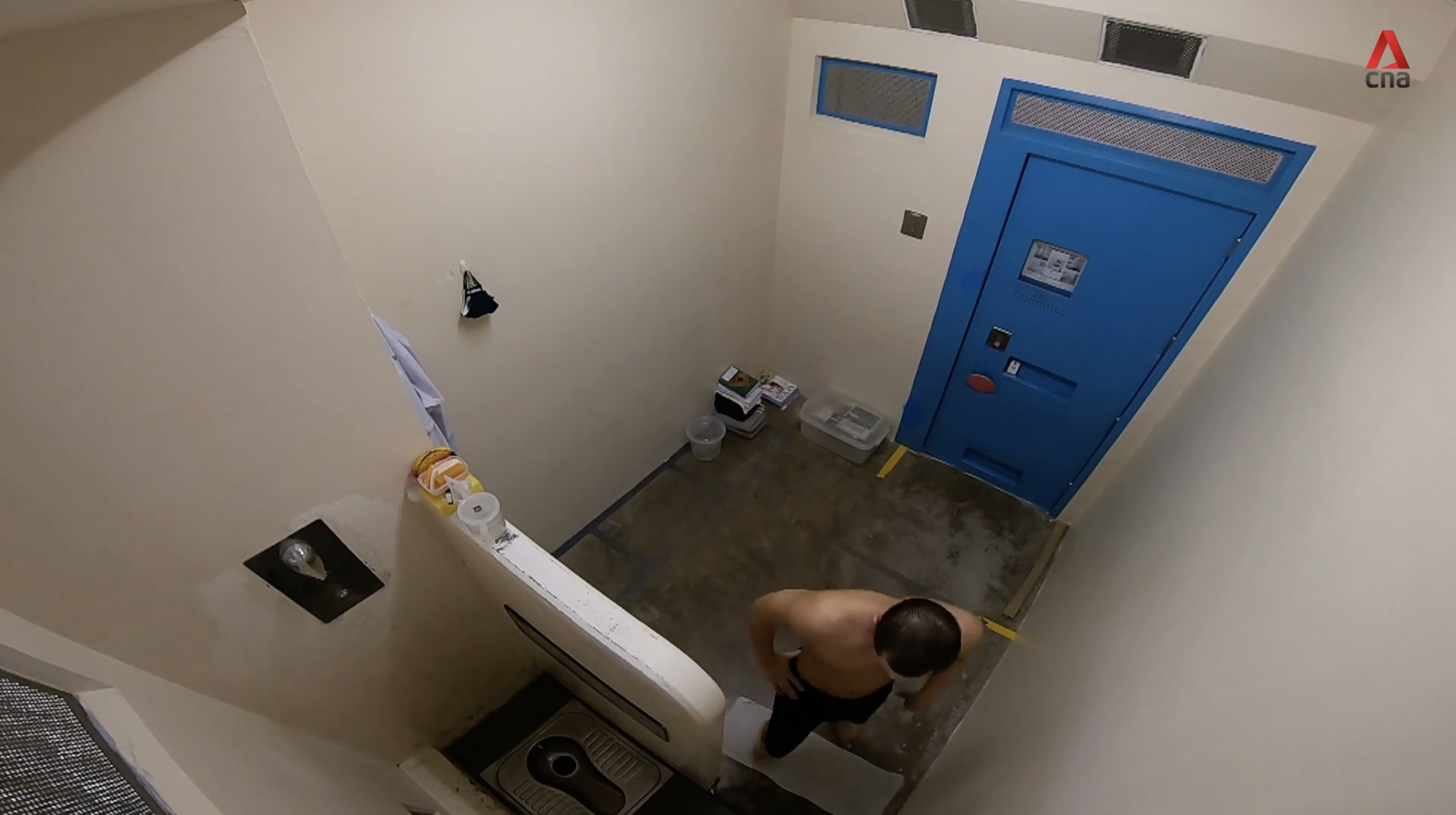 Image screenshot from CNA video.
Image screenshot from CNA video.
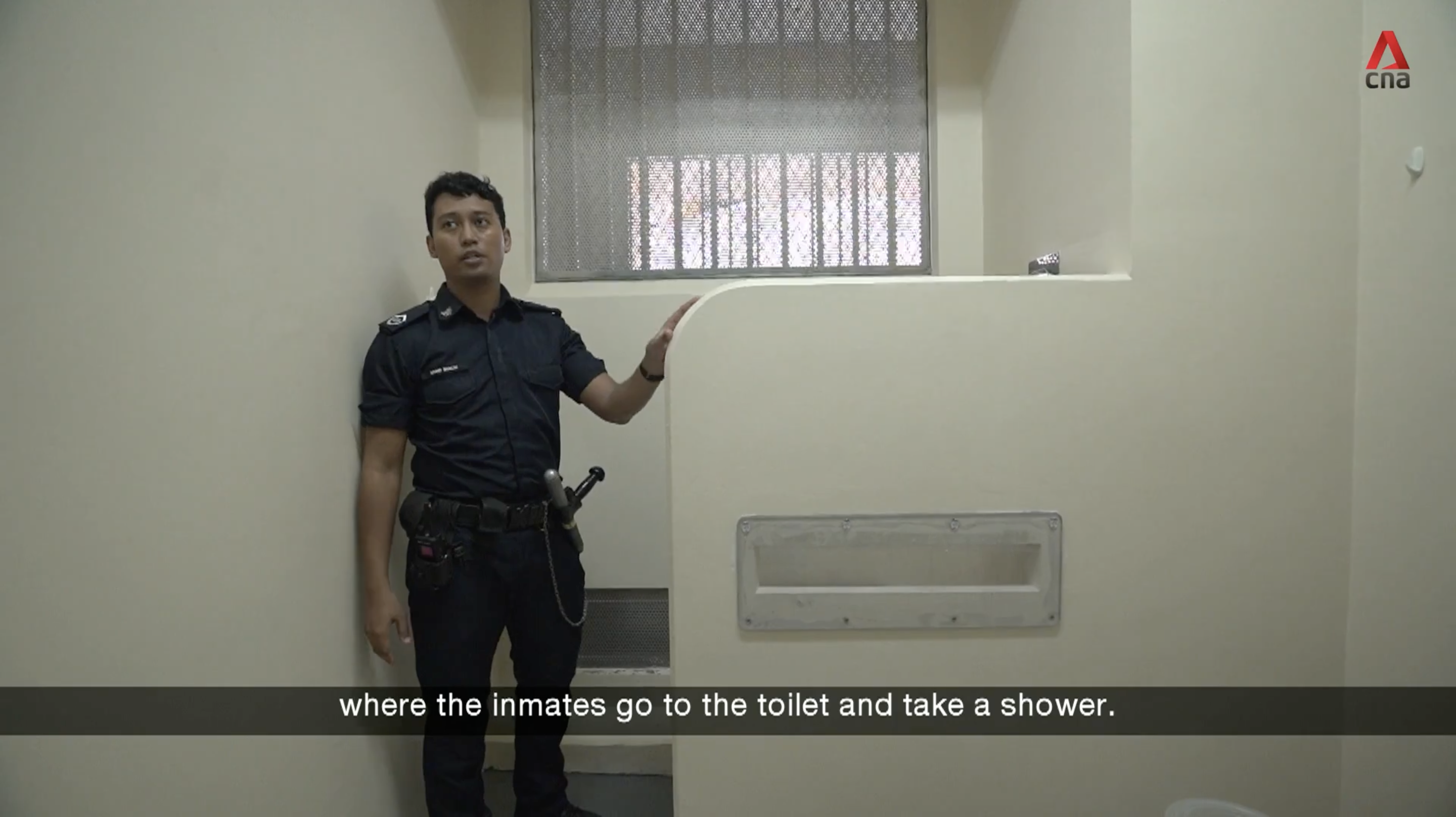 Image screenshot from CNA video.
Image screenshot from CNA video.
Three cell hooks
The cells are spartan and unfurnished, with the exception of a small square mirror, and three cell hooks for clothing.
Two of these cloth hooks are in the cell's living/ sleeping quarters, while the other hook is affixed onto the wall across the shower.
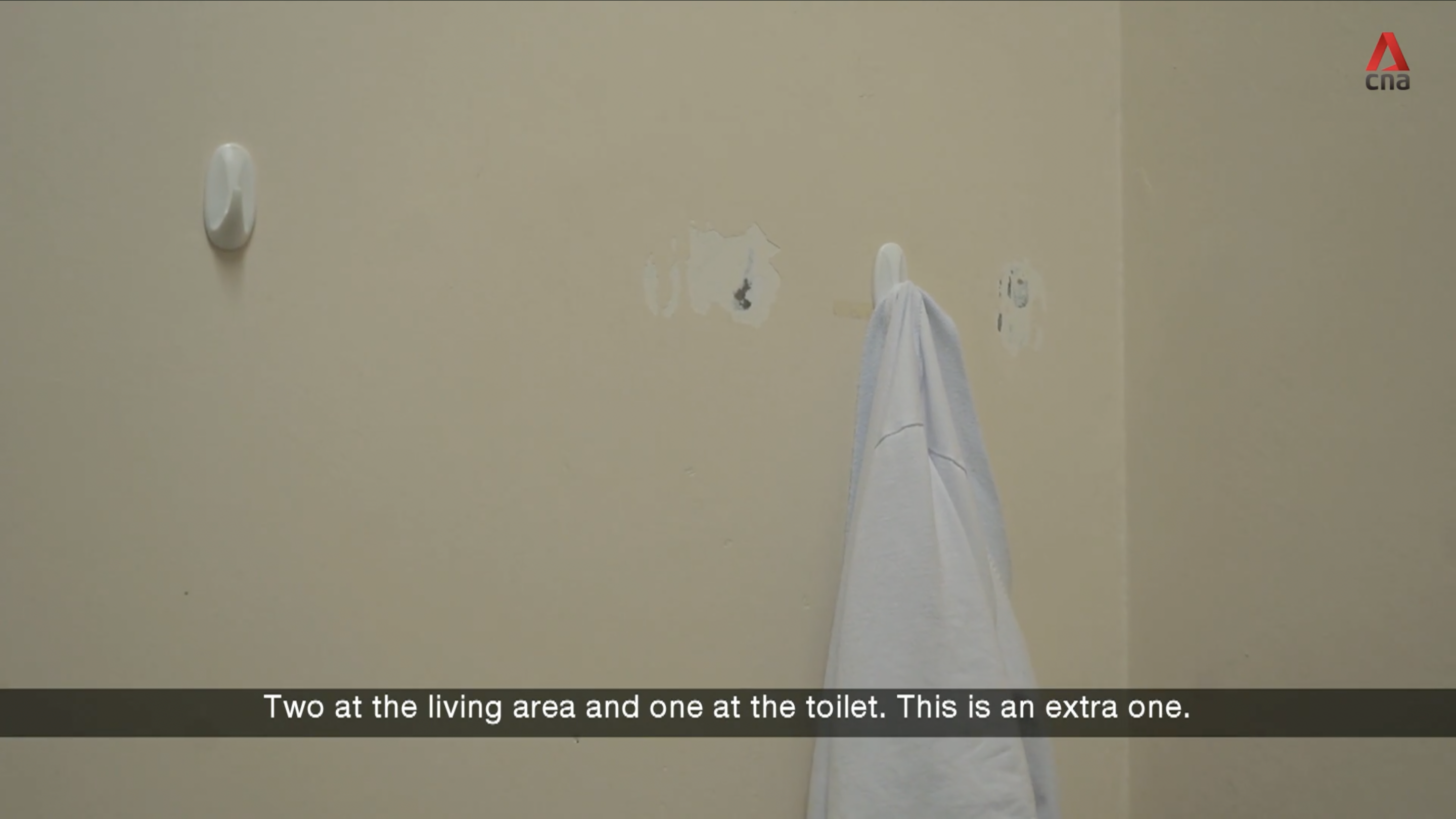 Two of the cell hooks at the living area. Image screenshot from CNA video.
Two of the cell hooks at the living area. Image screenshot from CNA video.
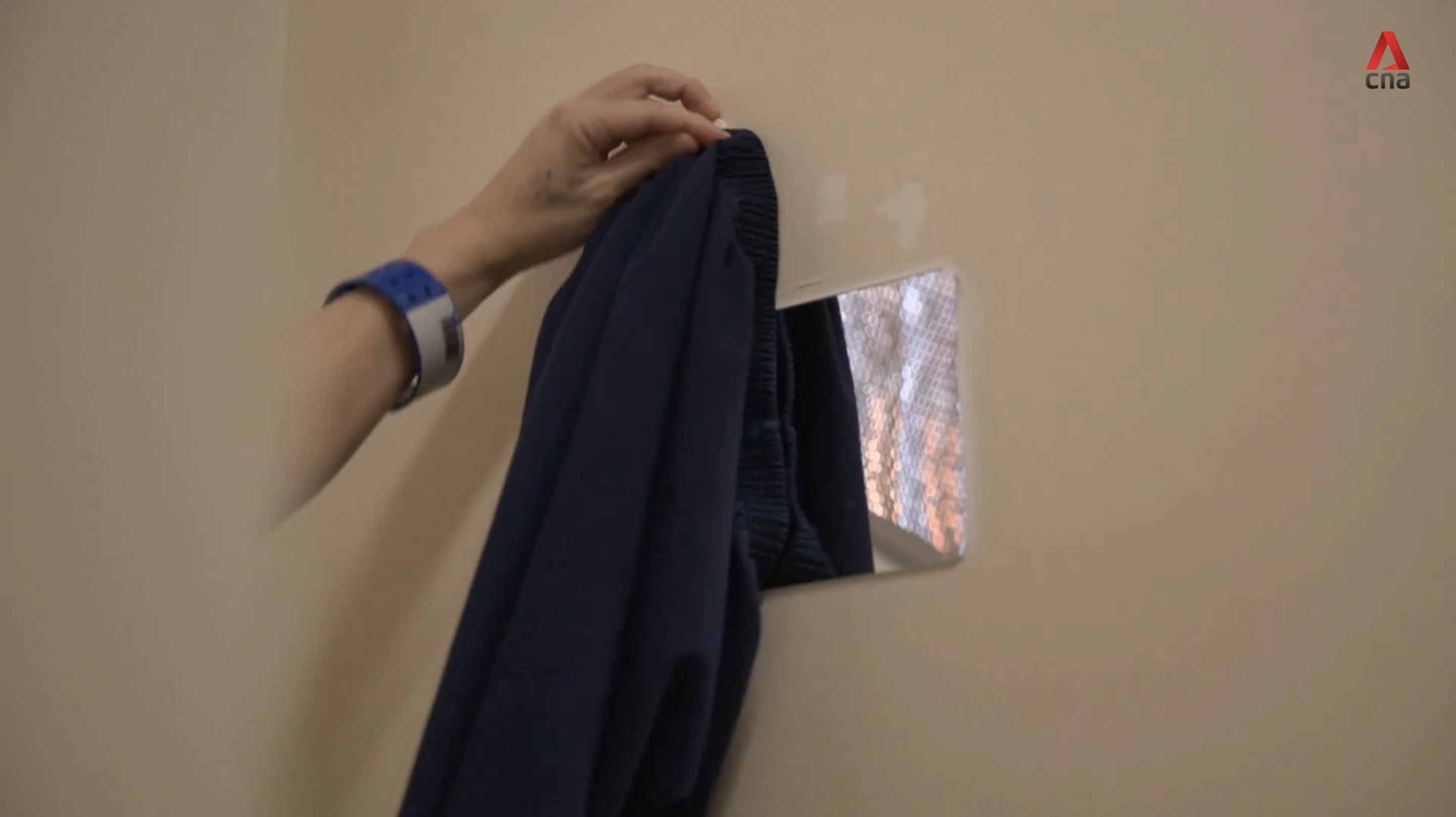 The cell hook and mirror at the toilet. Image screenshot from CNA video.
The cell hook and mirror at the toilet. Image screenshot from CNA video.
Inmates are provided two blankets and a woven straw mat.
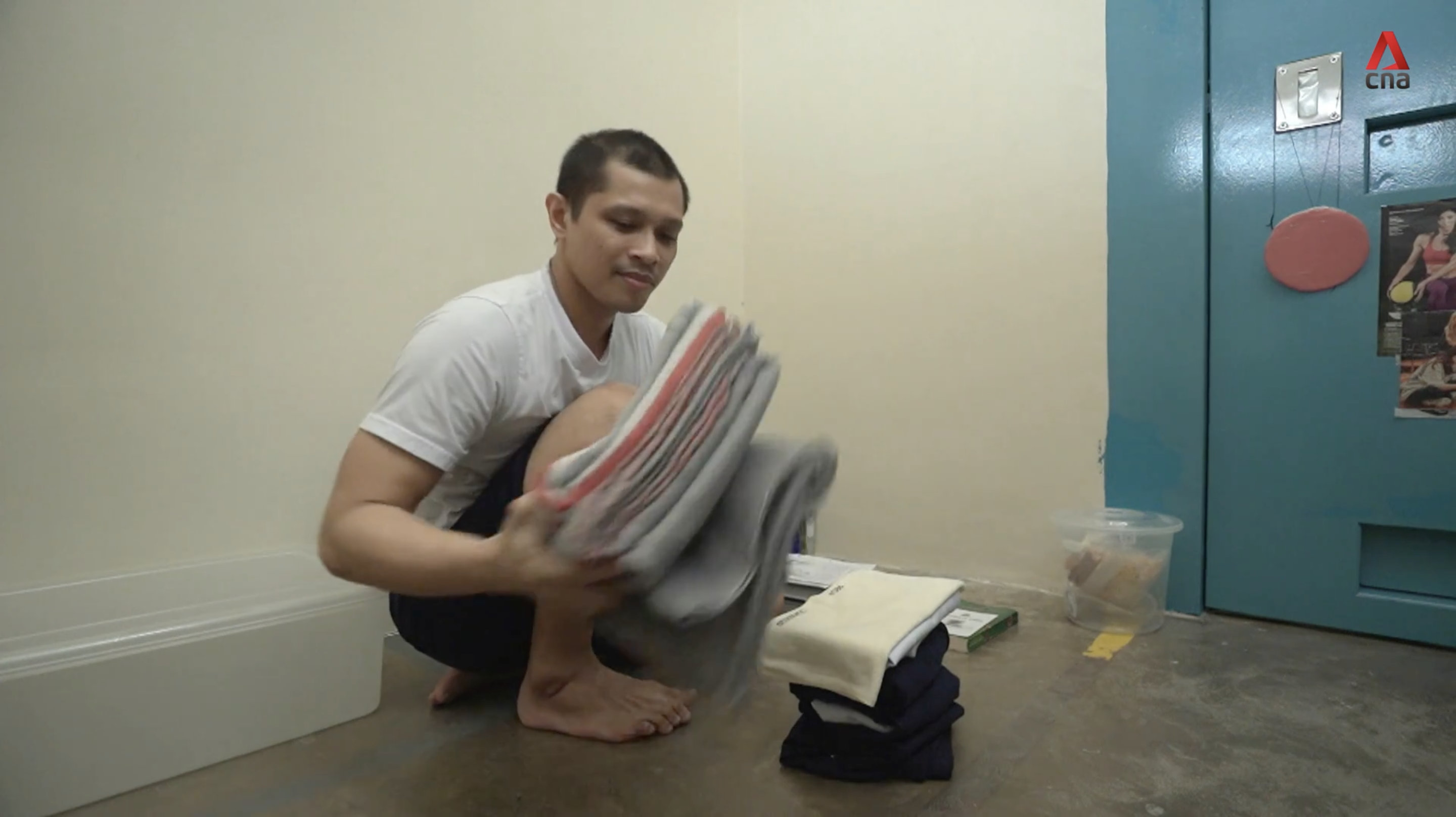 Image screenshot from CNA video.
Image screenshot from CNA video.
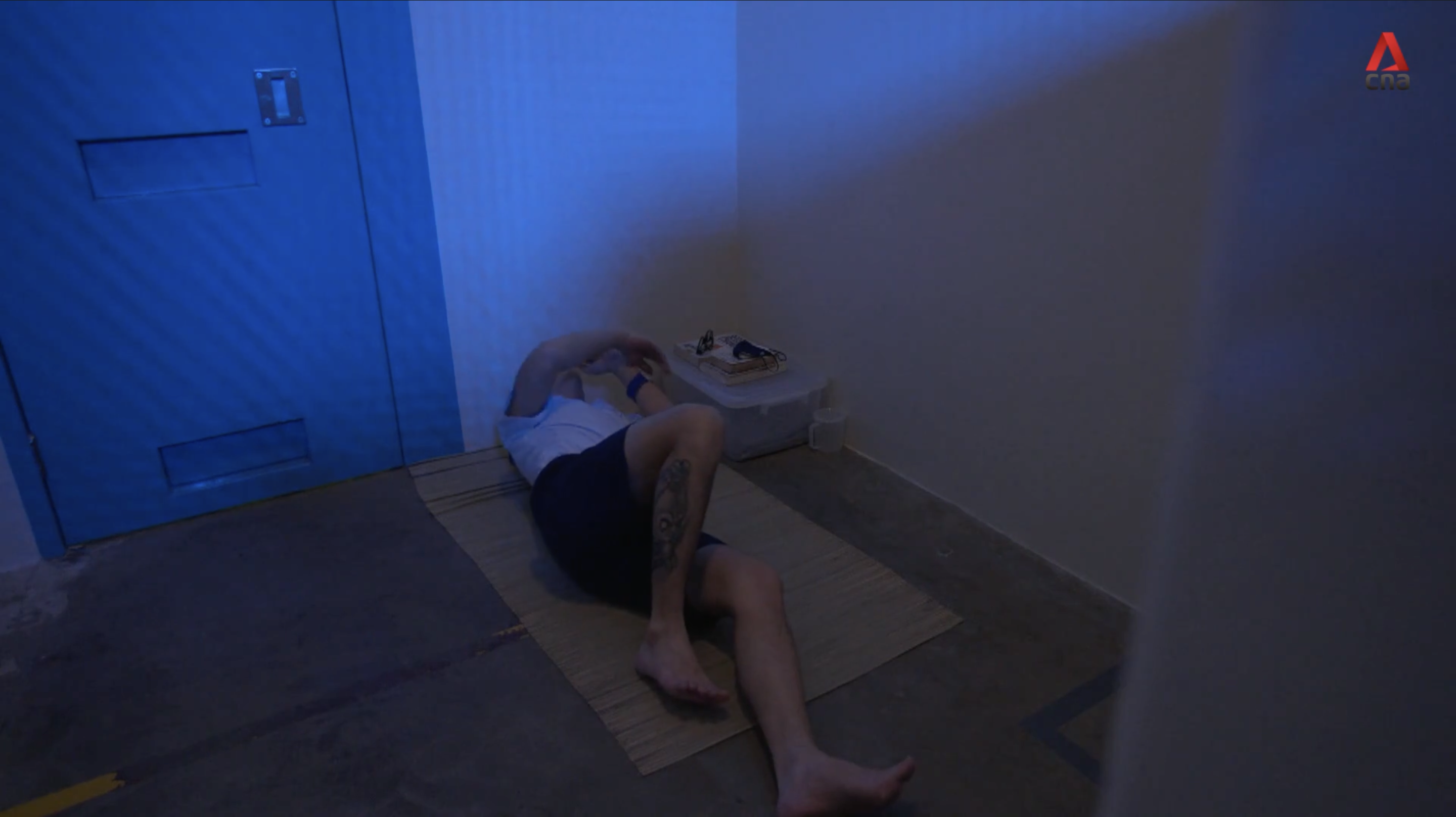 Image screenshot from CNA video.
Image screenshot from CNA video.
There is no bed.
No modification to cell allowed
Any modification to the cell is strictly prohibited, as seen in Boon Keng's cell during a search, where he added a fourth cloth hook to the shower area.
He attached the illegal hook to the wall using glue, which is made by mashing rice and water to form a starchy adhesive that actually works.
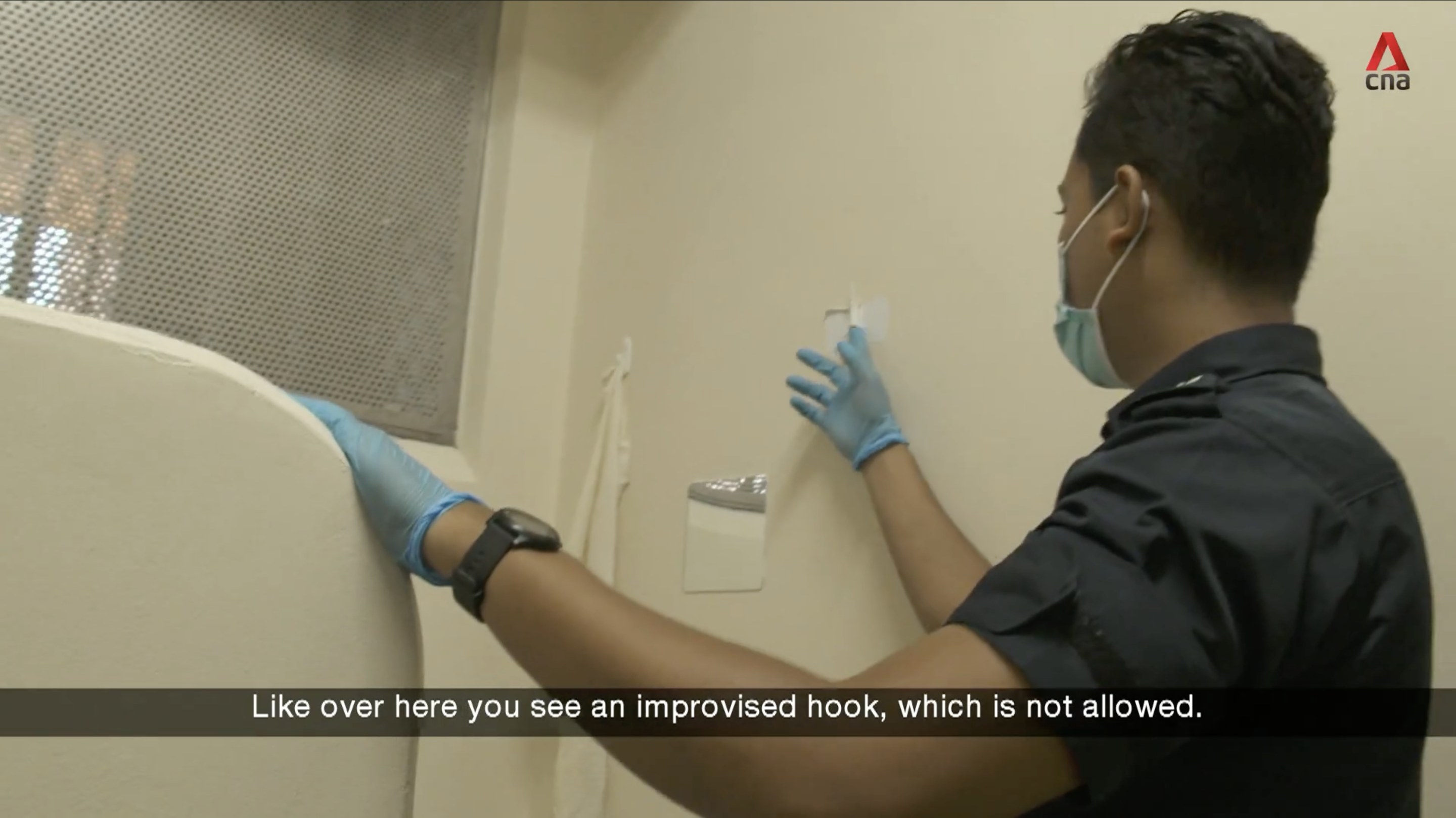 Image screenshot from CNA video.
Image screenshot from CNA video.
Most of the items are transparent, to some degree
Transparent everyday items including toothpaste, described as tasteless, and a Toyogo box are provided. Items are transparent so that inmates cannot conceal objects in them. Guards don't like surprises and it makes searches easier to conduct.
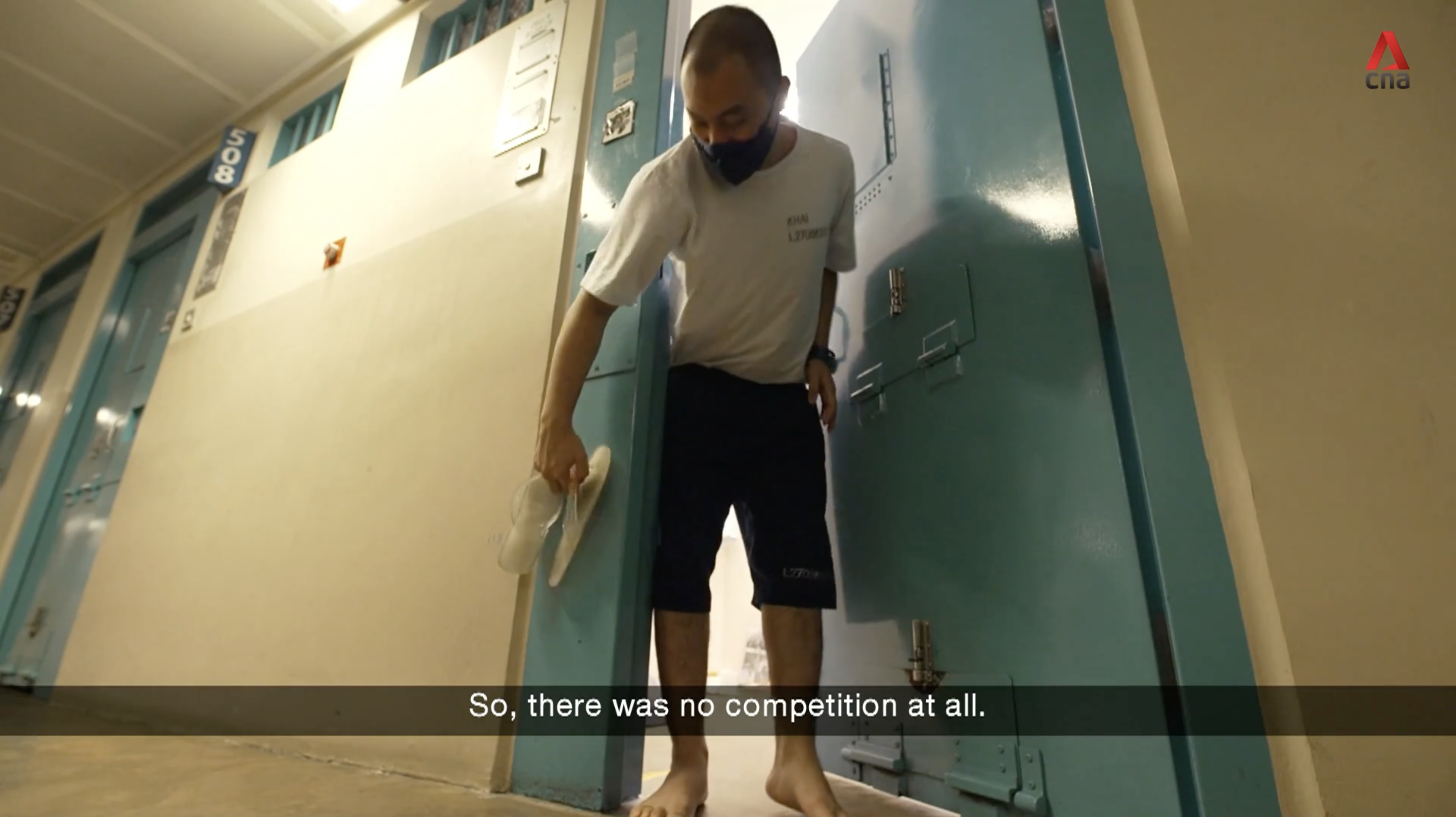 Image screenshot from CNA video.
Image screenshot from CNA video.
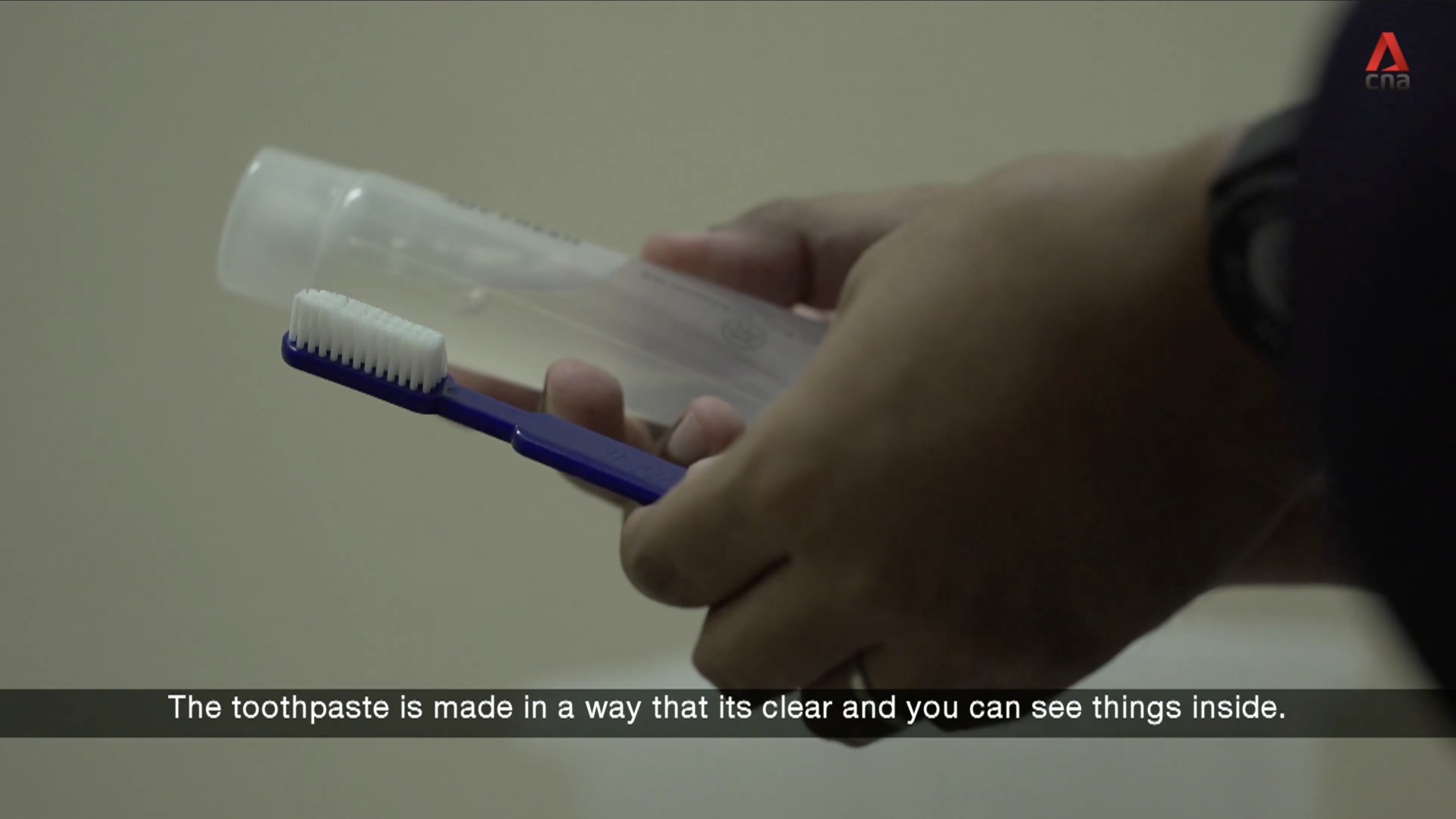 Image screenshot from CNA video.
Image screenshot from CNA video.
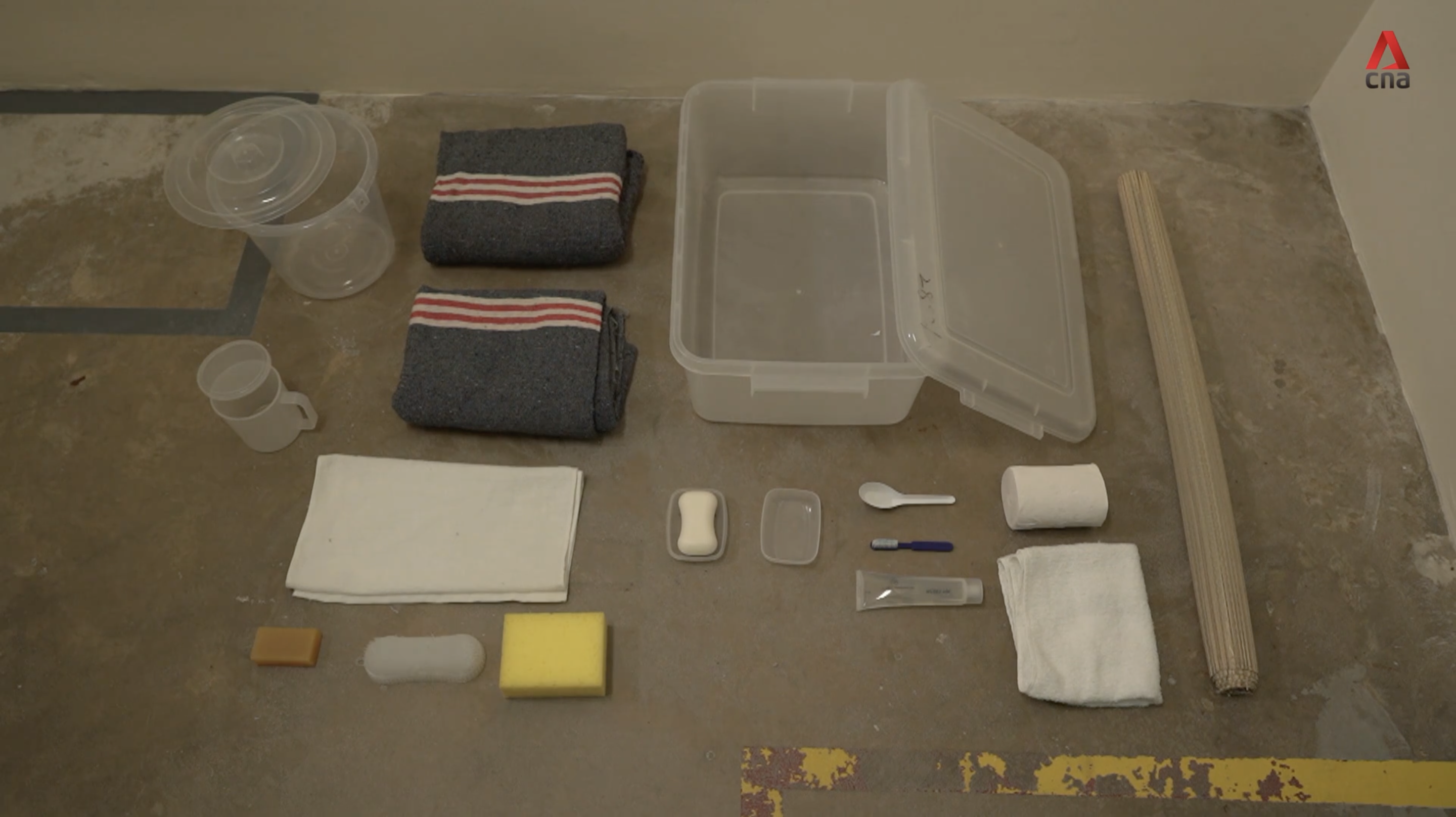 Image screenshot from CNA video.
Image screenshot from CNA video.
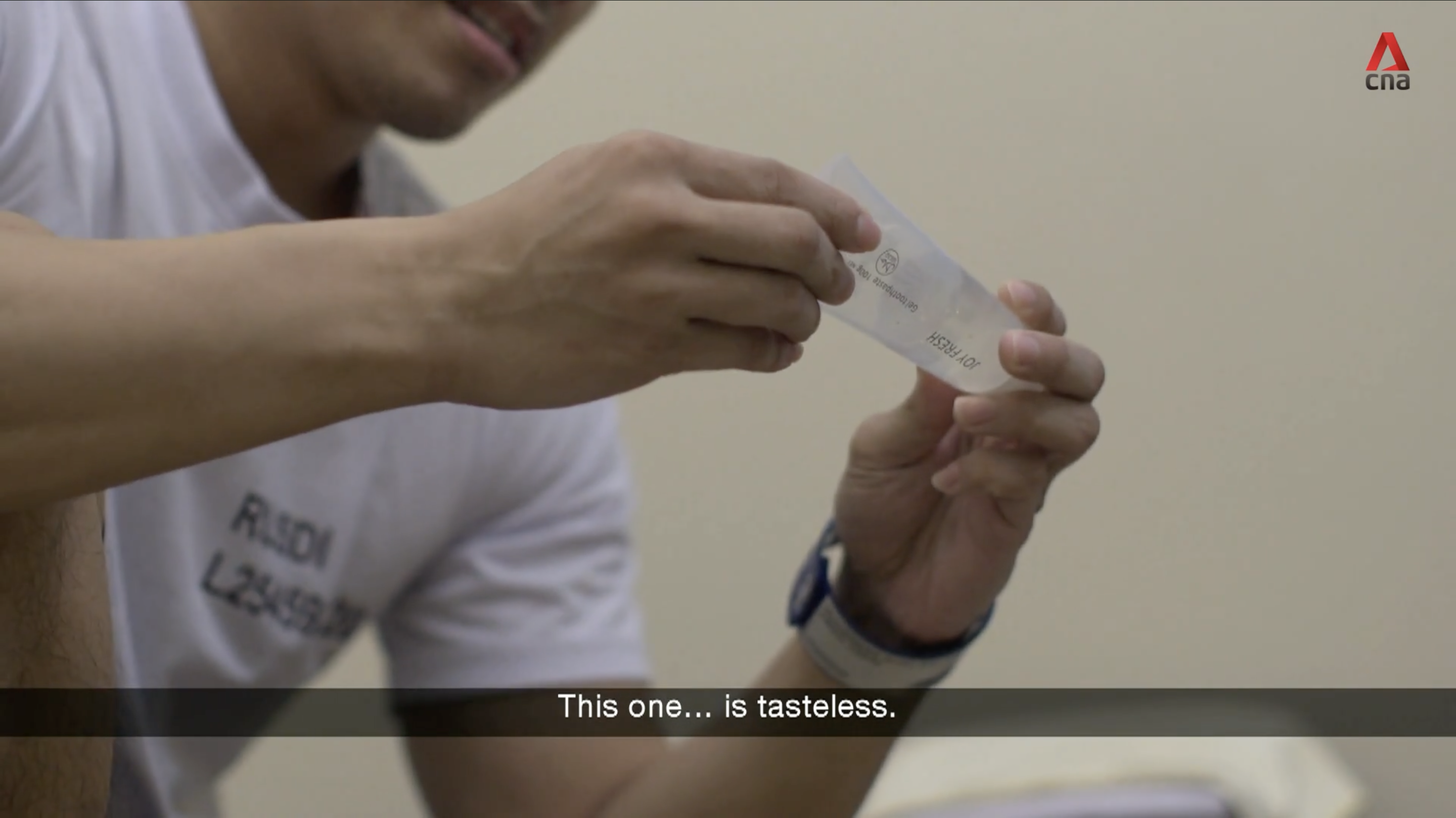 Image screenshot from CNA video.
Image screenshot from CNA video.
Inmates' possessions are tightly regulated
From the number of fruits to origami and drawings, all of the inmates' items are tightly regulated.
Unauthorised items will be seized during cell searches, which are randomised and conducted daily.
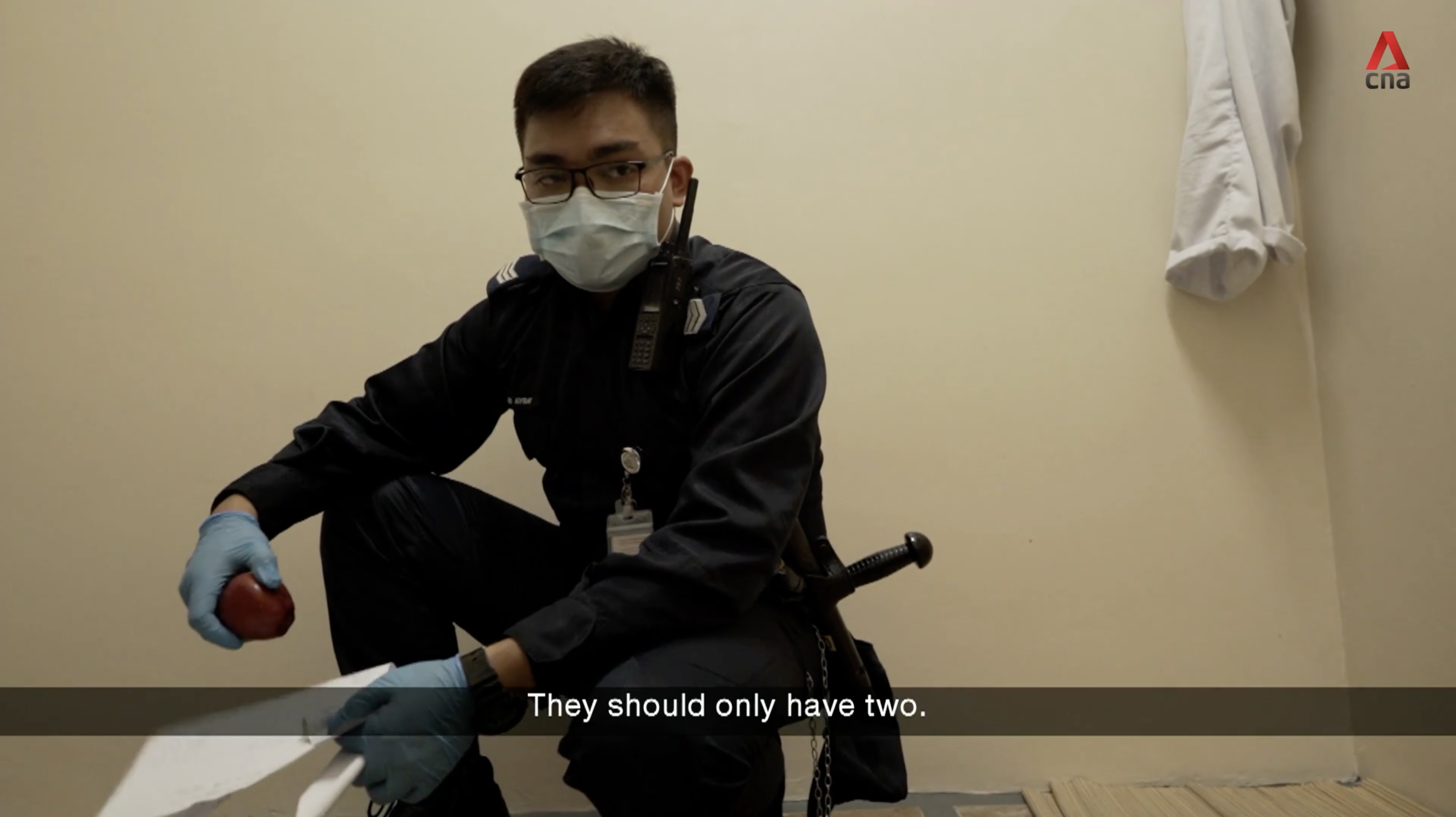 Image screenshot from CNA video.
Image screenshot from CNA video.
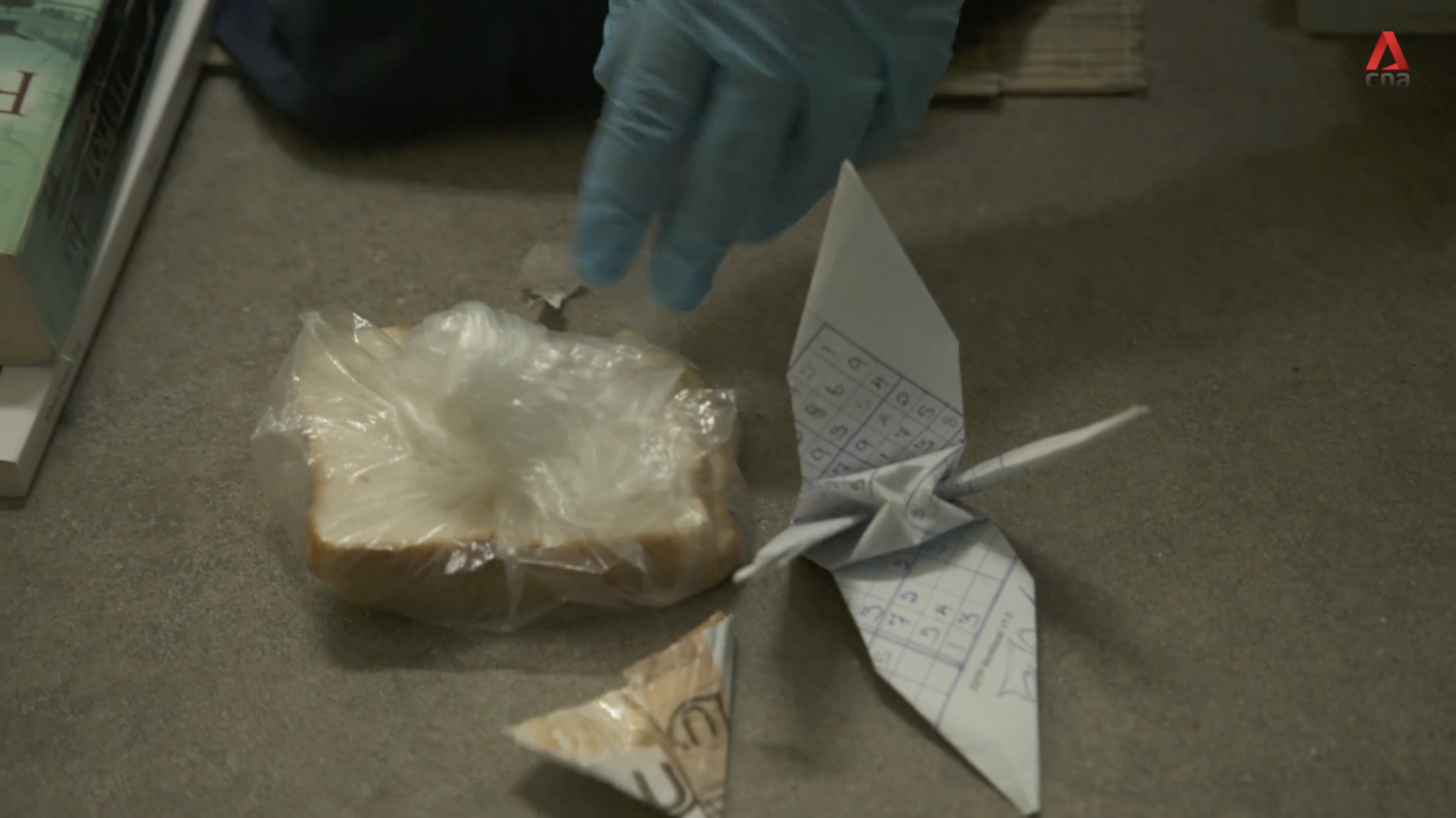 Image screenshot from CNA video.
Image screenshot from CNA video.
Holding on to extra paper to write or draw is a no-no. Guards do not want inmates to transmit messages amongst themselves or across the institution.
It was revealed that contraband are still smuggled to inmates as they can be transported and hidden in the daily ration of food prepared by fellow inmates.
Daily cell layout
Besides the cell searches, there is a daily muster check before breakfast.
During the muster check, the cell has to be organised in an order specific to the one seen on the daily cell layout sheet.
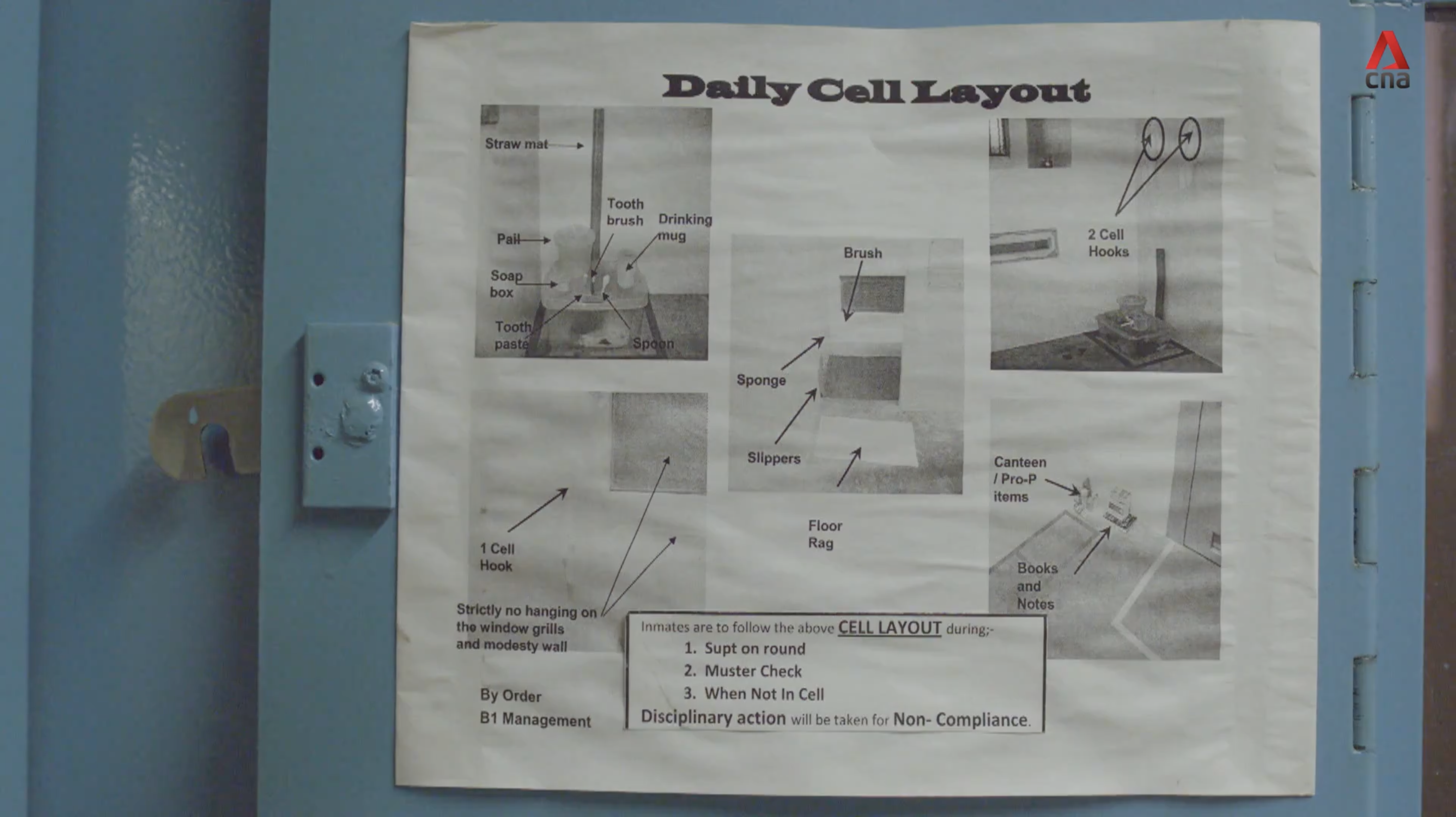 Image screenshot from CNA video.
Image screenshot from CNA video.
Cell doors have two apertures and one viewing panel
The muster check is conducted through the viewing panel – sort of like a window at eye level – with round holes in the door to allow for two-way verbal communication.
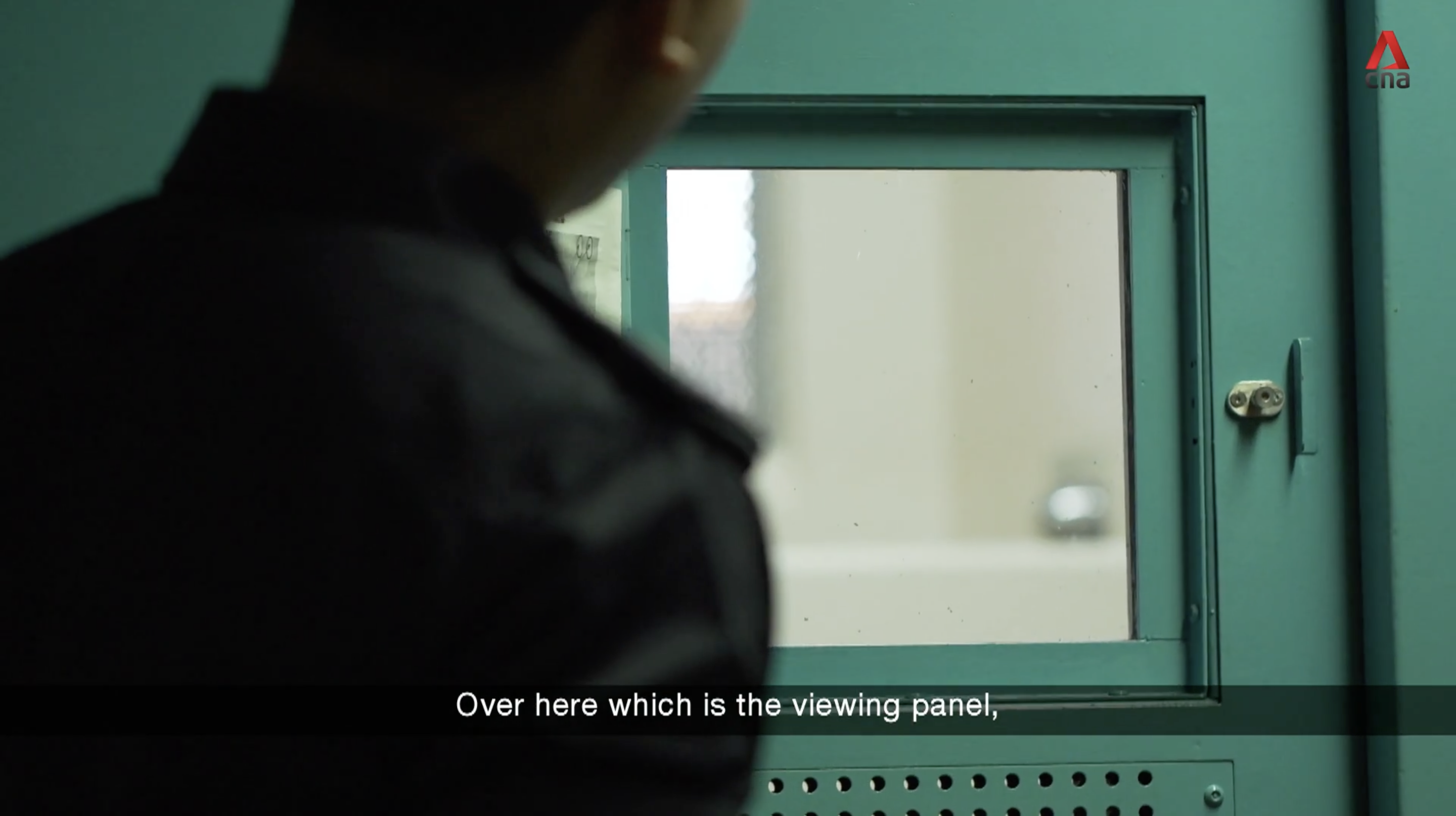 Image screenshot from CNA video.
Image screenshot from CNA video.
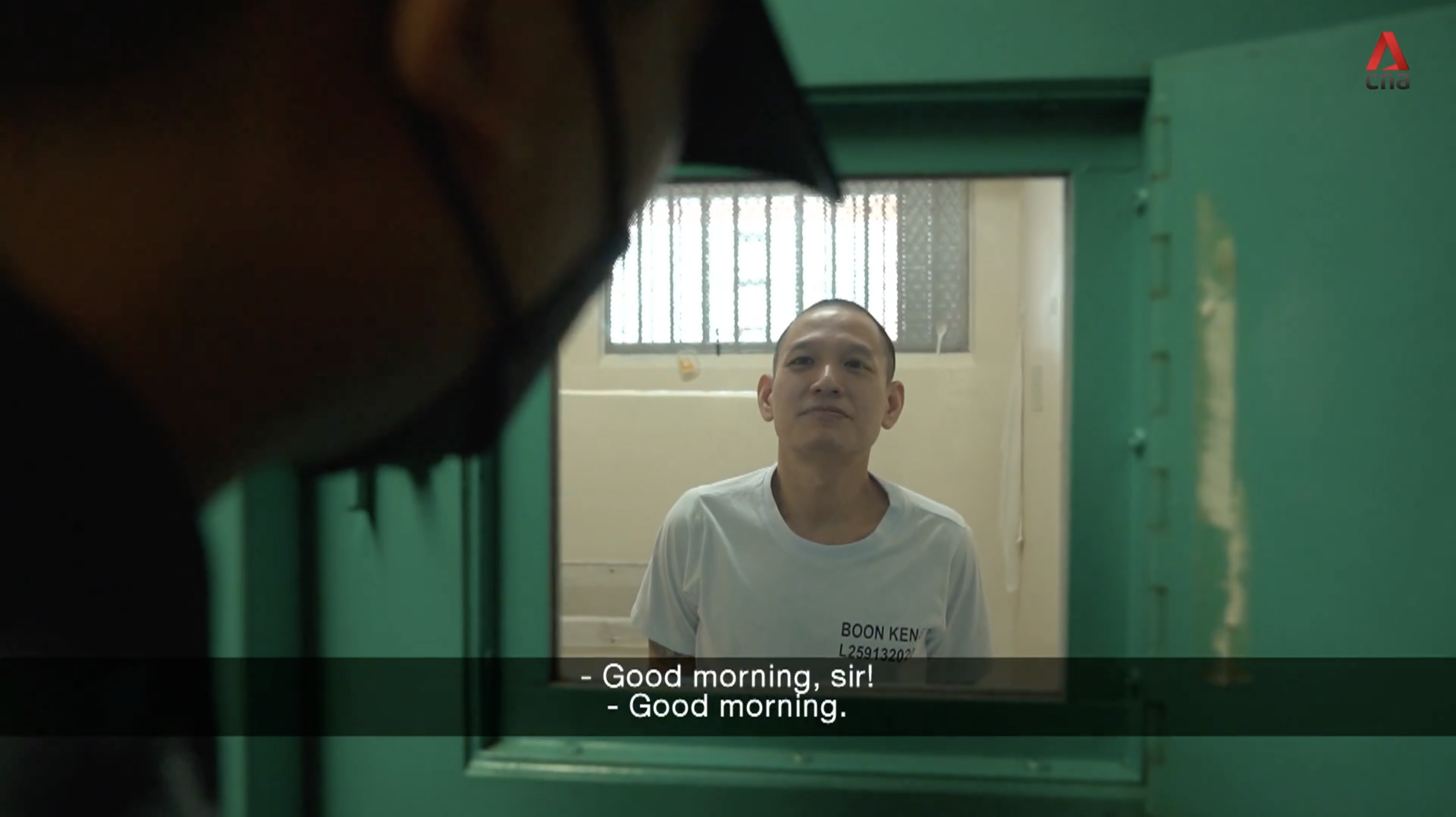 Image screenshot from CNA video.
Image screenshot from CNA video.
Besides the viewing panel, the cell door has two apertures, or small doors.
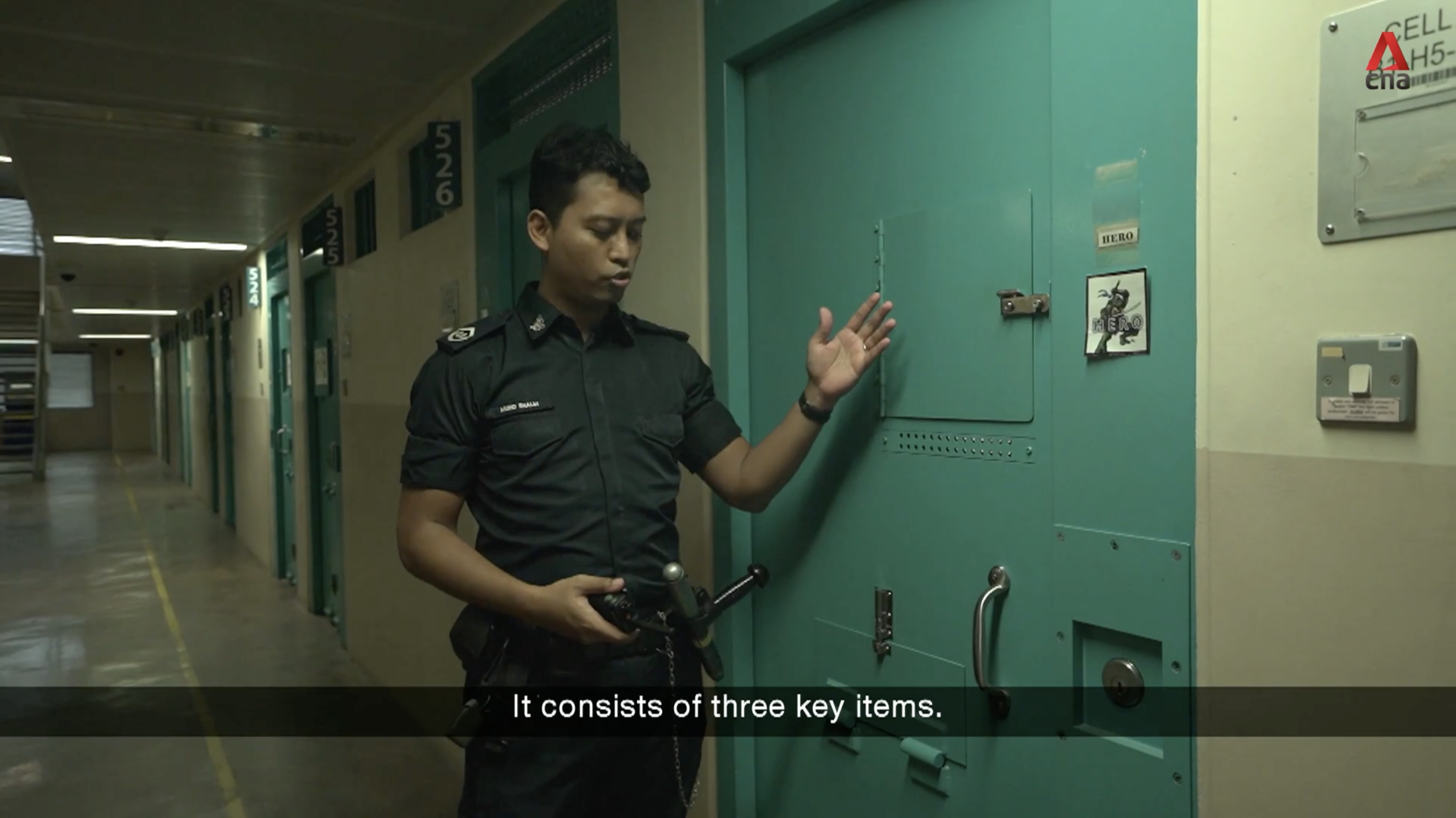 Image screenshot from CNA video.
Image screenshot from CNA video.
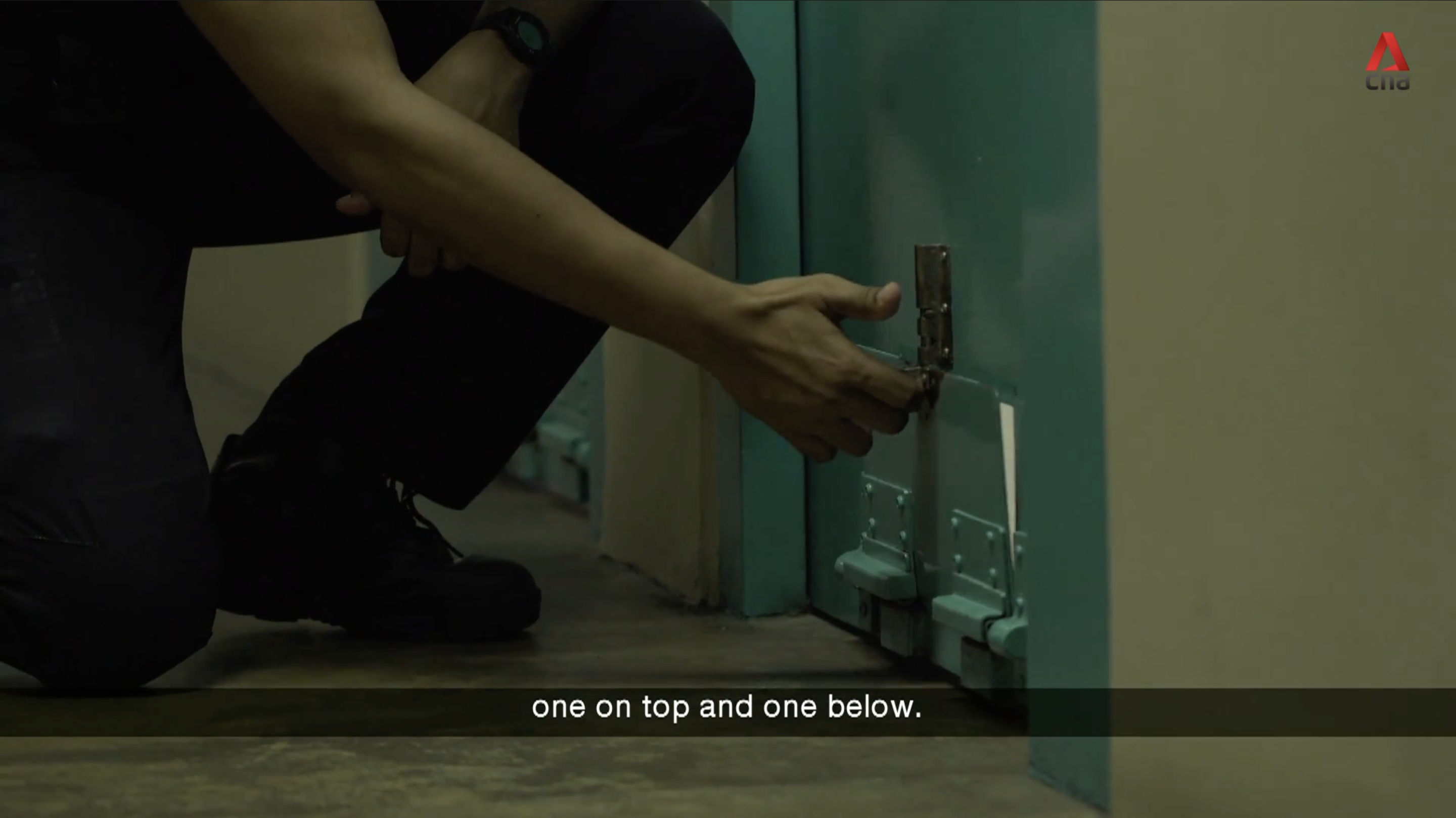 Image screenshot from CNA video.
Image screenshot from CNA video.
Guards are wary of getting too close to the doors as inmates can grab their weapons.
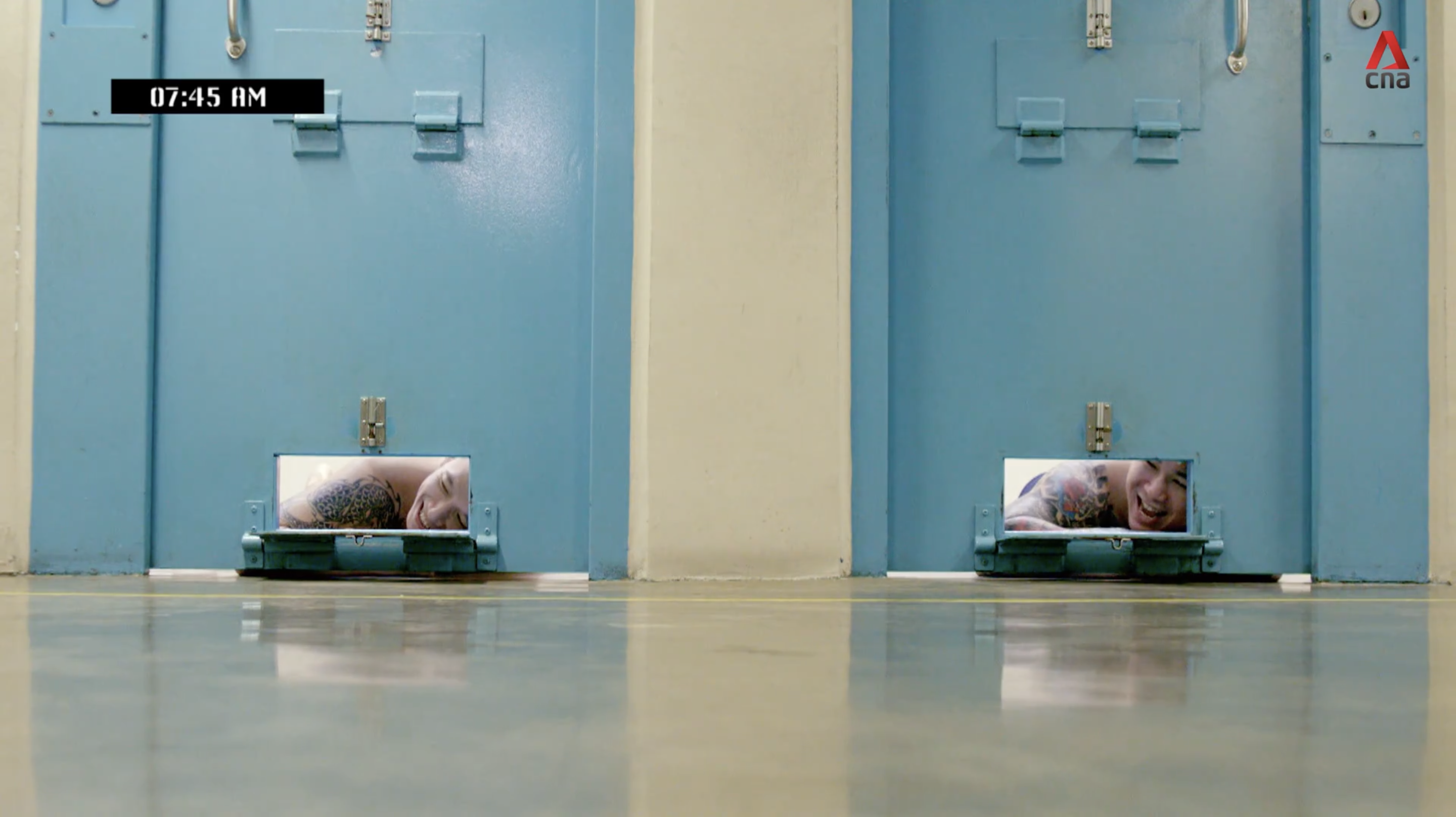 Image screenshot from CNA video.
Image screenshot from CNA video.
One of the apertures is at the ground level and is the food ledge, or where the inmates receive their daily meals.
One inmate remarked that he feels like a "pet" being fed during meal times.
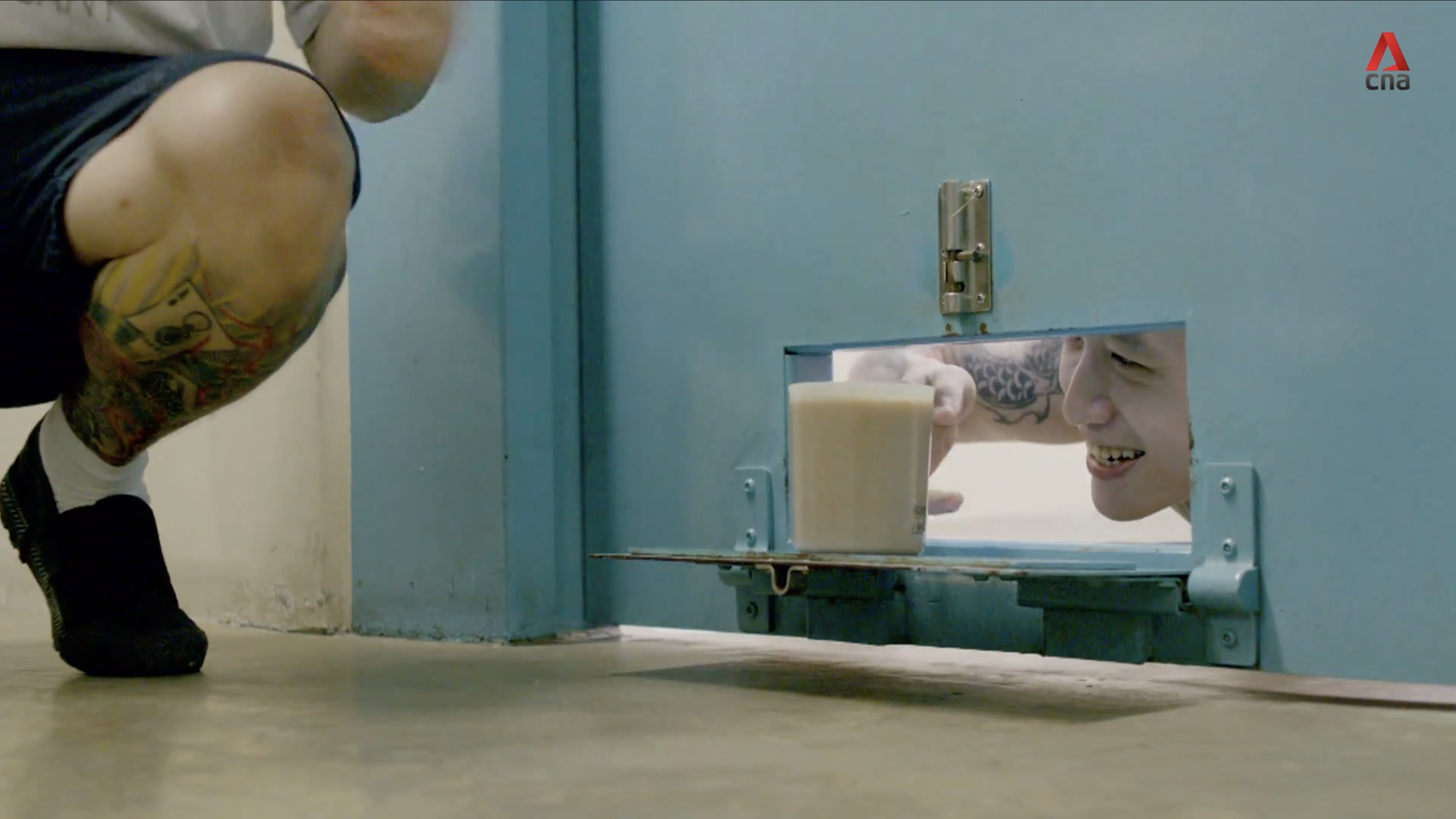 Image screenshot from CNA video.
Image screenshot from CNA video.
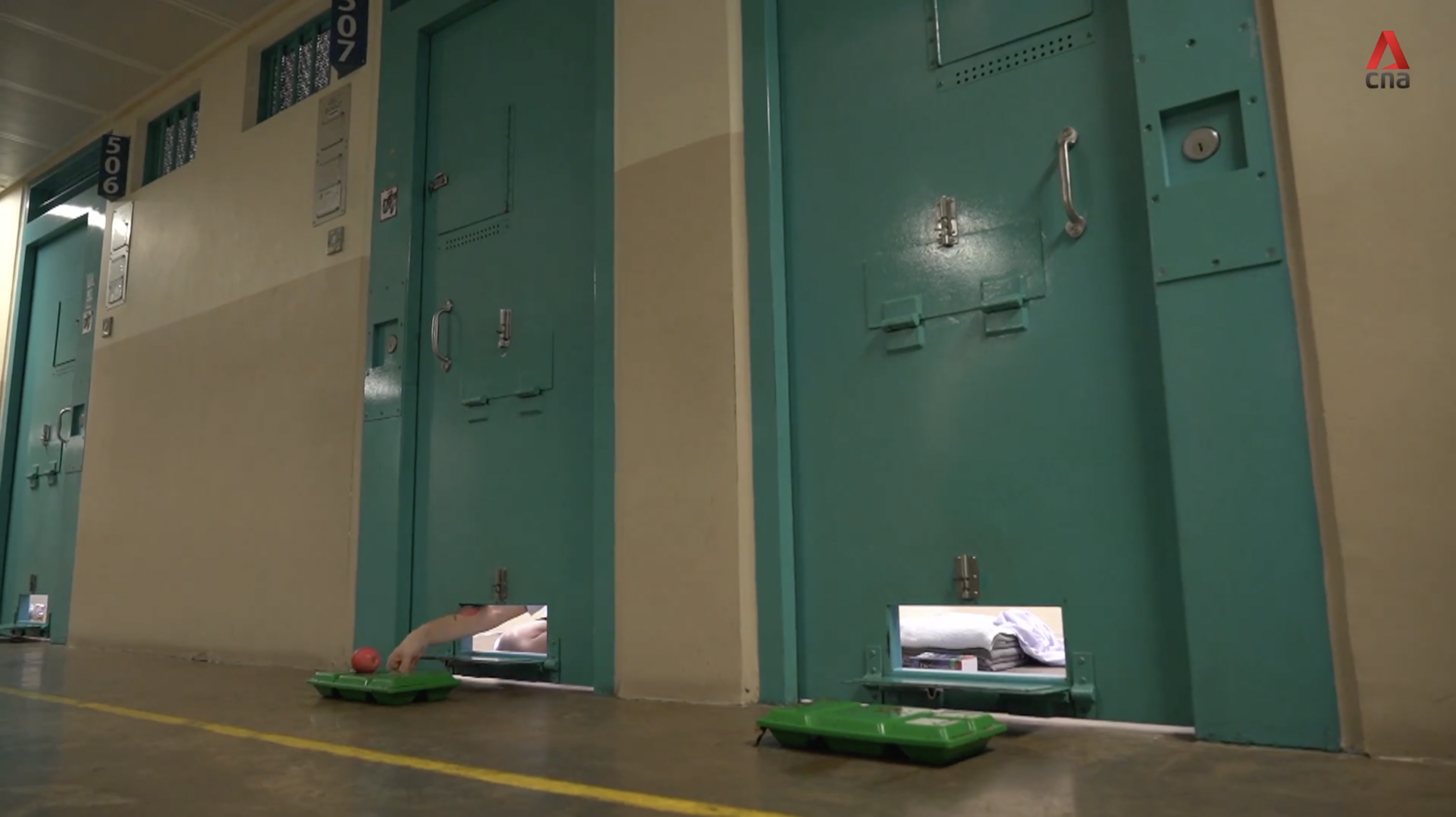 Image screenshot from CNA video.
Image screenshot from CNA video.
Cell monitored by 24-hour CCTV
The cells are watched round the clock.
All activities are monitored, including one's daily business.
One inmate said he still takes off all his clothes in the cell to rest as it can get unbearably hot at times.
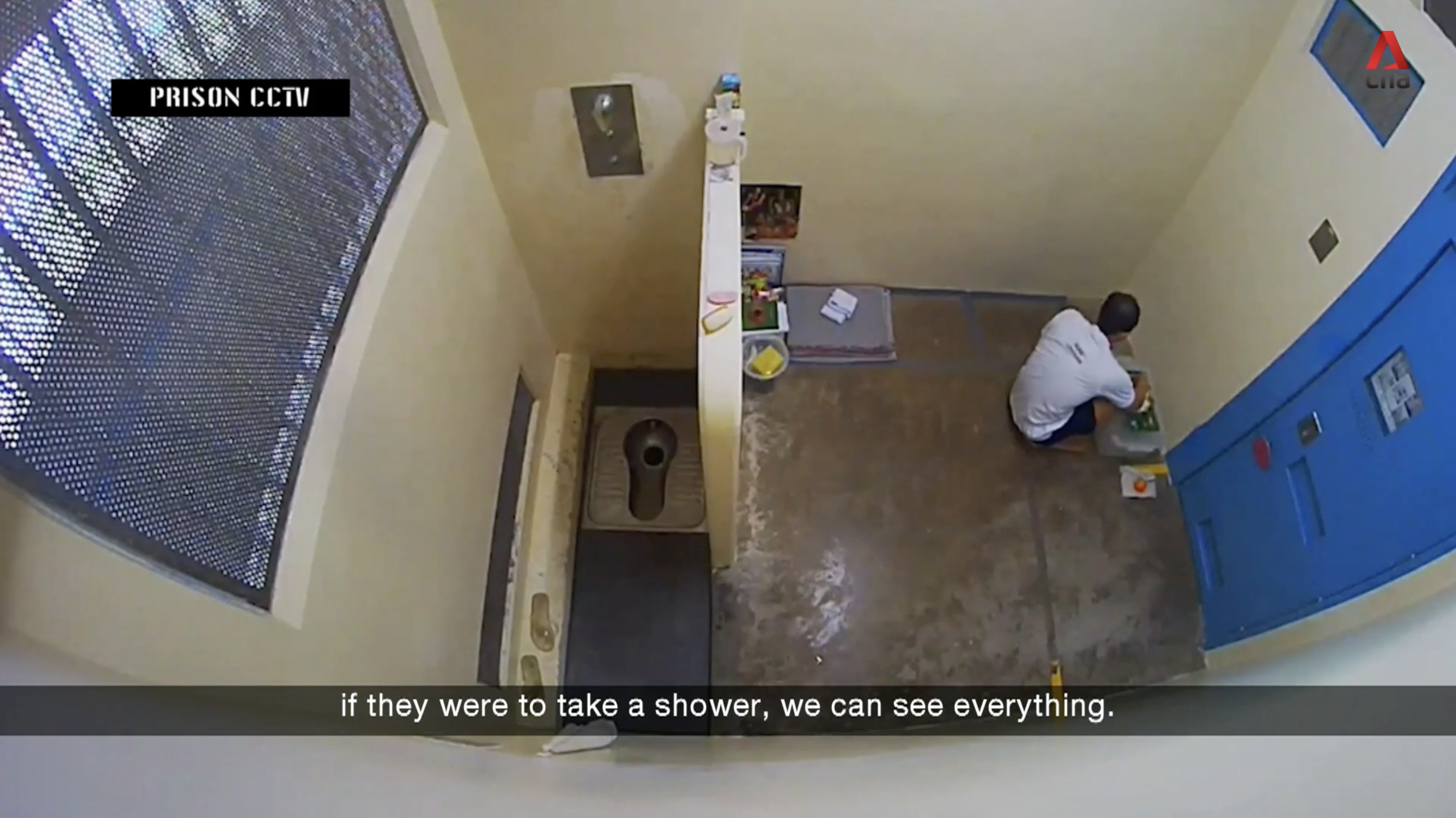 Image screenshot from CNA video.
Image screenshot from CNA video.
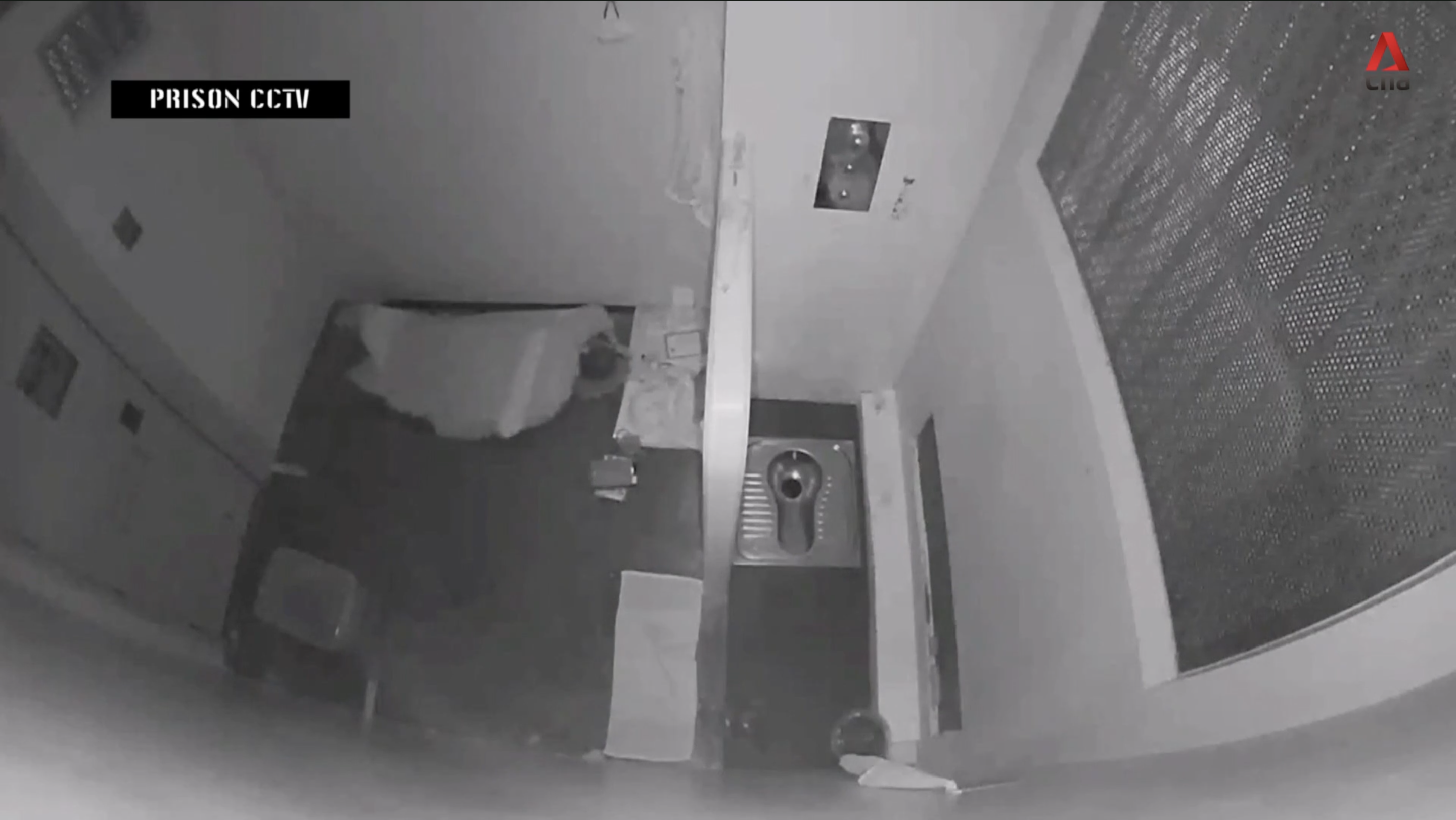 Image screenshot from CNA video.
Image screenshot from CNA video.
Daily life of an inmate
Lights go on at 6am
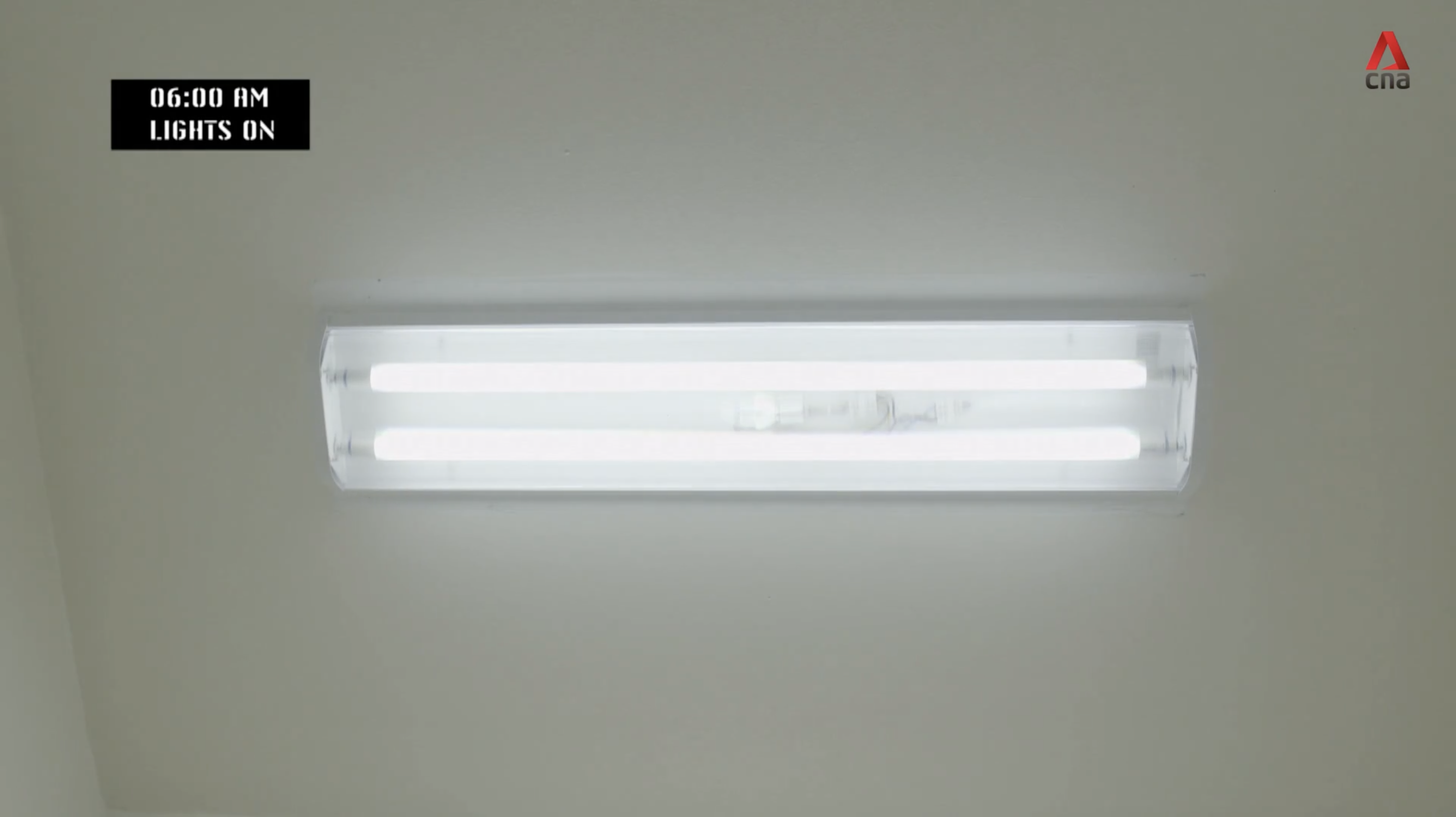 Image screenshot from CNA video.
Image screenshot from CNA video.
Daily mindfulness session at 7am
Music will be played for 15 minutes each day in the morning, as research showed it has a calming effect on the inmates.
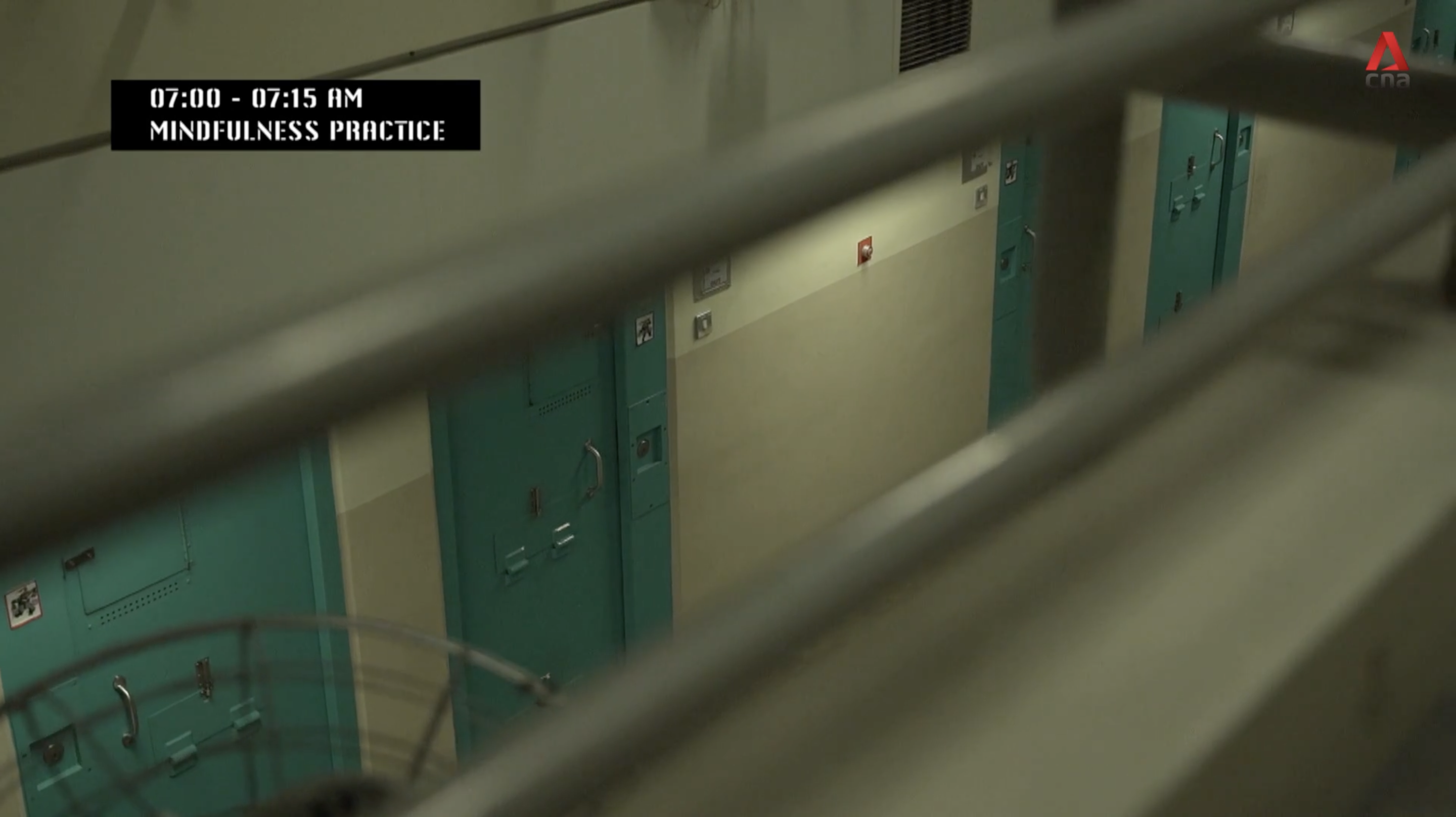 Image screenshot from CNA video.
Image screenshot from CNA video.
Muster check
A prison warden will go from cell to cell to ensure the headcount is in order, and that the cell mates are well and able to respond.
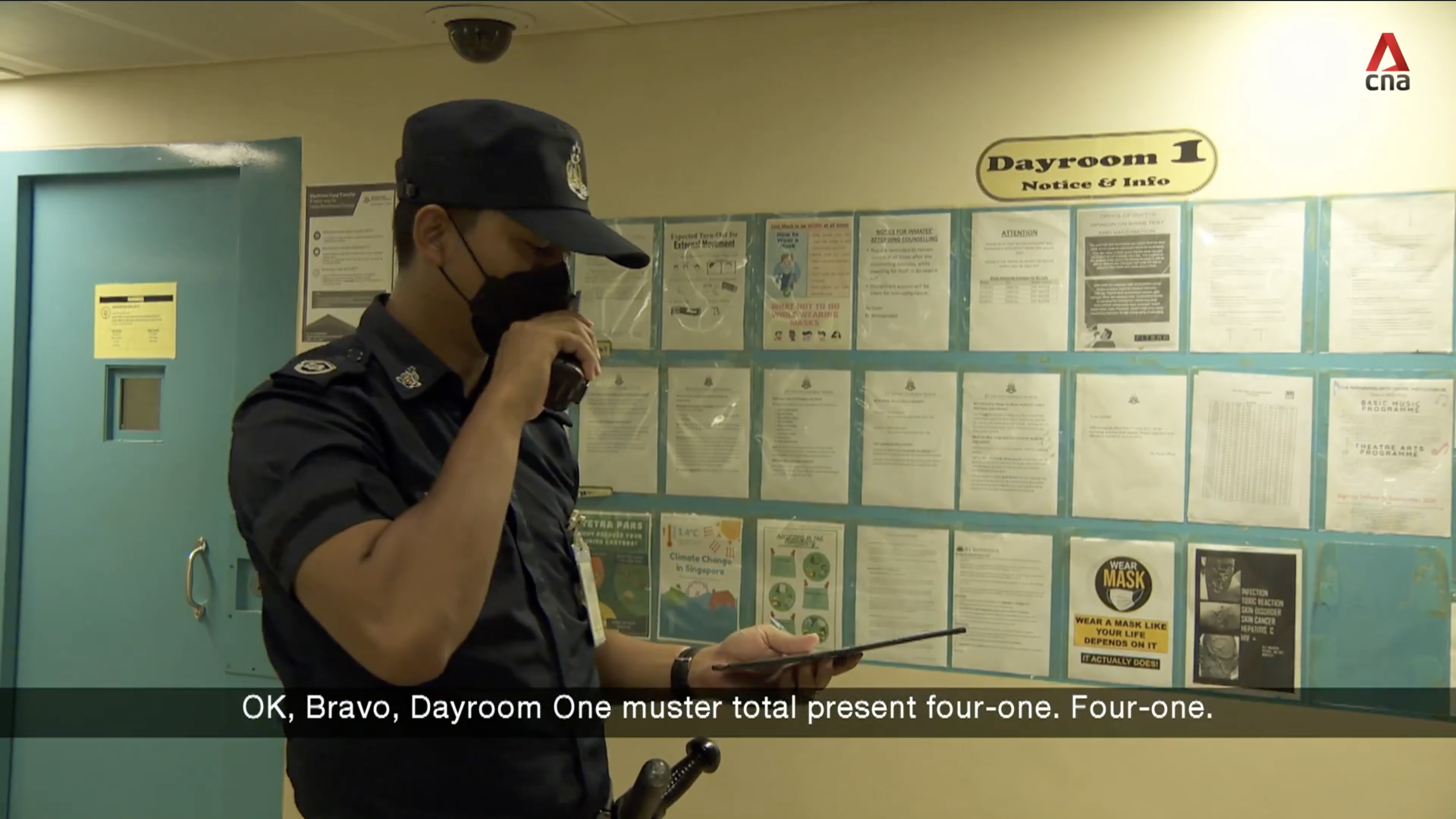 Image screenshot from CNA video.
Image screenshot from CNA video.
Besides maintaining the cell layout, inmates have to stand by the viewing panel to greet the prison officers with their shirts tucked in during the muster check.
This is also to enforce discipline and for authority to be asserted.
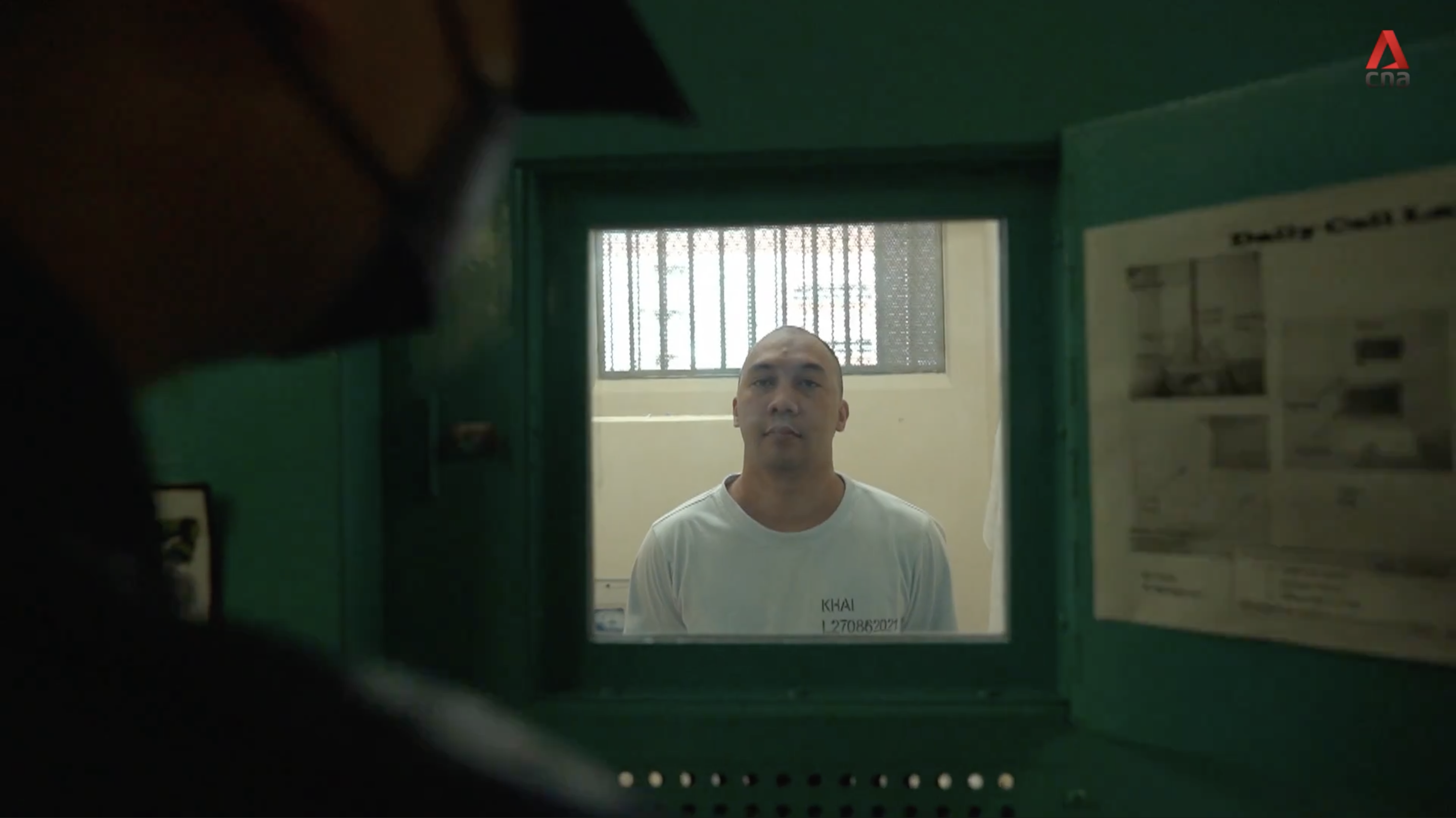 Image screenshot from CNA video.
Image screenshot from CNA video.
10-minute grooming and shaving session
Grooming and shaving tools are dispensed to the inmates for them to groom themselves in their cells.
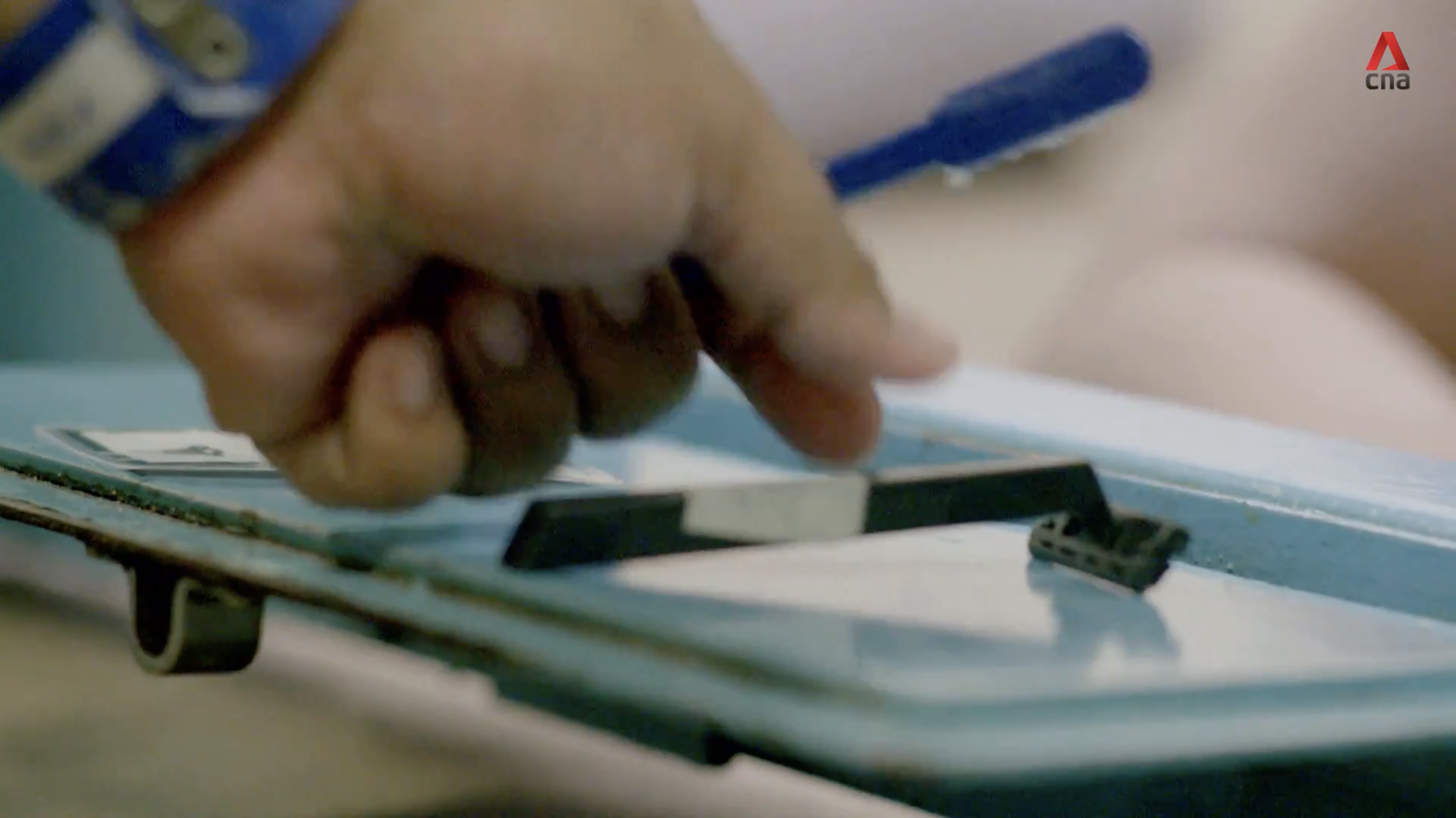 Image screenshot from CNA video.
Image screenshot from CNA video.
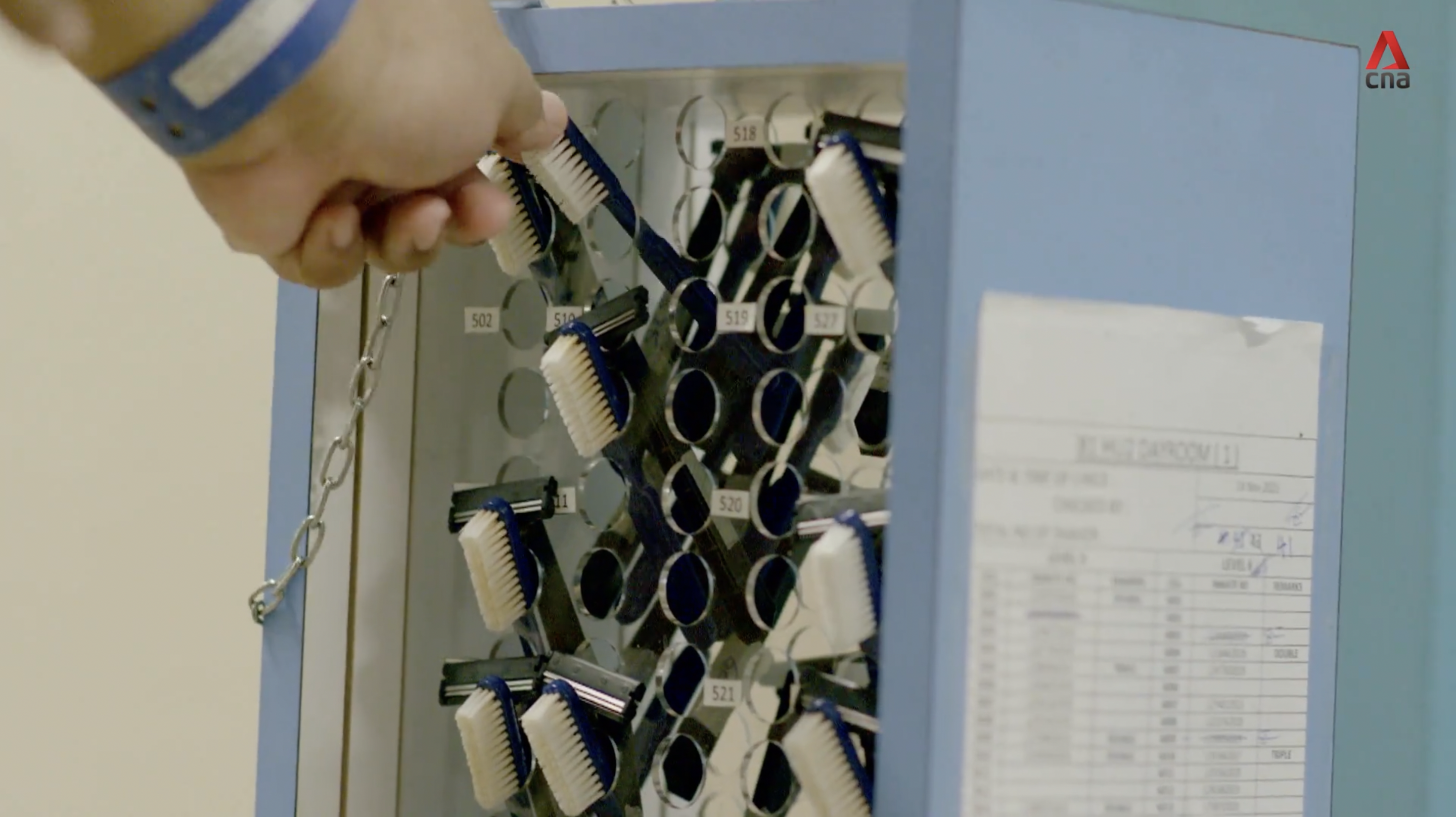 Image screenshot from CNA video.
Image screenshot from CNA video.
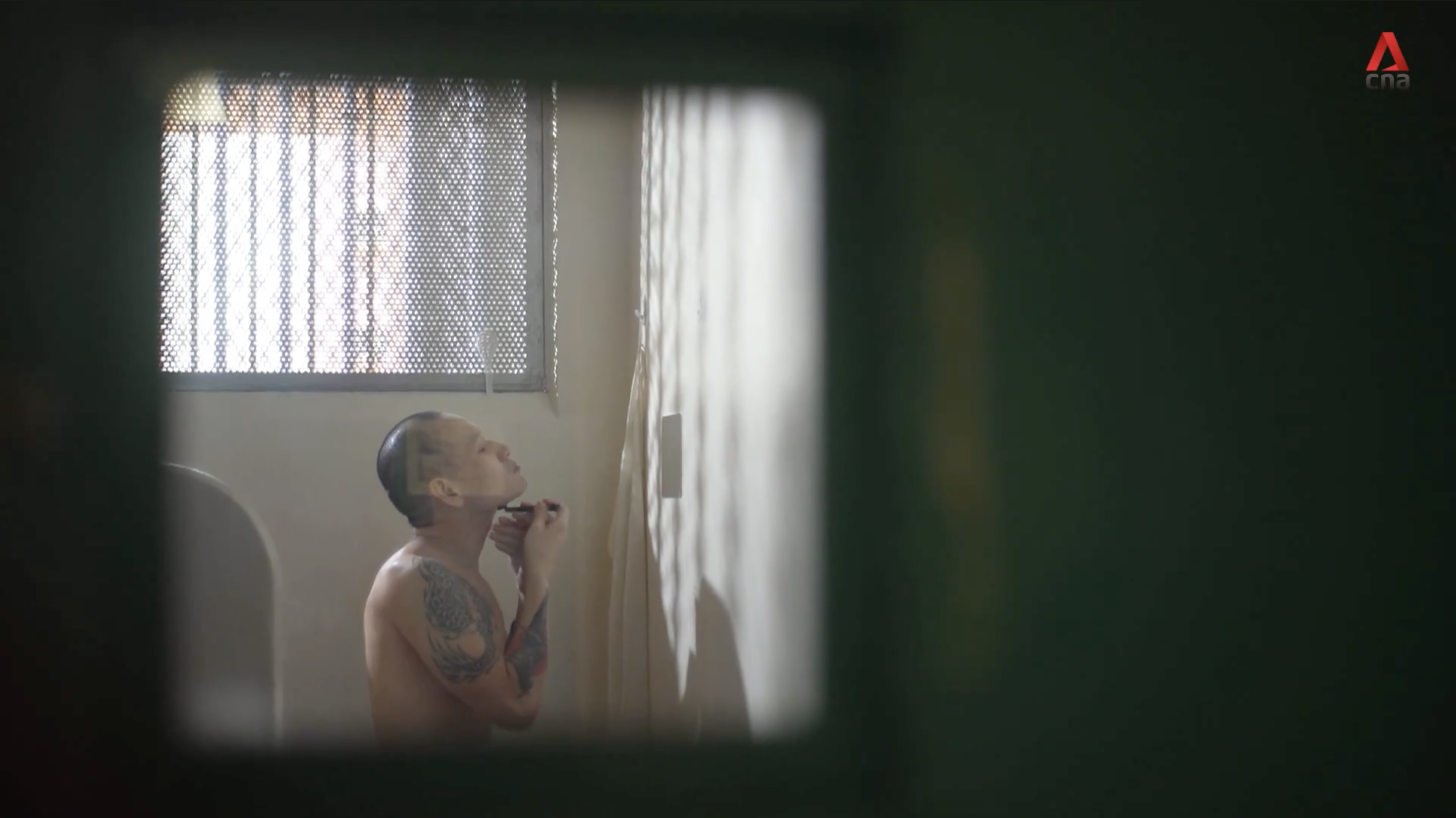 Image screenshot from CNA video.
Image screenshot from CNA video.
Breakfast at 7:45am
Breakfast consists of four slices of bread, along with a full cup of tea or coffee.
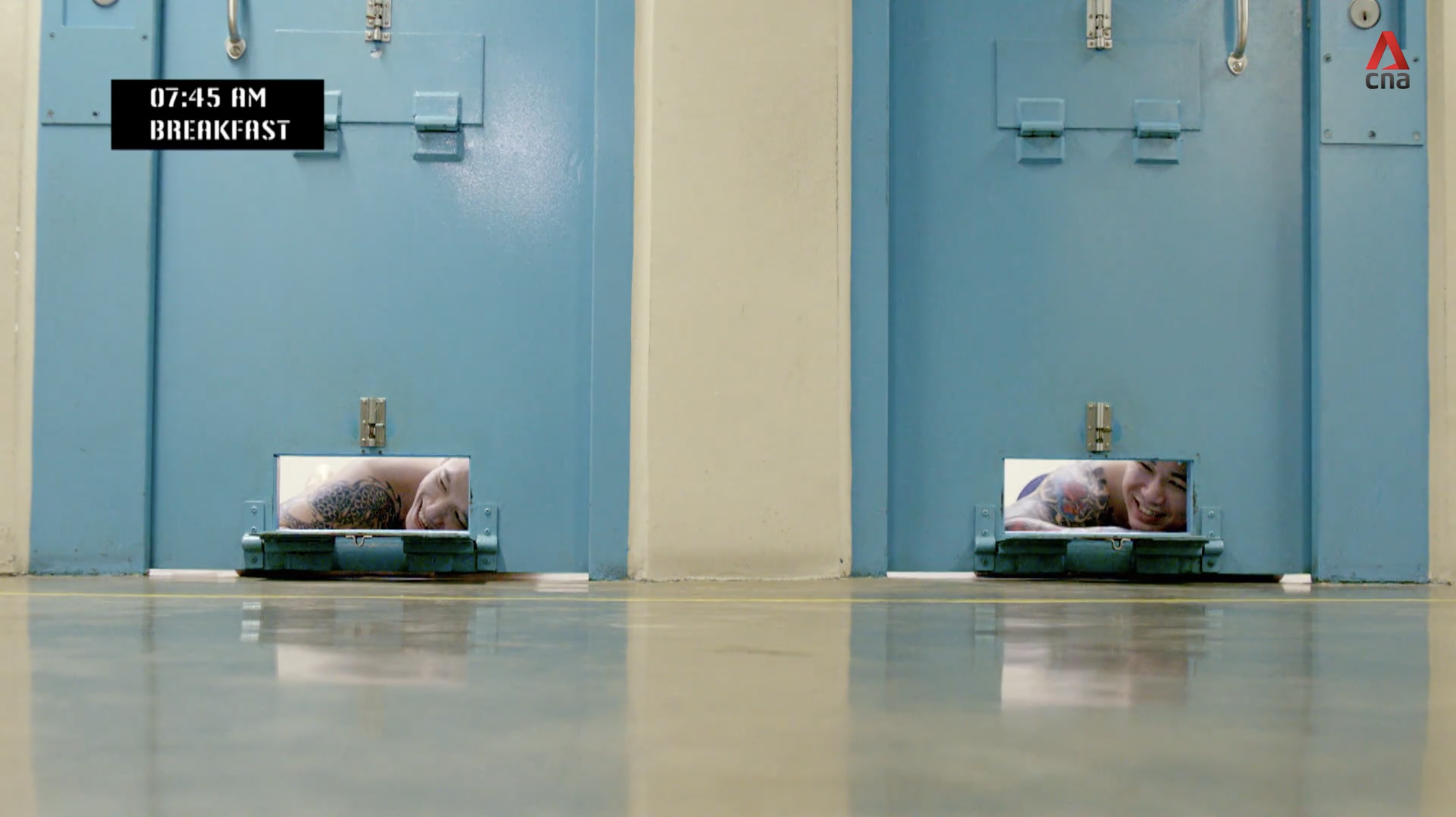 Image screenshot from CNA video.
Image screenshot from CNA video.
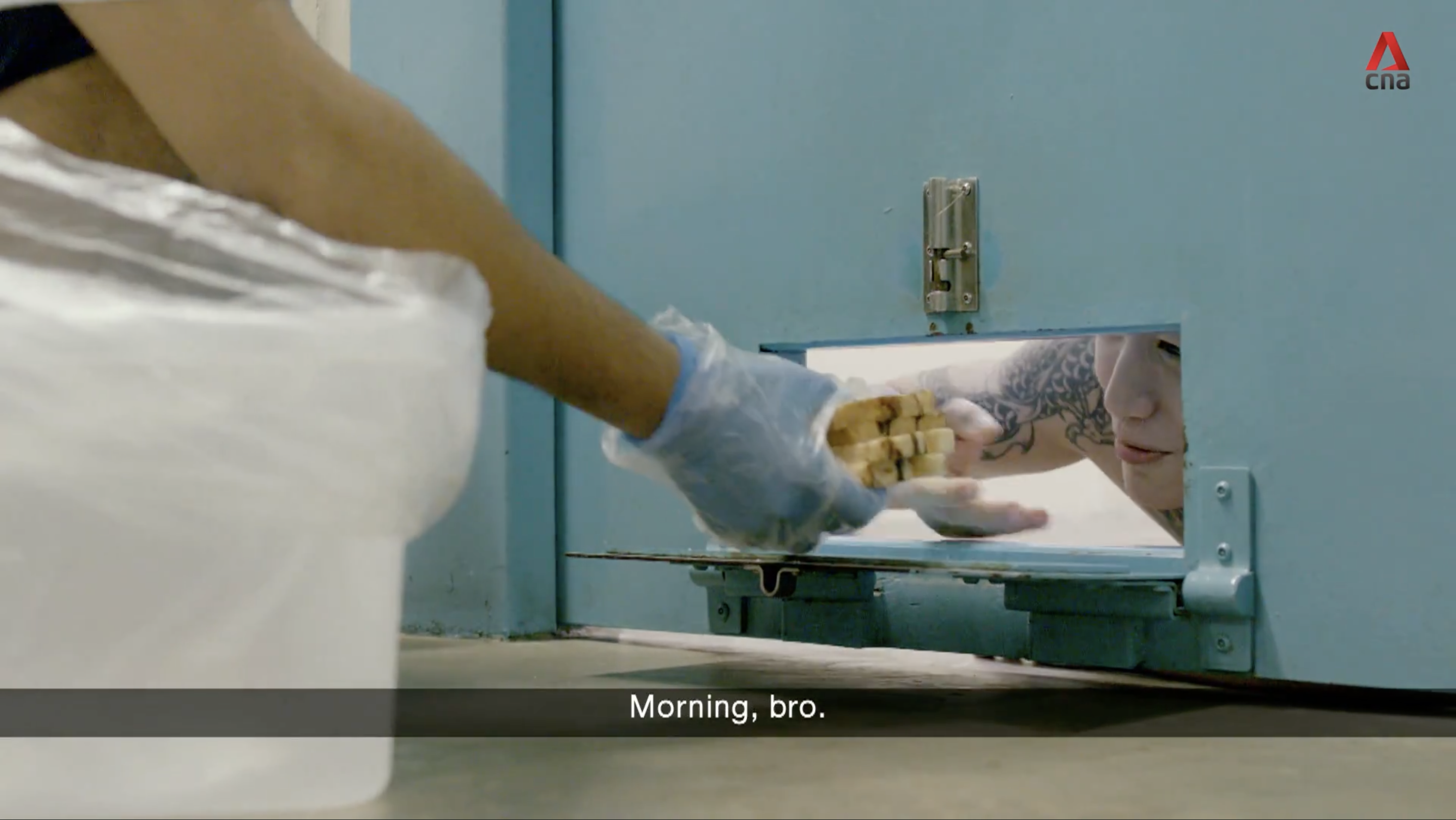 Image screenshot from CNA video.
Image screenshot from CNA video.
Meals at Changi Prison Complex
Changi Prison Complex serves food -- cooked by fellow inmates who are compensated with a stipend for working in prison -- that caters up to eight dietary requirements.
These meals include: Normal, no meat, soft diet, off chilli, low-purine, and low sugar.
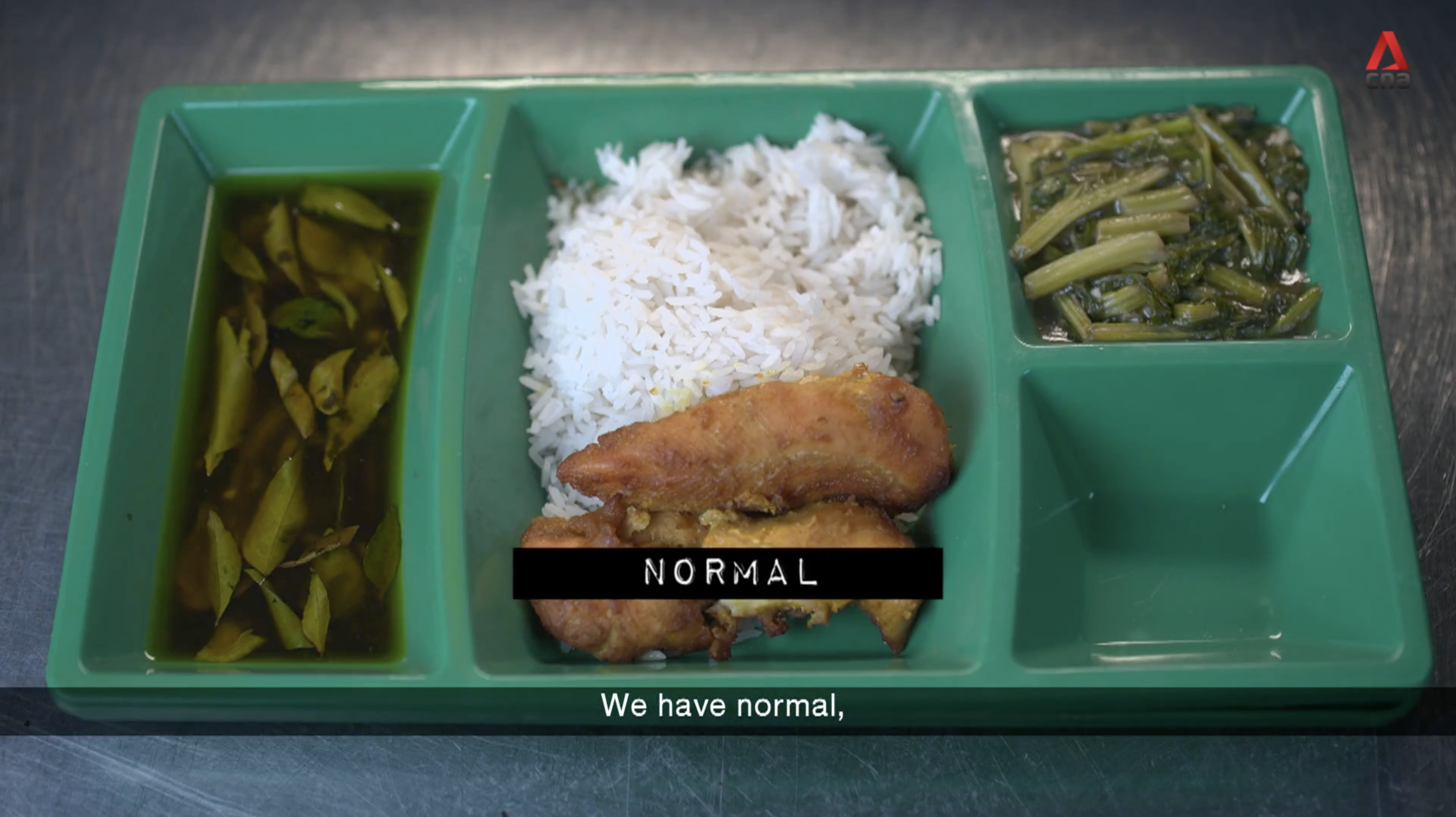 Image screenshot from CNA video.
Image screenshot from CNA video.
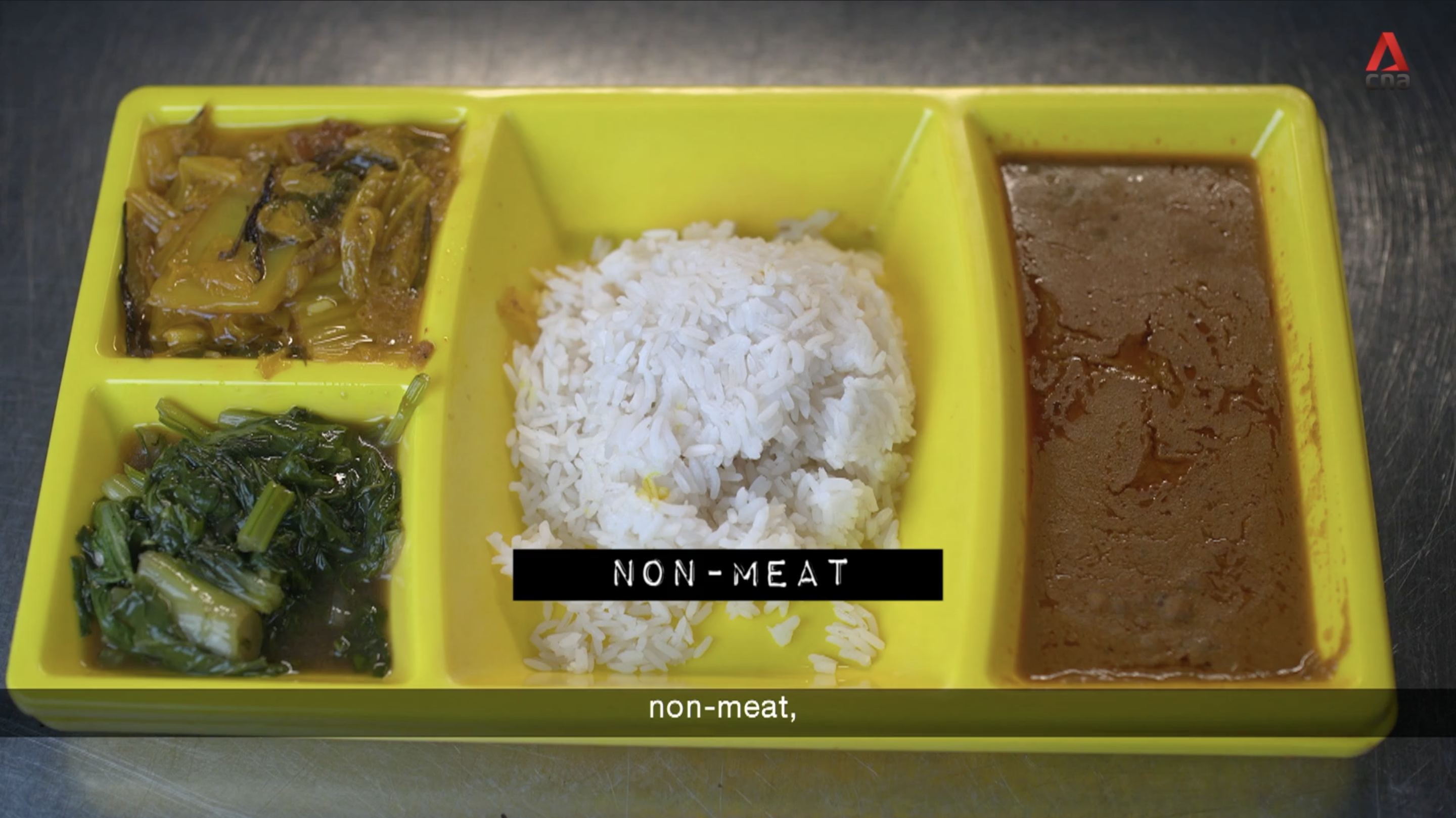 Image screenshot from CNA video.
Image screenshot from CNA video.
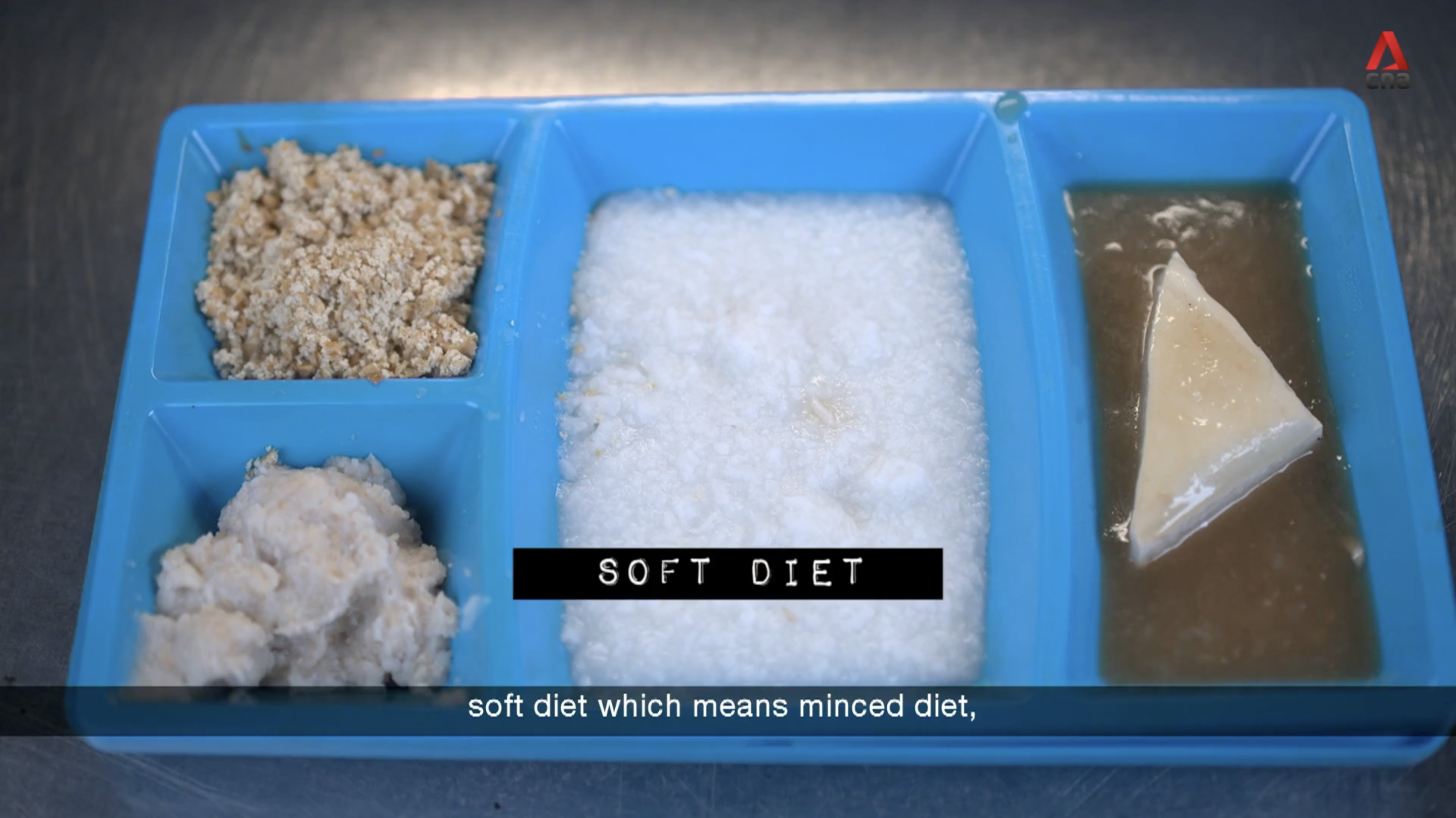 Image screenshot from CNA video.
Image screenshot from CNA video.
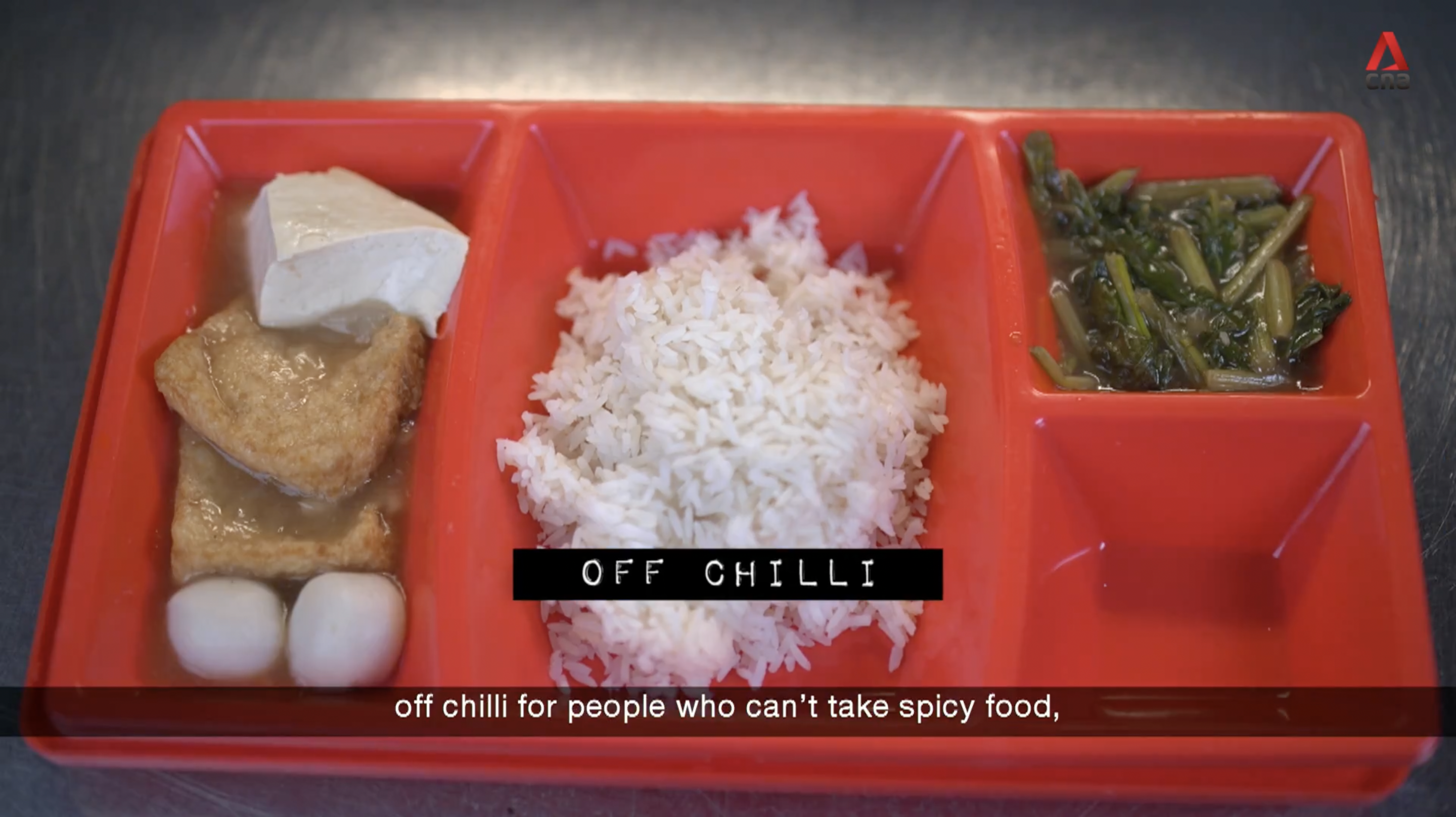 Image screenshot from CNA video.
Image screenshot from CNA video.
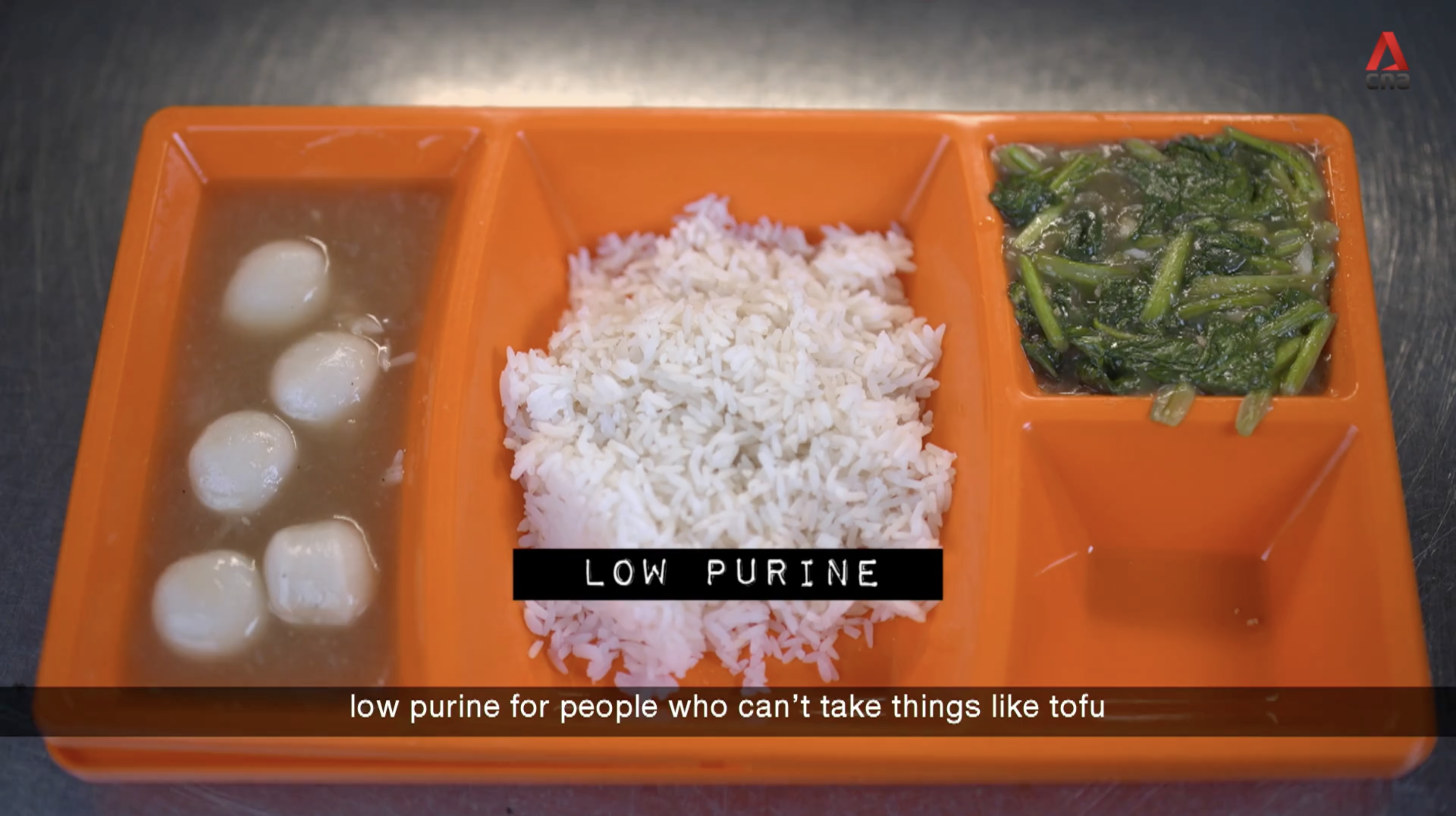 Image screenshot from CNA video.
Image screenshot from CNA video.
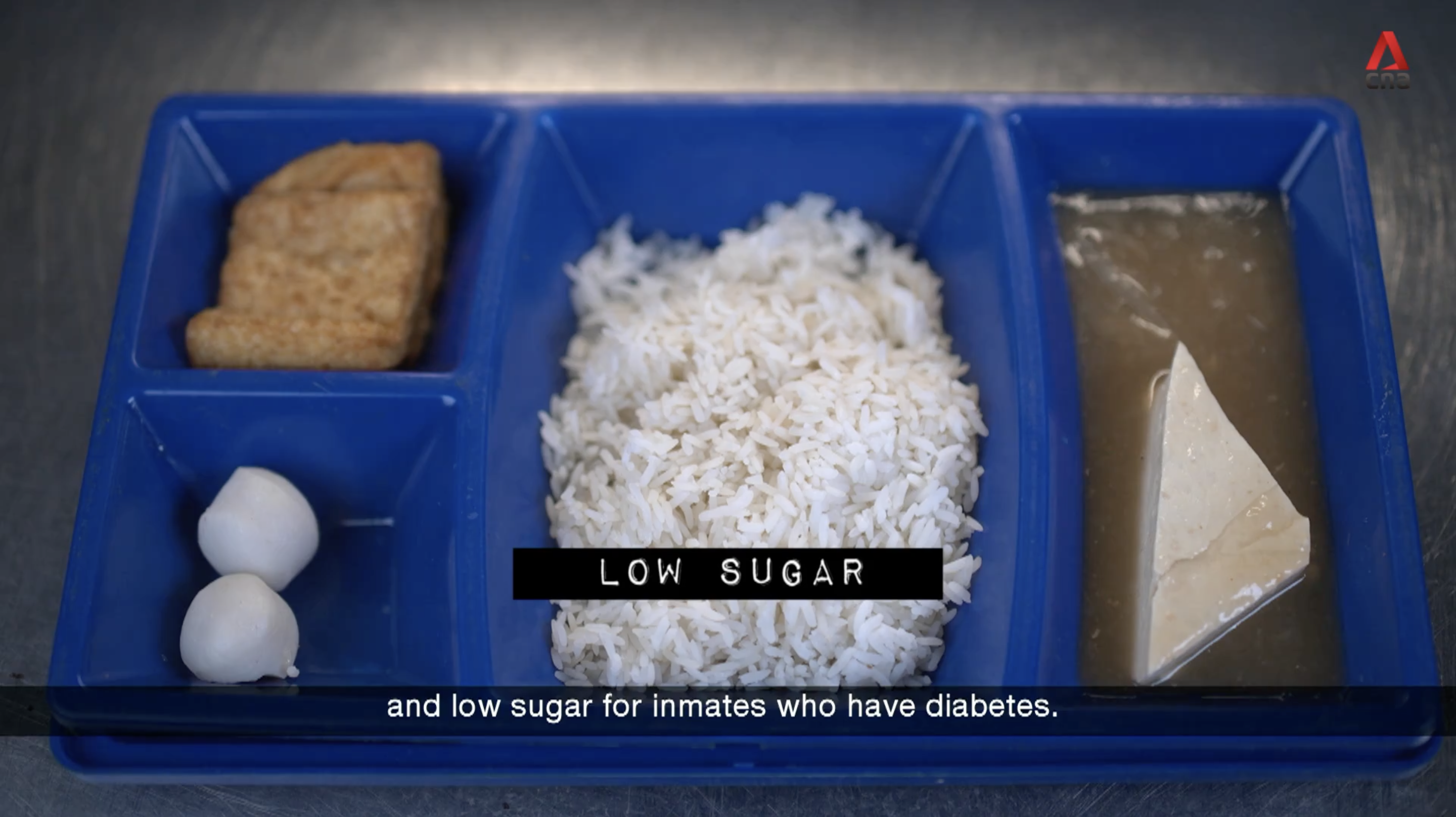 Image screenshot from CNA video.
Image screenshot from CNA video.
These meals are prepared by inmates with the guidance of chefs from Singapore Airport Terminal Services.
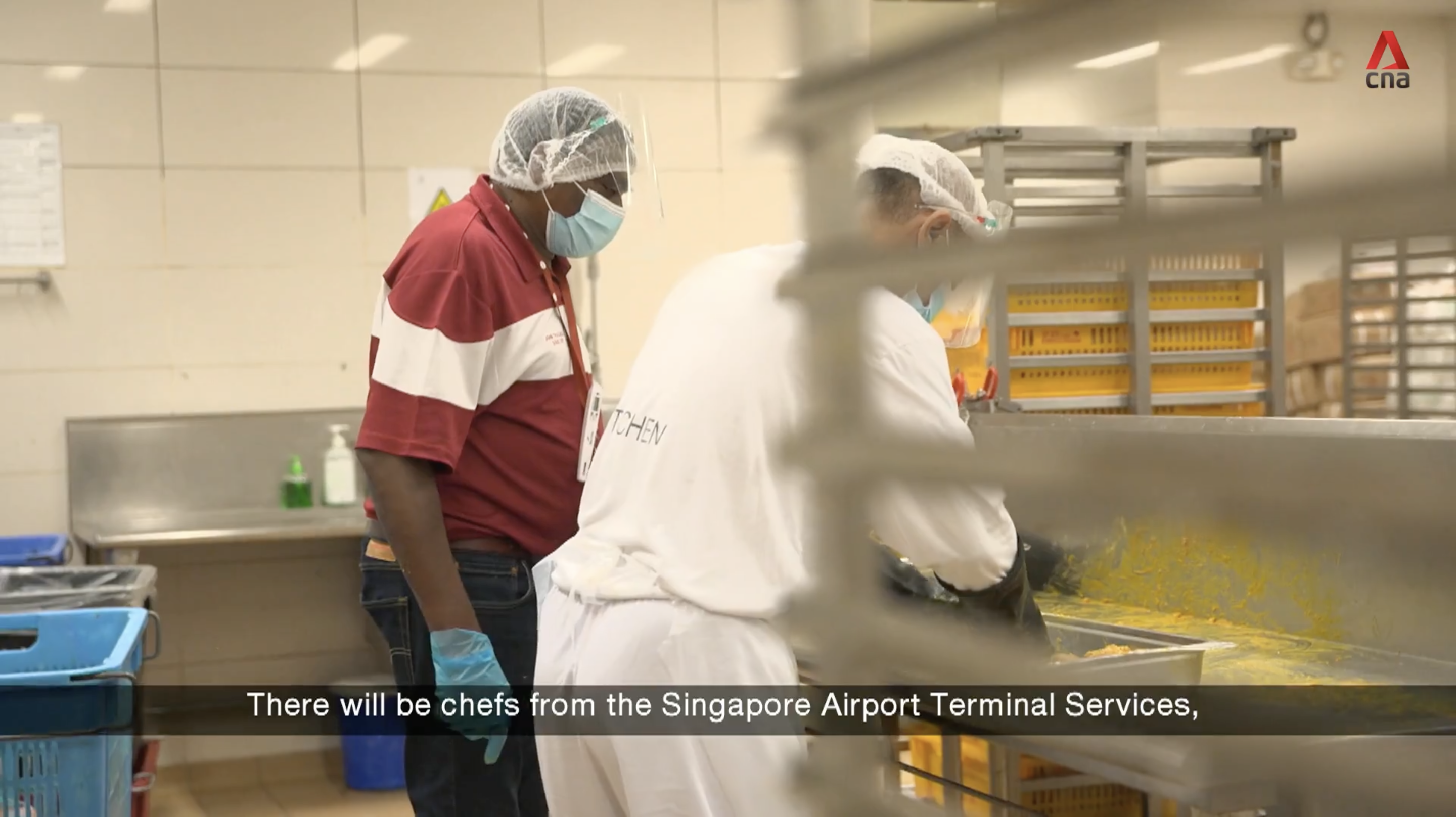 Image screenshot from CNA video.
Image screenshot from CNA video.
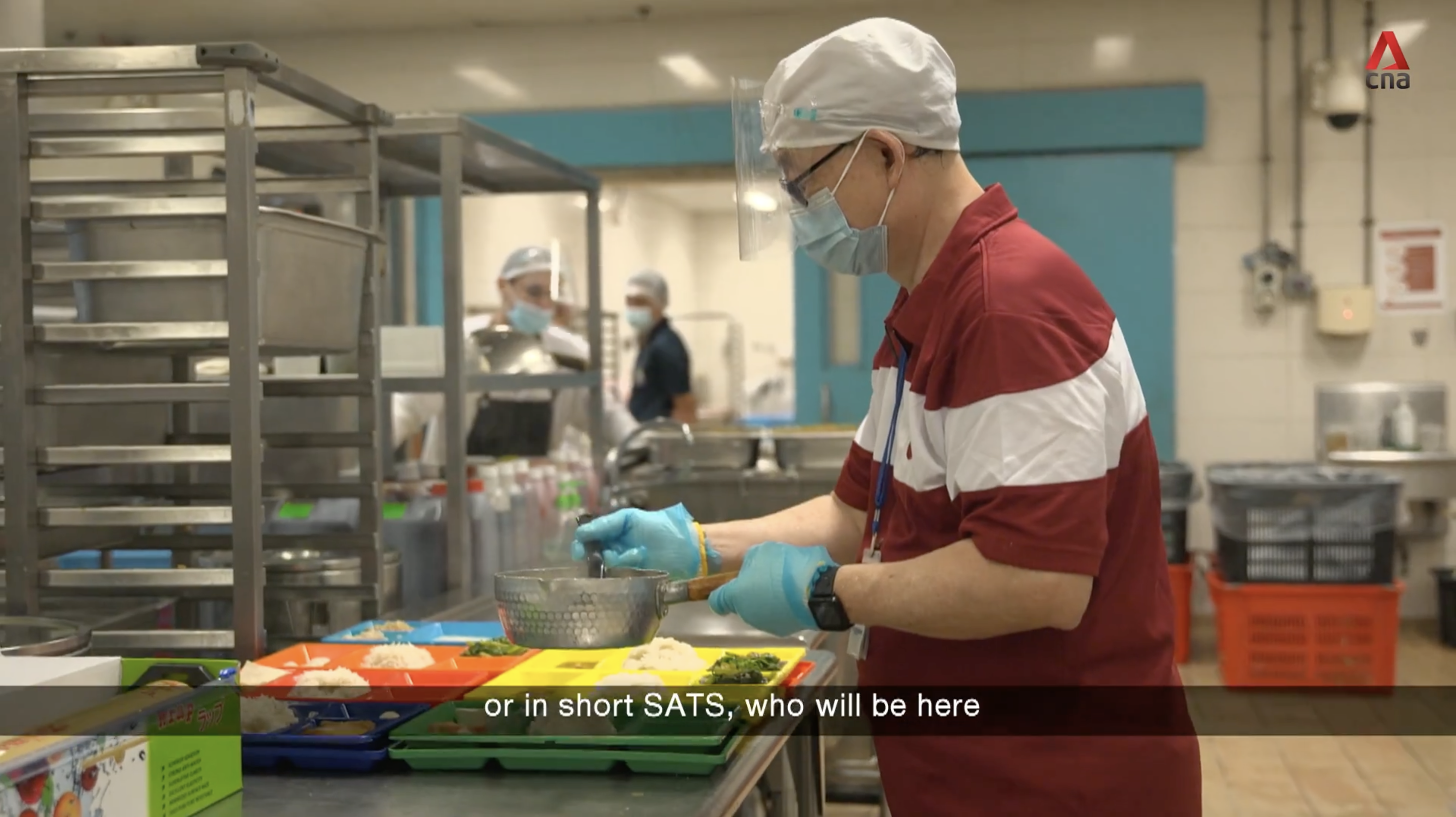 Image screenshot from CNA video.
Image screenshot from CNA video.
Lunch at 11:30am
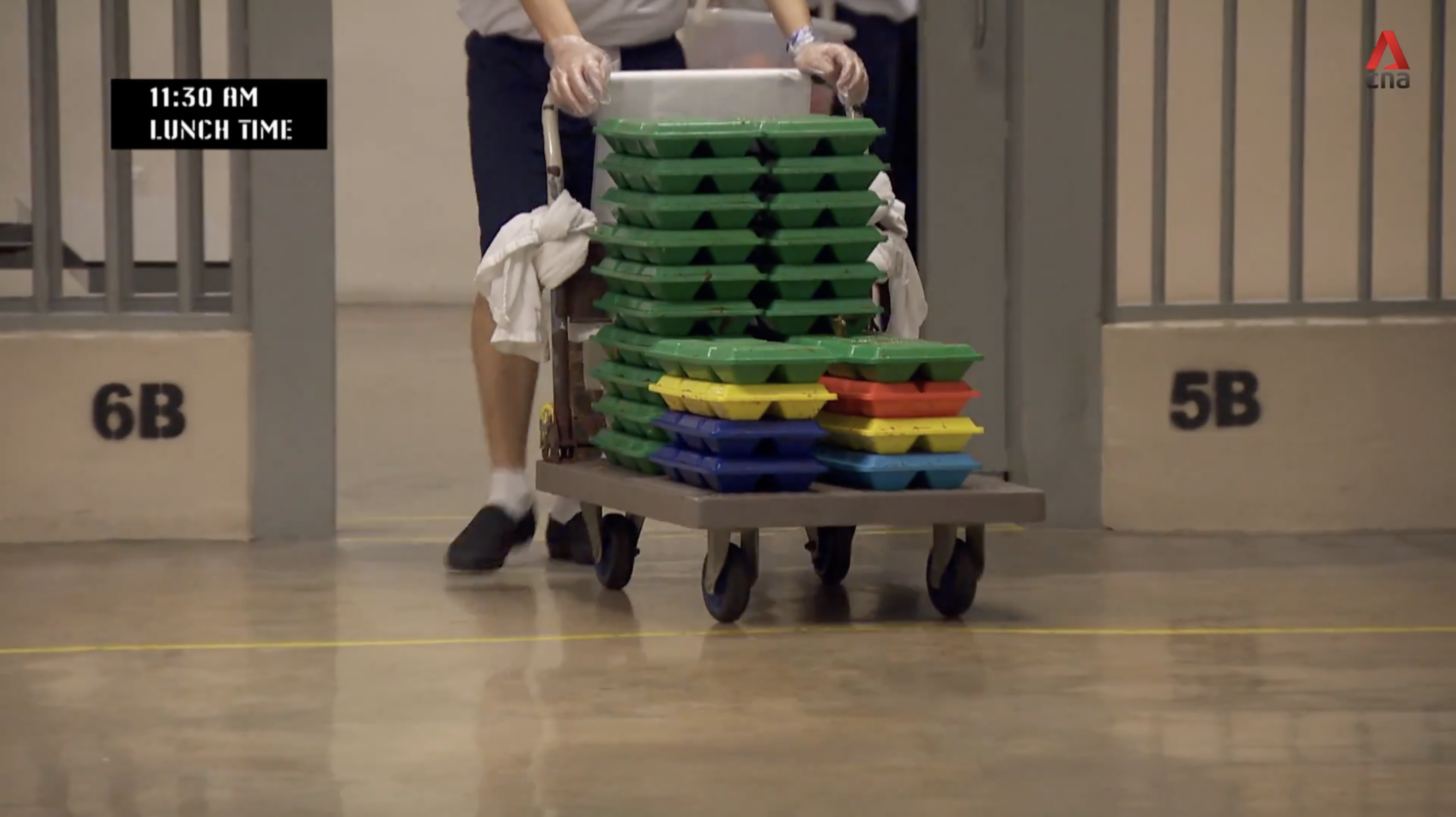 Image screenshot from CNA video.
Image screenshot from CNA video.
Lunch on Wednesdays typically consists of some sort of noodles. Meat will typically be reserved for dinners.
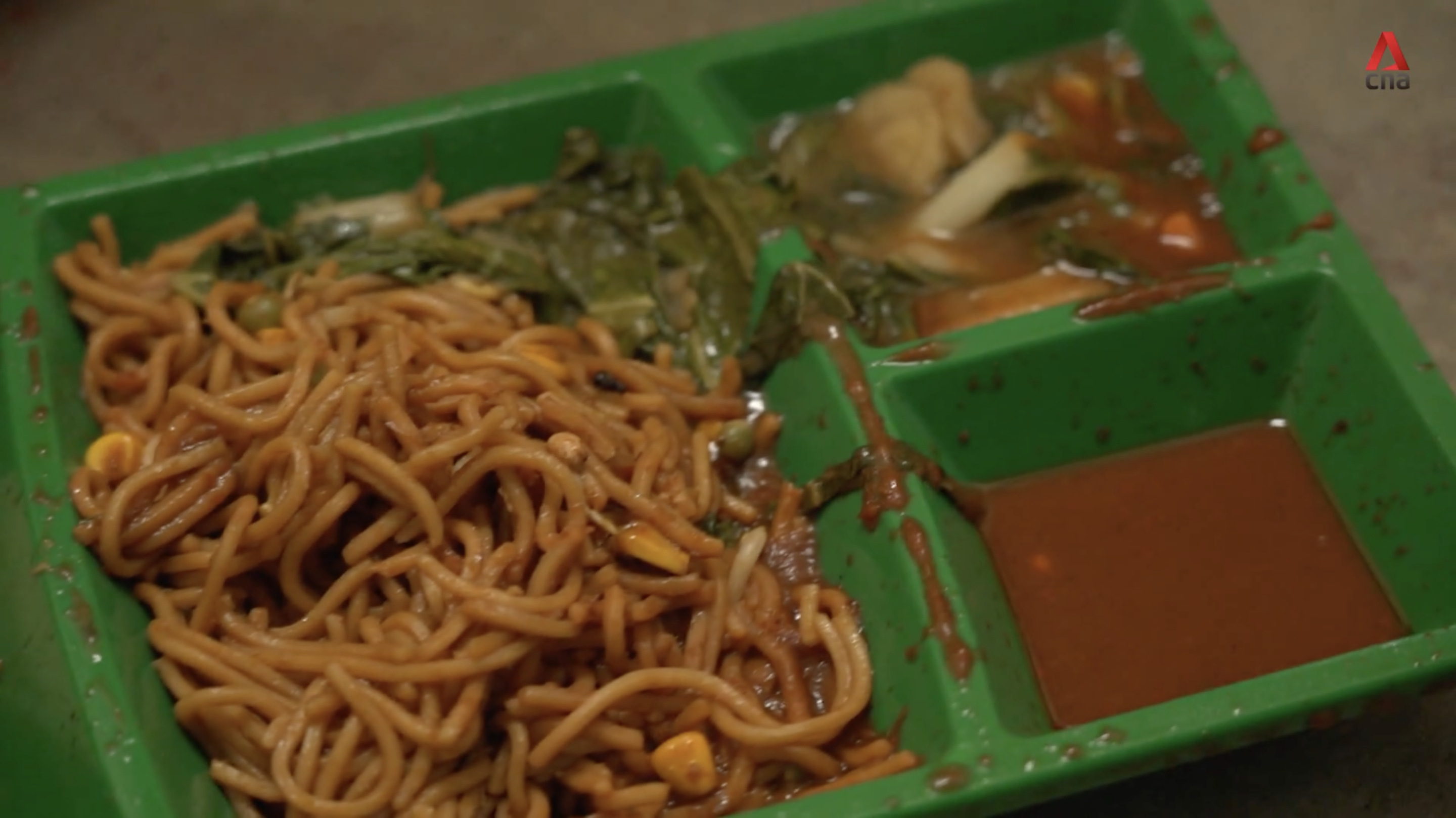 Image screenshot from CNA video.
Image screenshot from CNA video.
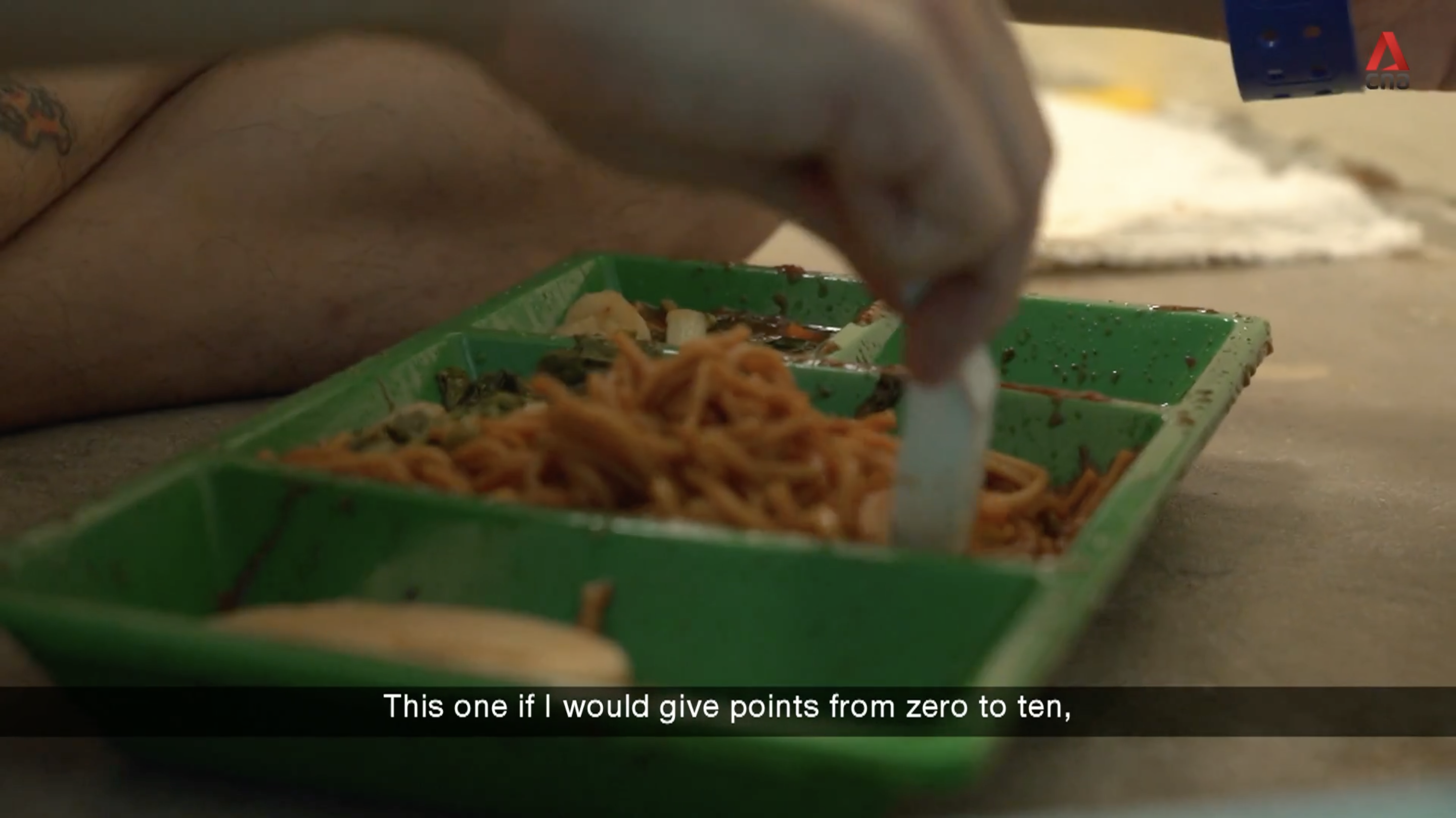 Image screenshot from CNA video.
Image screenshot from CNA video.
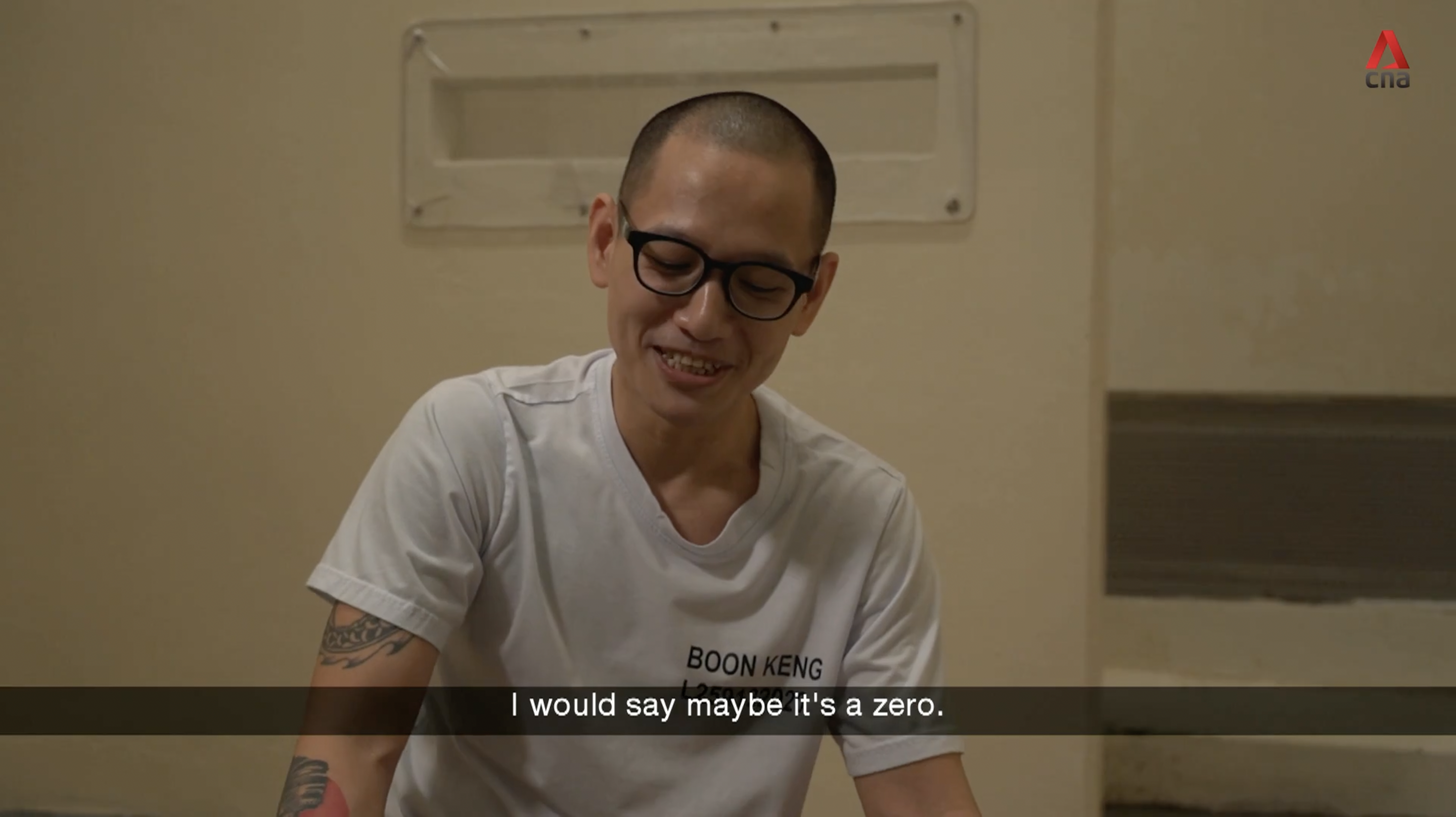 Image screenshot from CNA video.
Image screenshot from CNA video.
Clearly, someone is not a fan of prison noodles.
Yard time 3:30 pm
Yard time is two hours and held twice a week on Tuesdays and Thursdays, where inmates are released from their cells.
They can play sports and exercise with other inmates, or read the newspaper or play games on the benches in the facility.
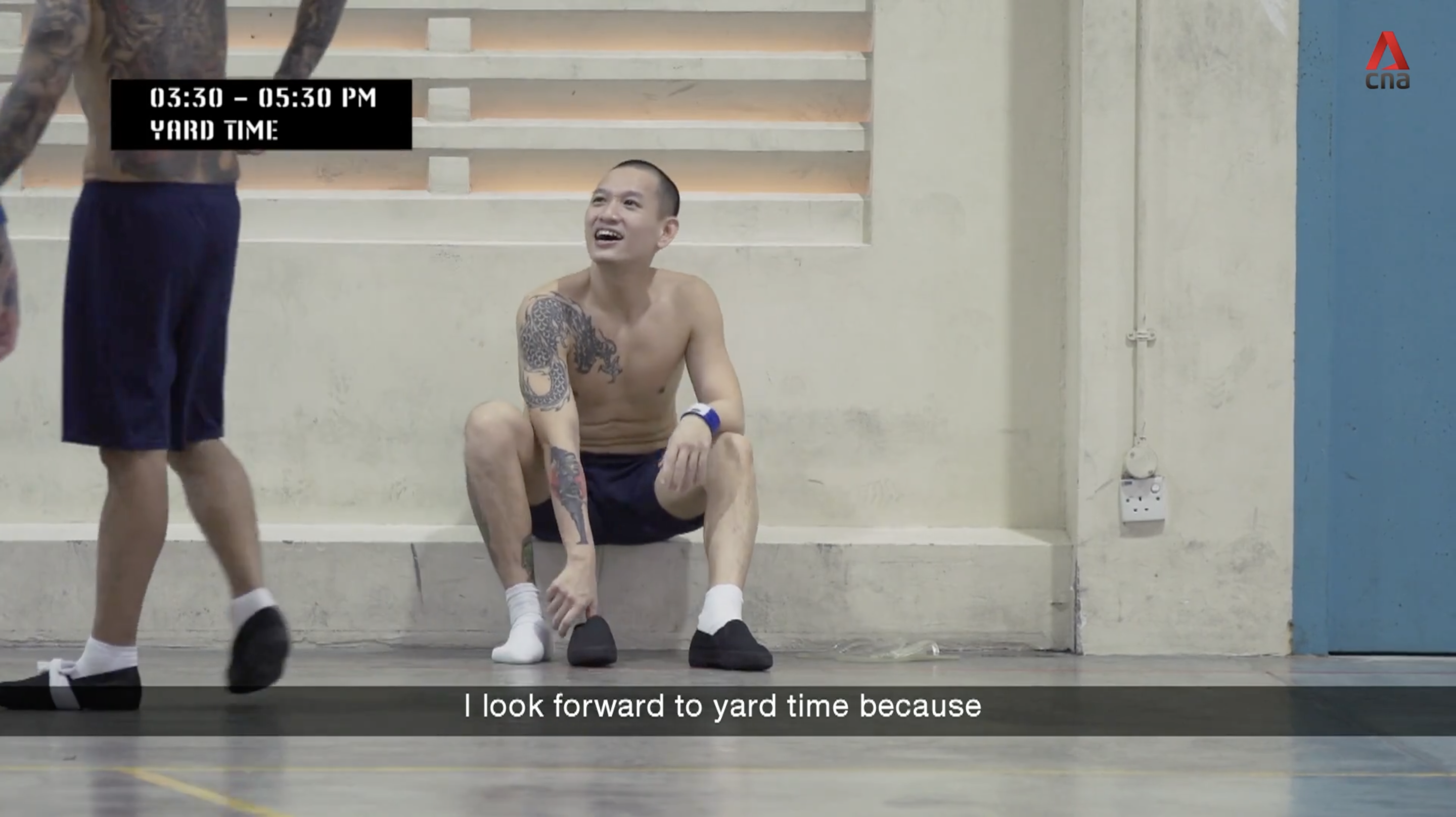 Image screenshot from CNA video.
Image screenshot from CNA video.
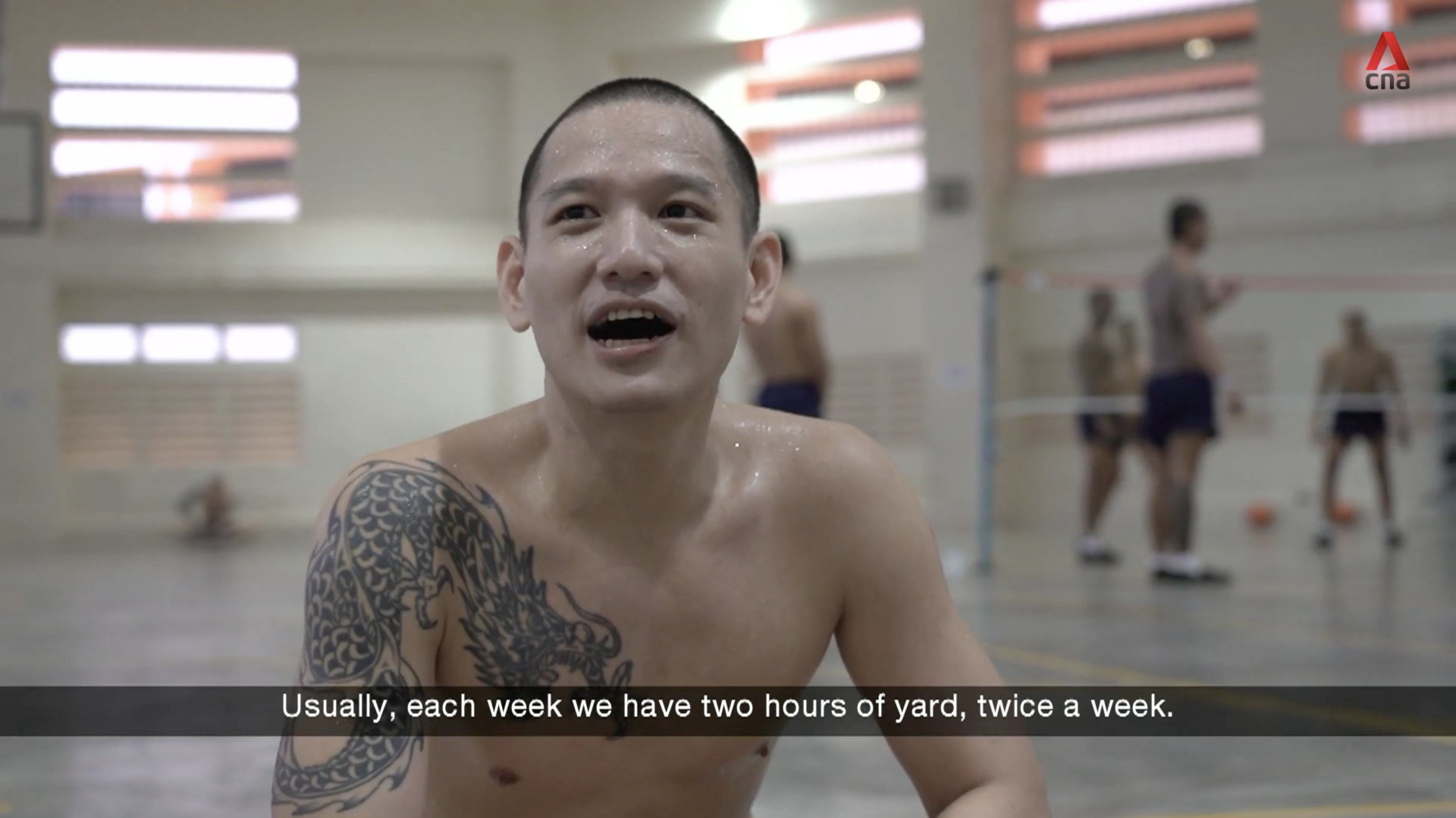 Image screenshot from CNA video.
Image screenshot from CNA video.
The inmates' exercise and activities are basic, and have to rely on their own body weight as resistance.
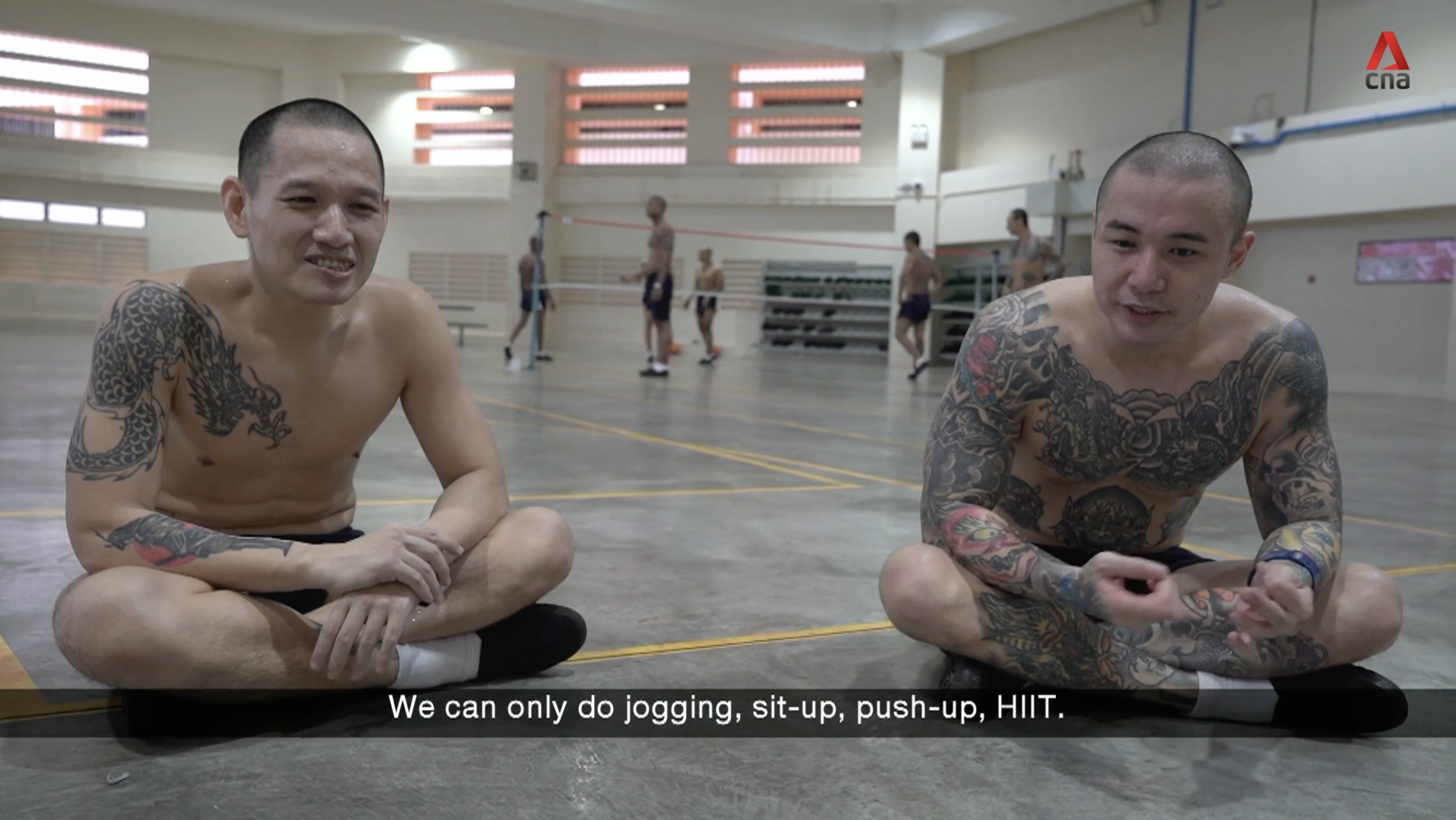 Image screenshot from CNA video.
Image screenshot from CNA video.
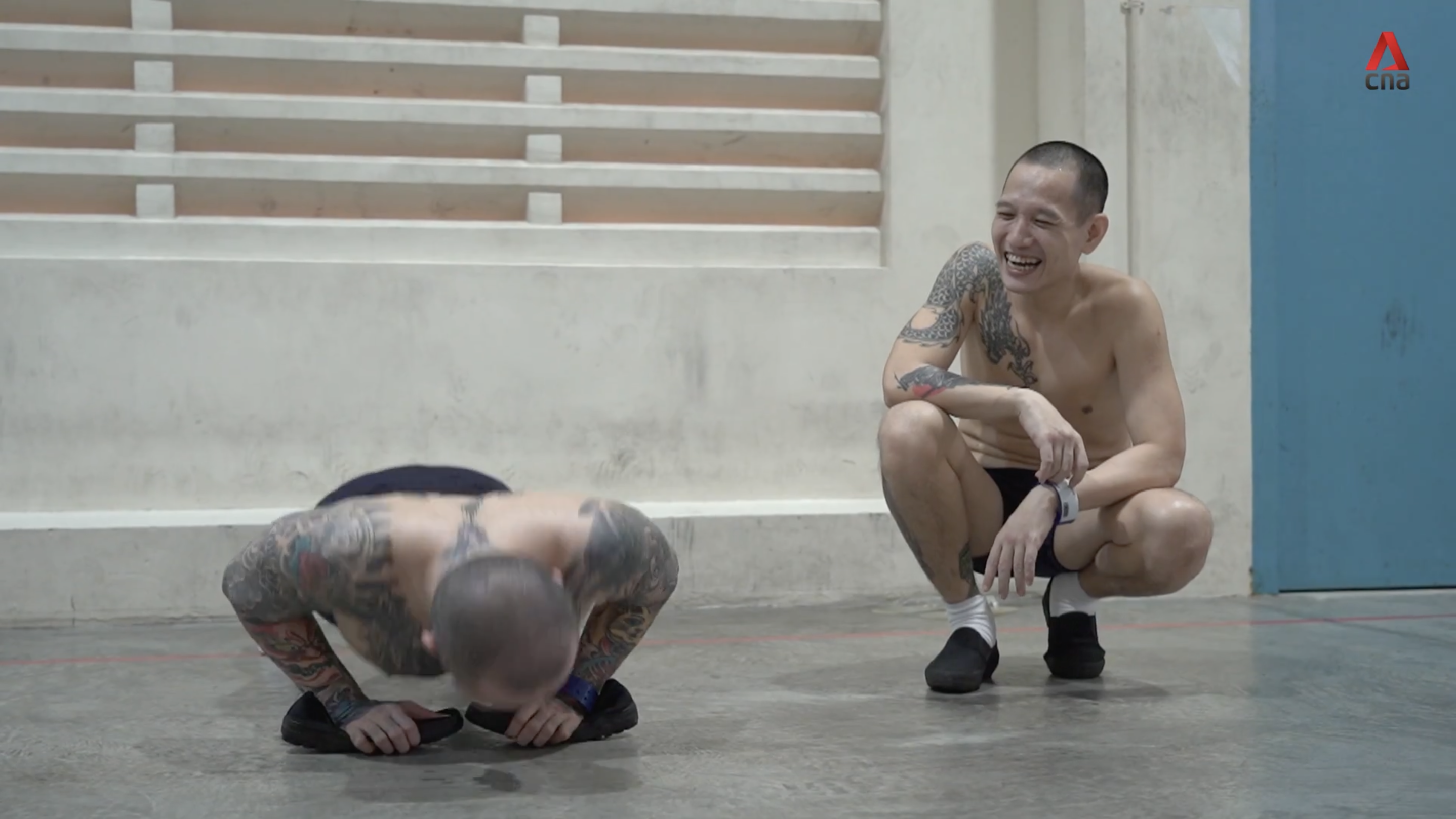 Image screenshot from CNA video.
Image screenshot from CNA video.
All of these activities are supervised by prison officers on the ground, who are situationally aware as multiple inmates can easily overpower one officer.
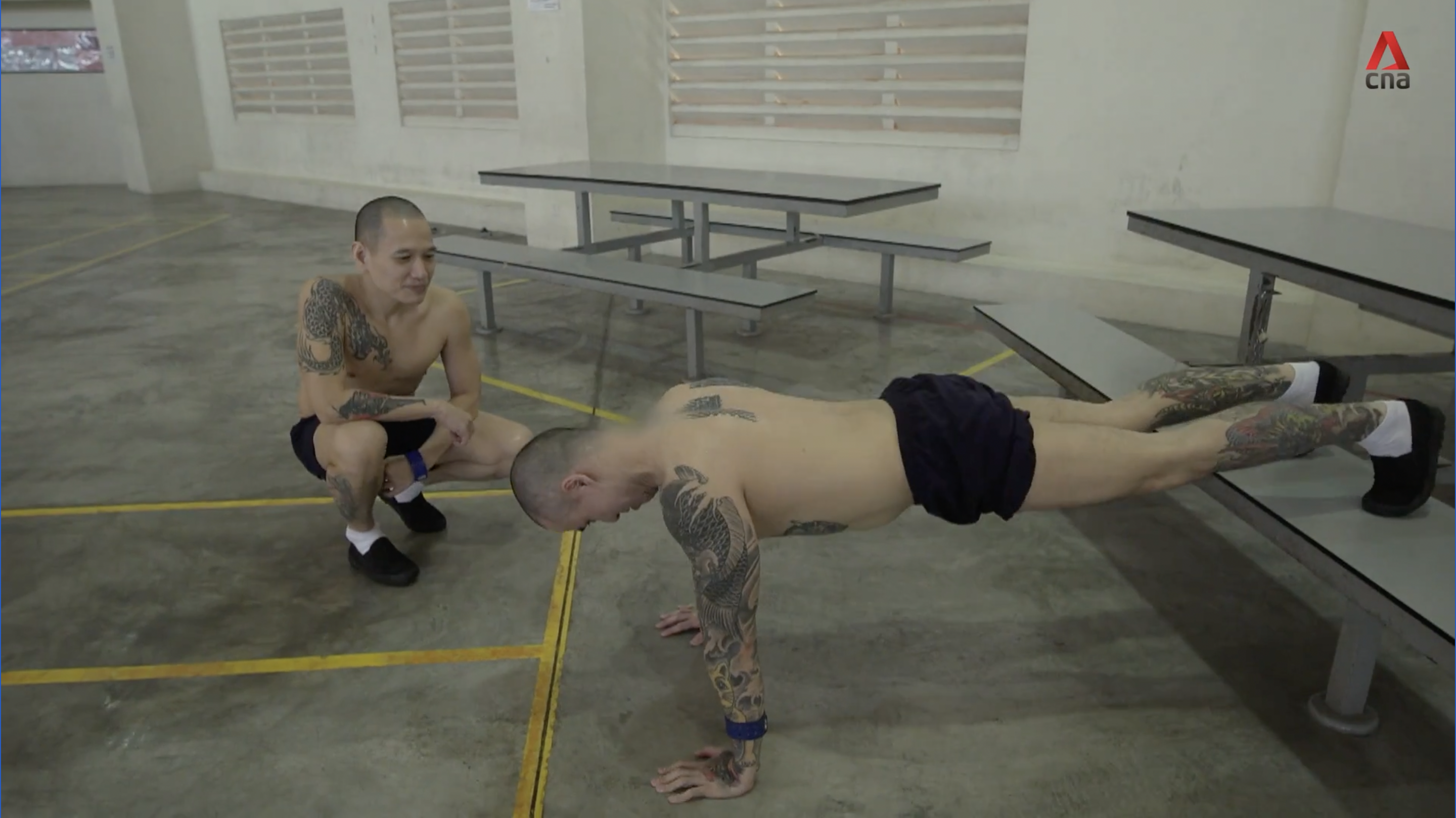 Image screenshot from CNA video.
Image screenshot from CNA video.
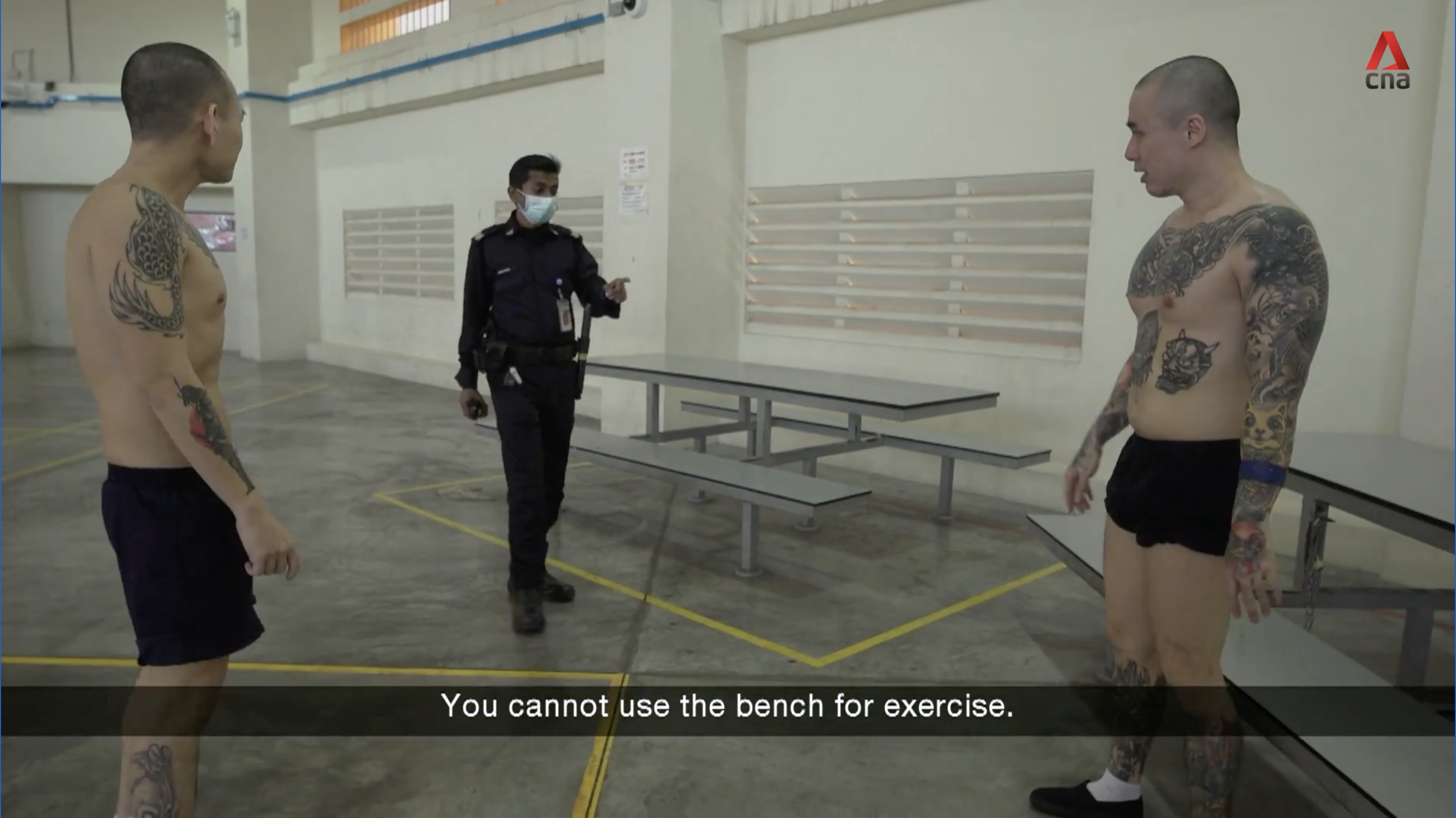 Image screenshot from CNA video.
Image screenshot from CNA video.
One of the inmates demonstrates the wrong behaviour, which gets noticed by a guard immediately.
However, the inmate said people in prison will do things they are told not to do, because how much worse can it get when they are already in prison?
Activities for inmates
Work
Inmates can participate in work, such as preparing meals for other inmates, doing laundry, or becoming a peer facilitator.
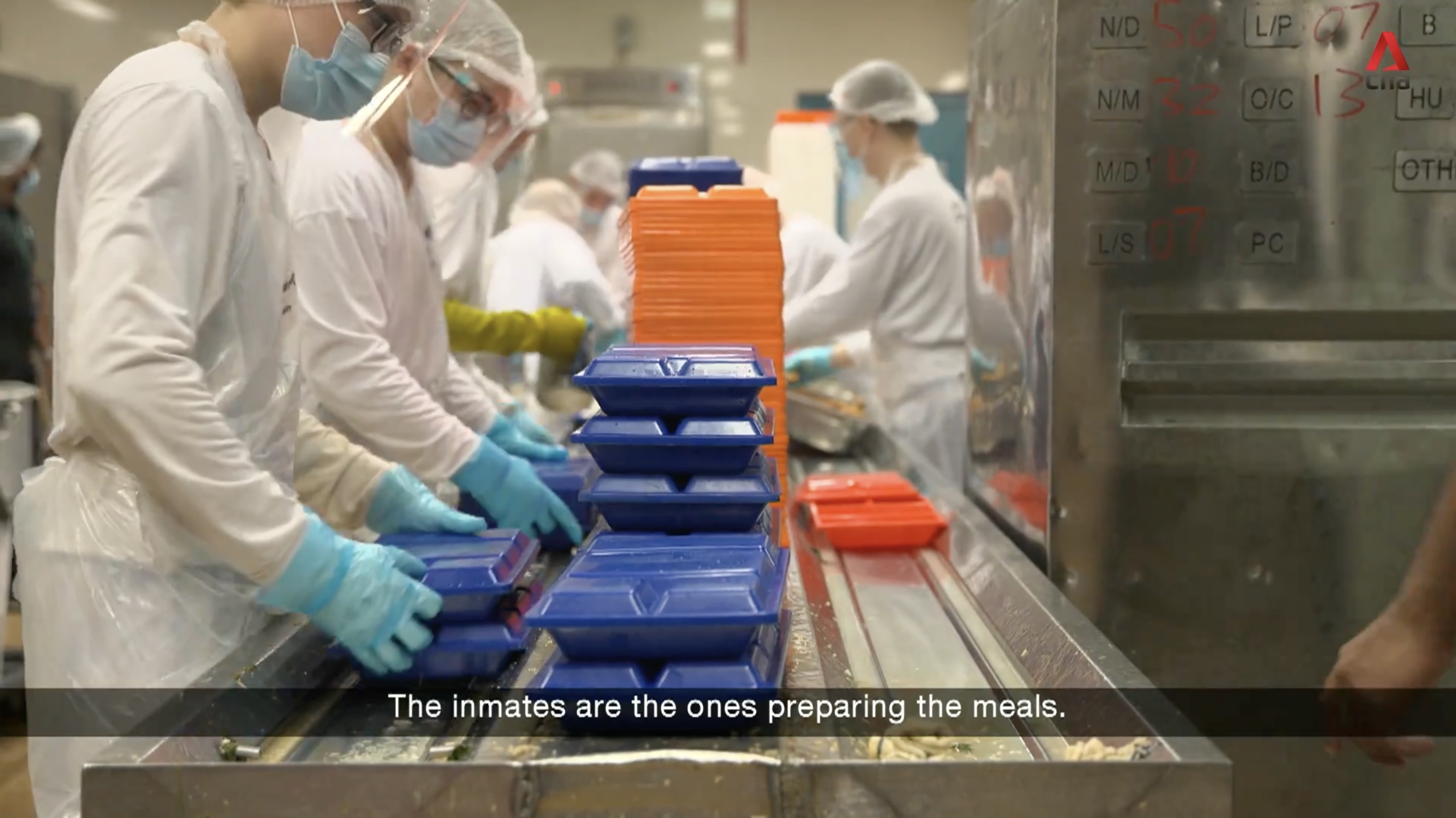 Image screenshot from CNA video.
Image screenshot from CNA video.
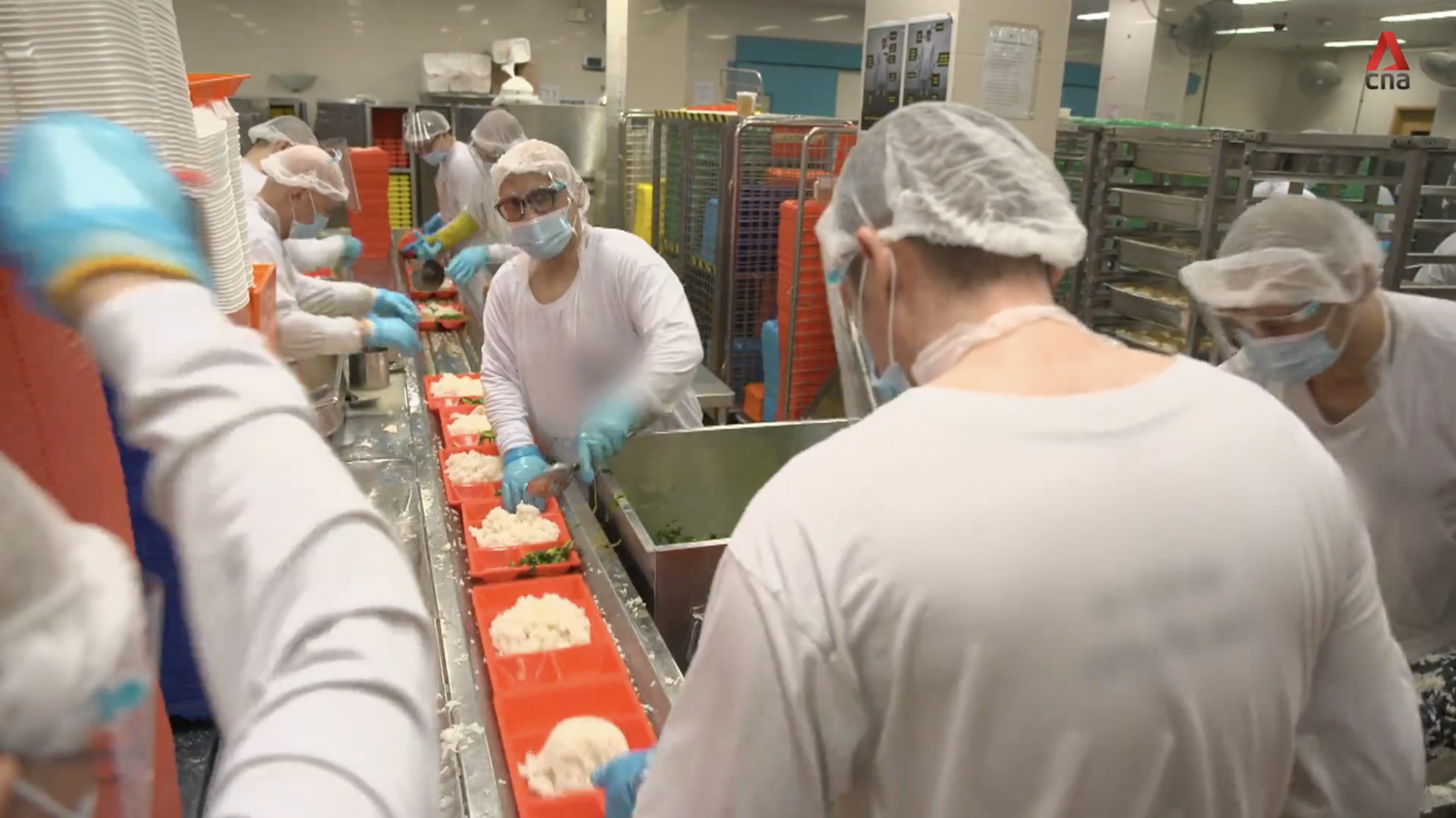 Image screenshot from CNA video.
Image screenshot from CNA video.
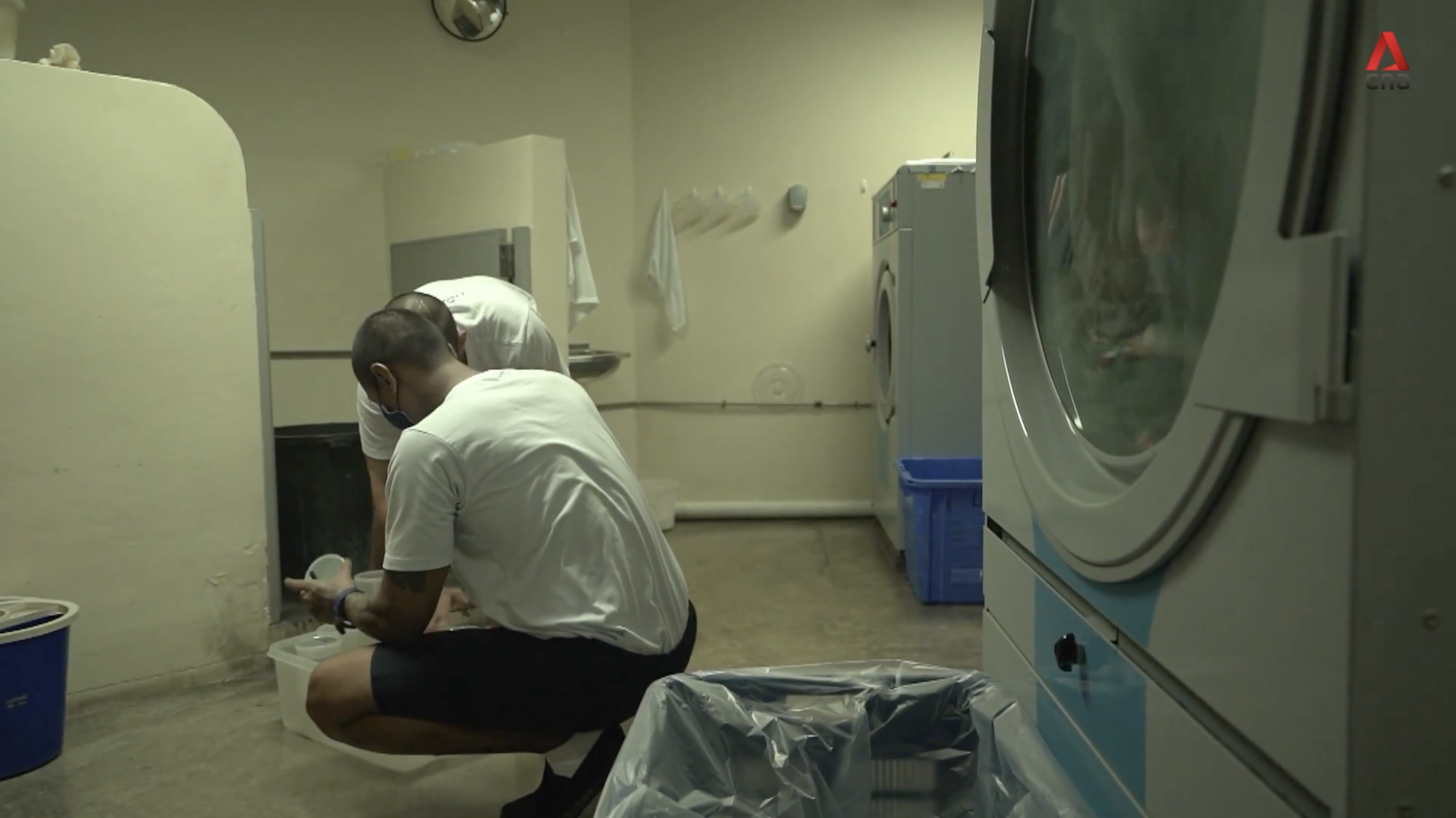 Image screenshot from CNA video.
Image screenshot from CNA video.
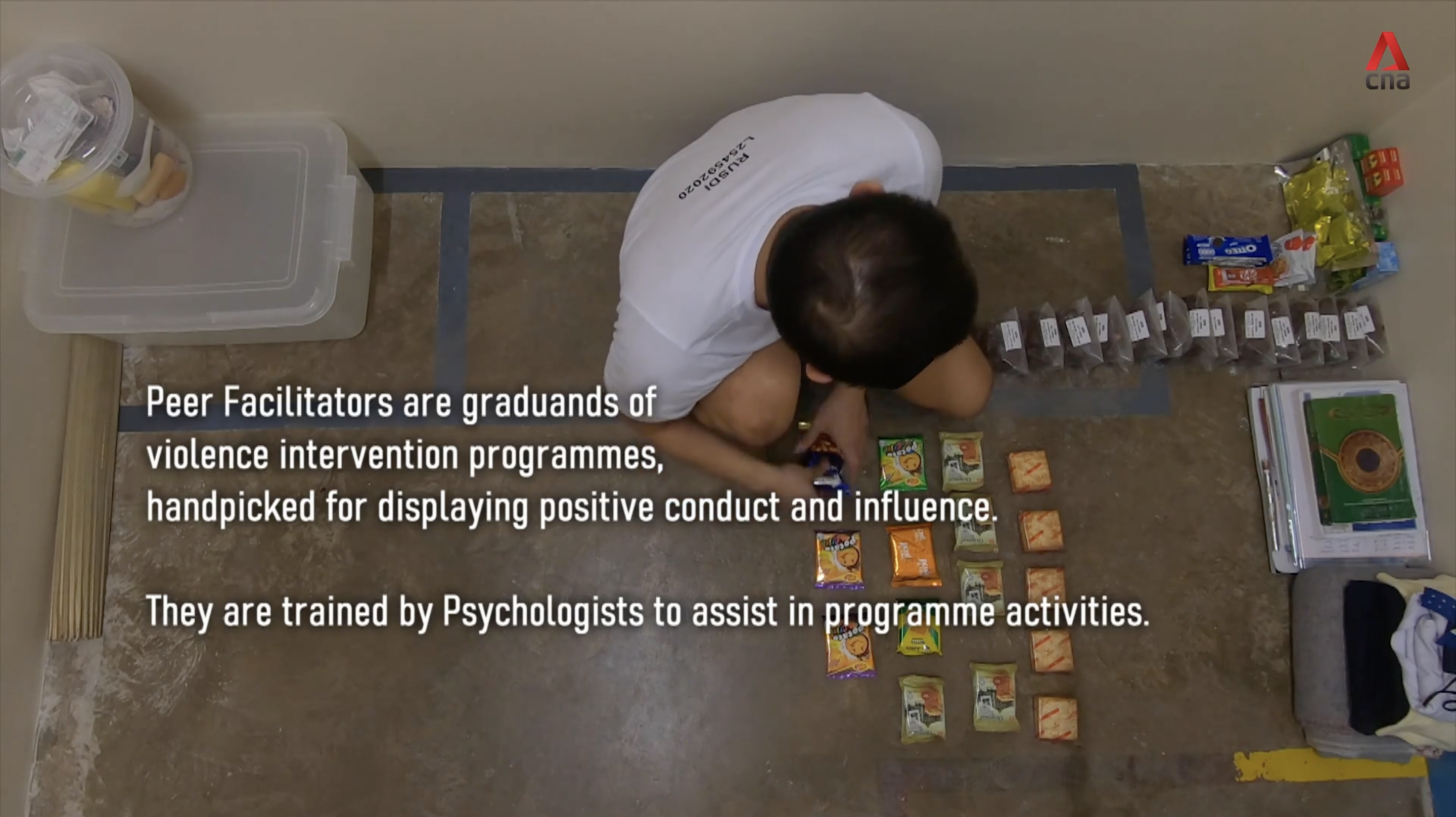 Image screenshot from CNA video.
Image screenshot from CNA video.
This work gives them an allowance that can be used for snacks and canteen items, such as scented soap -- which is a treat and incentive to behave well behind bars.
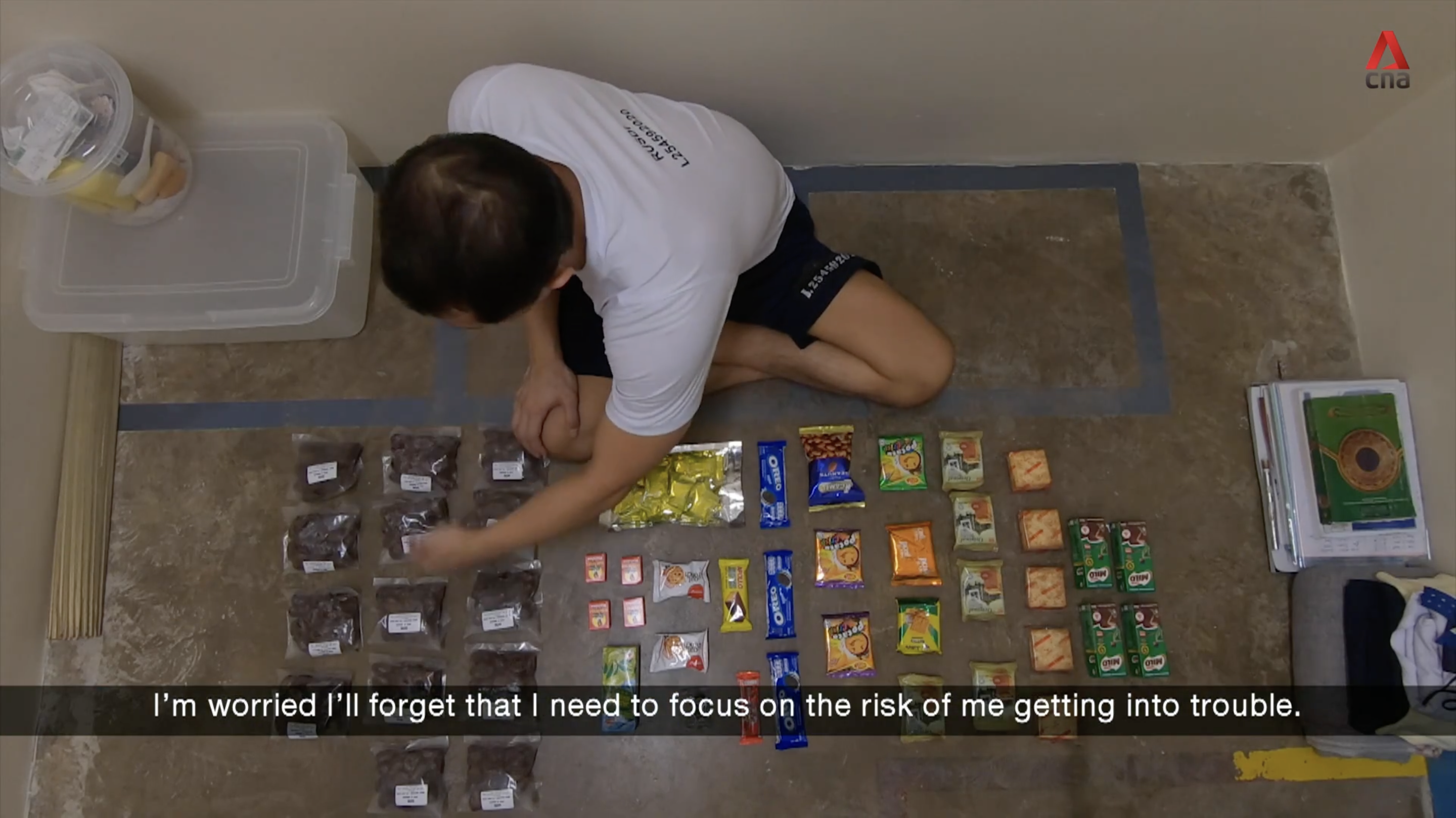 Image screenshot from CNA video.
Image screenshot from CNA video.
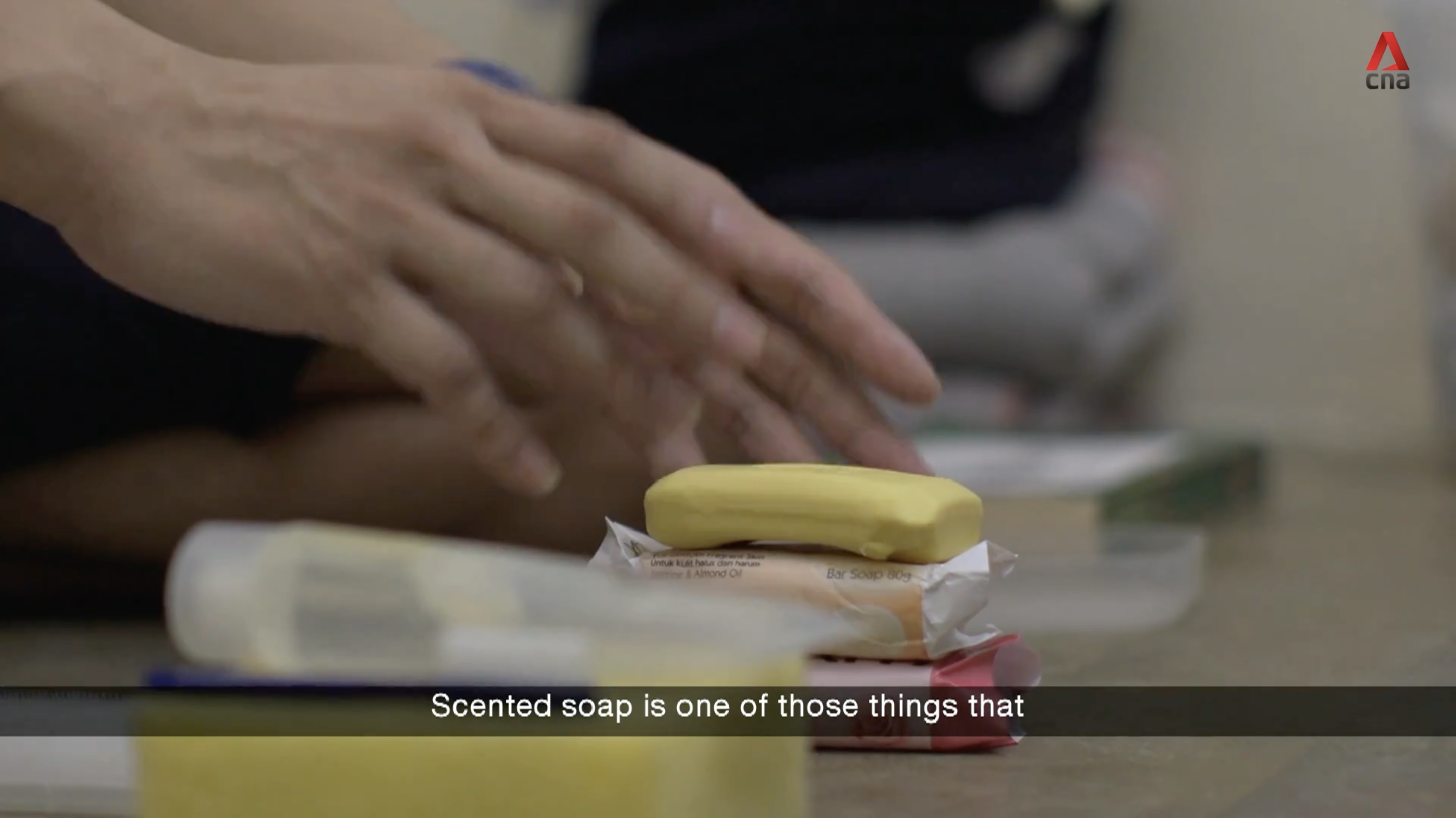 Image screenshot from CNA video.
Image screenshot from CNA video.
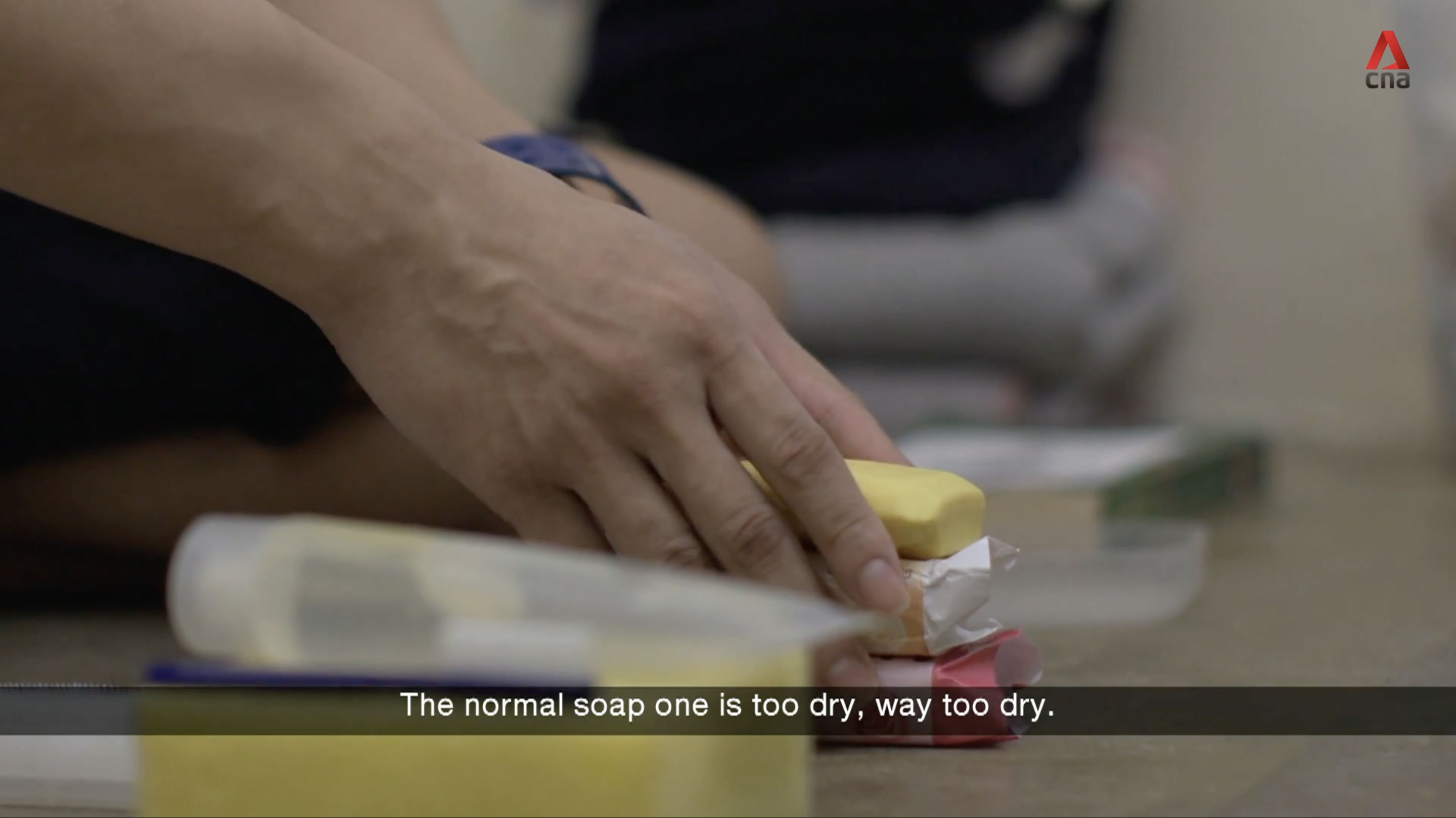 Image screenshot from CNA video.
Image screenshot from CNA video.
Visual Arts Hub
Those with an artistic bent, can do art. One inmate was taught by a trainer and could draw his wife.
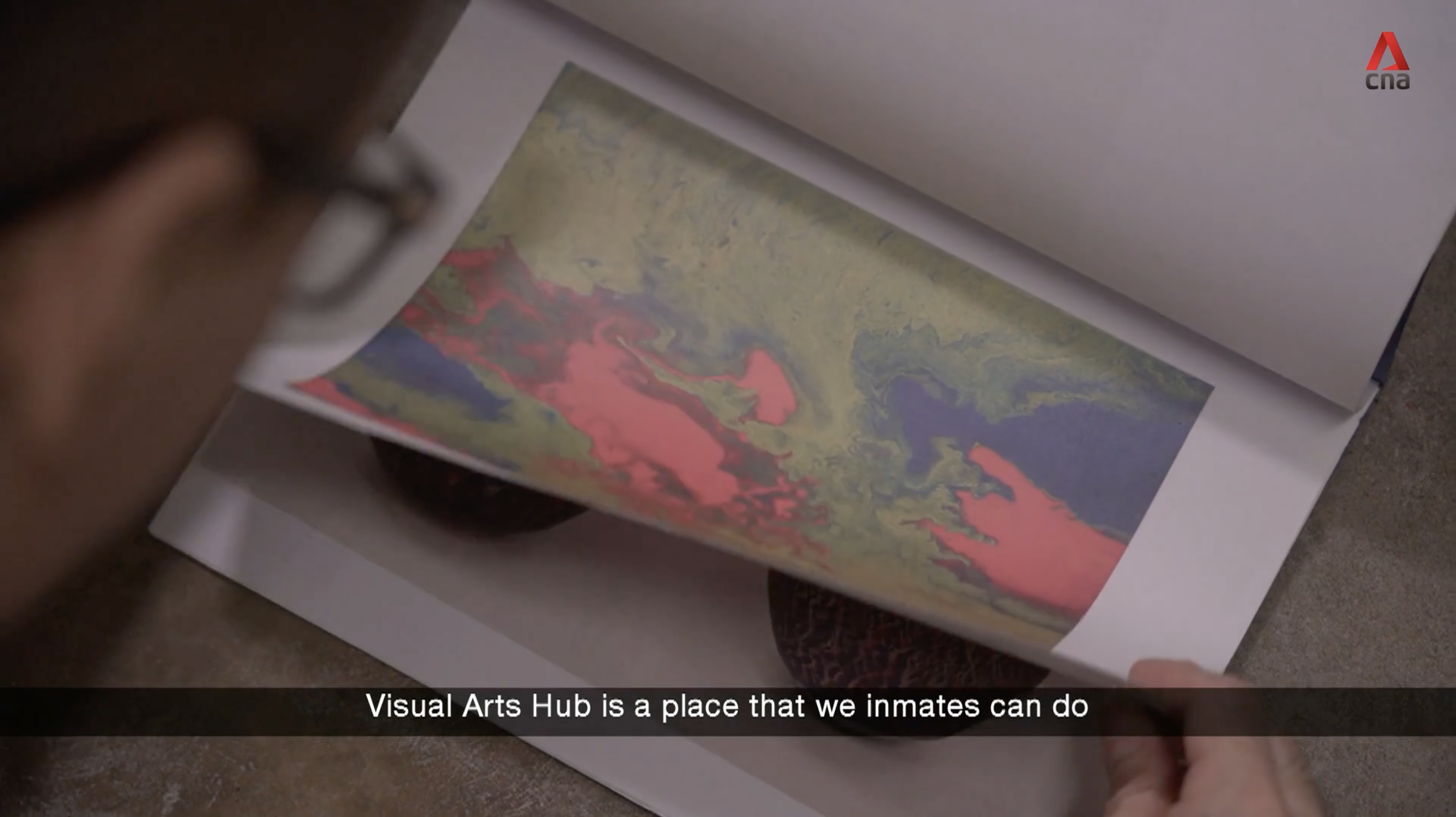 Image screenshot from CNA video.
Image screenshot from CNA video.
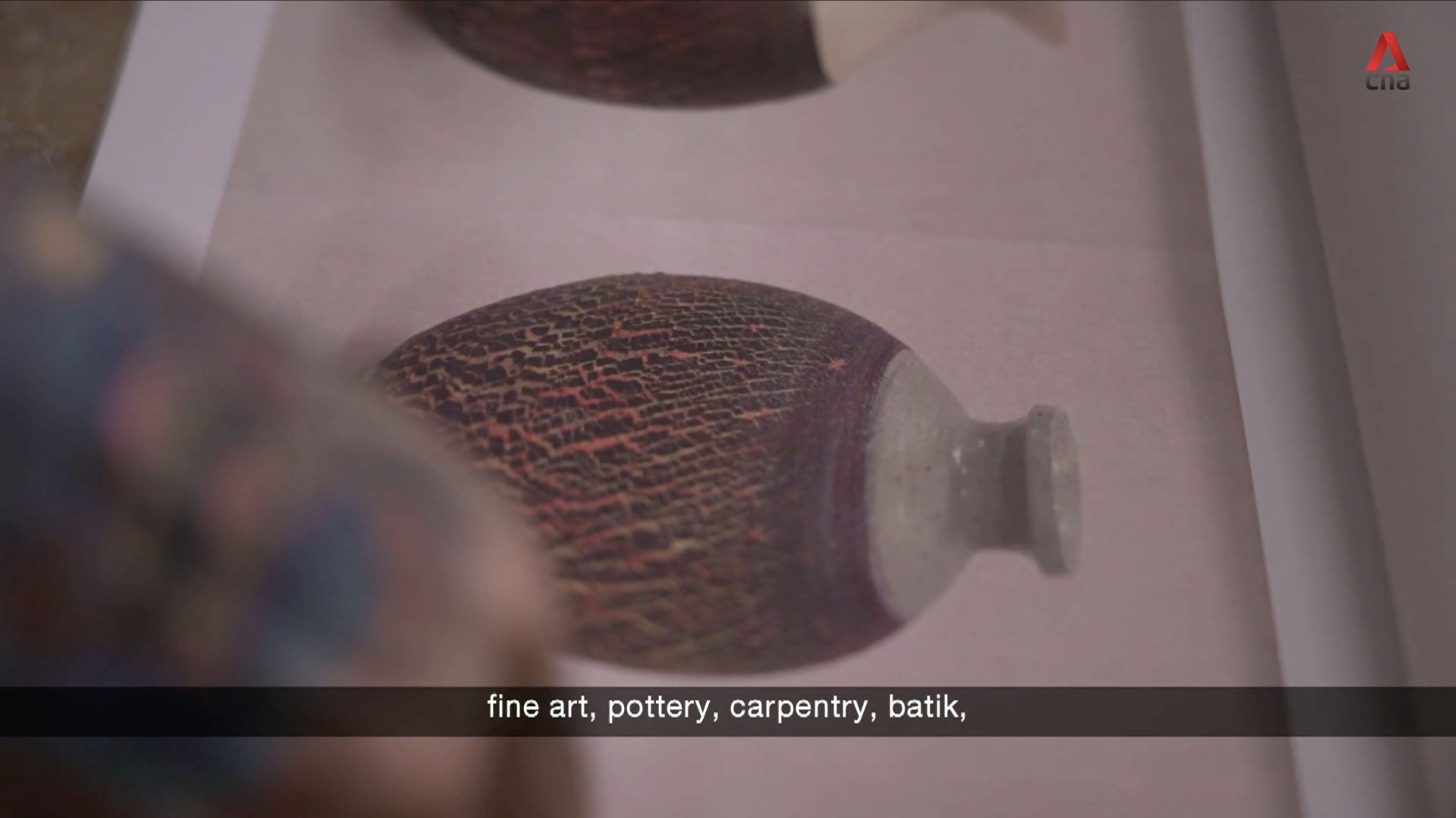 Image screenshot from CNA video.
Image screenshot from CNA video.
Illegal tattooing
However, inmates have been known to turn to other illegal activities, such as tattooing themselves during their free time to overcome boredom.
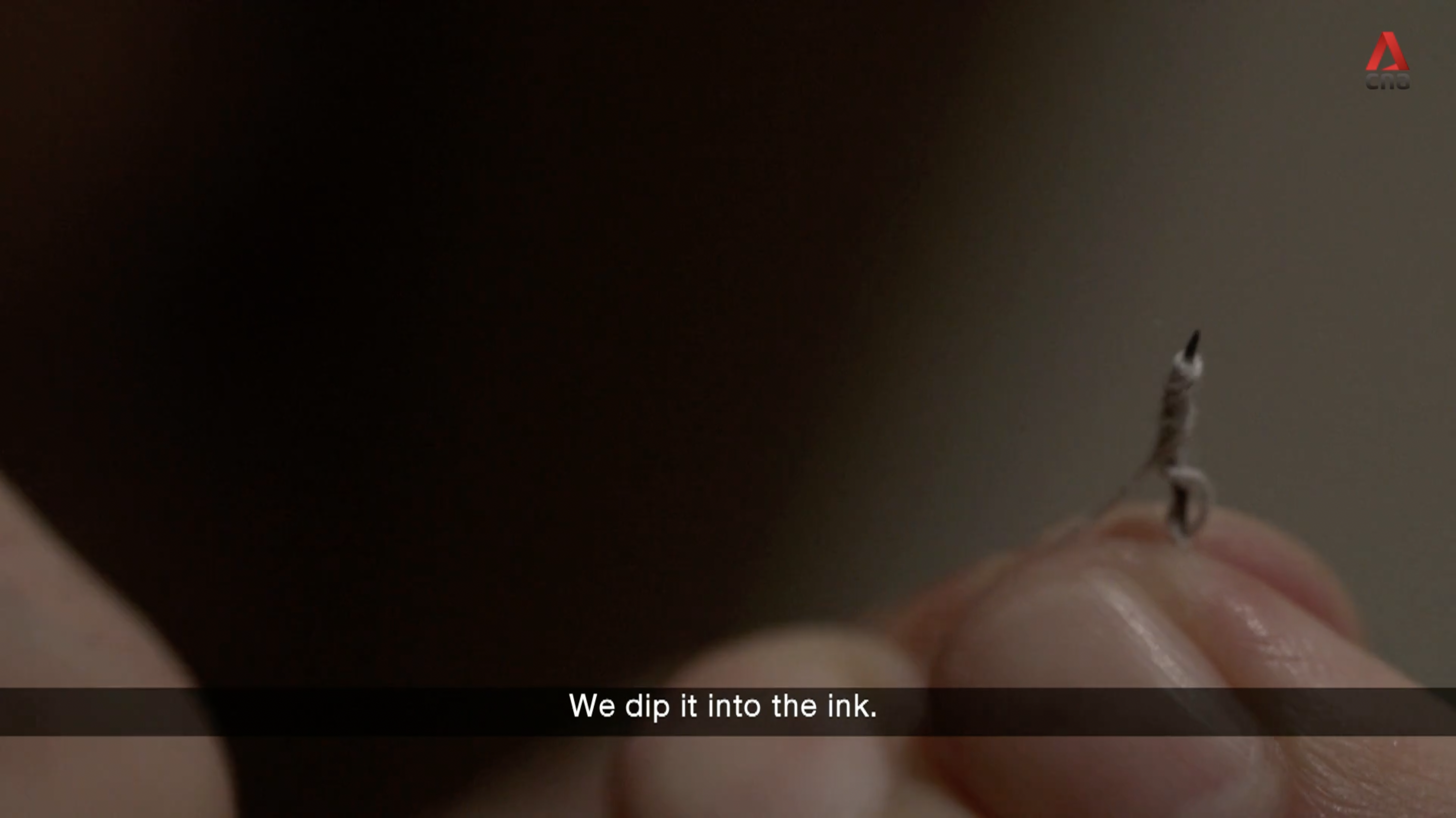 Image screenshot from CNA video.
Image screenshot from CNA video.
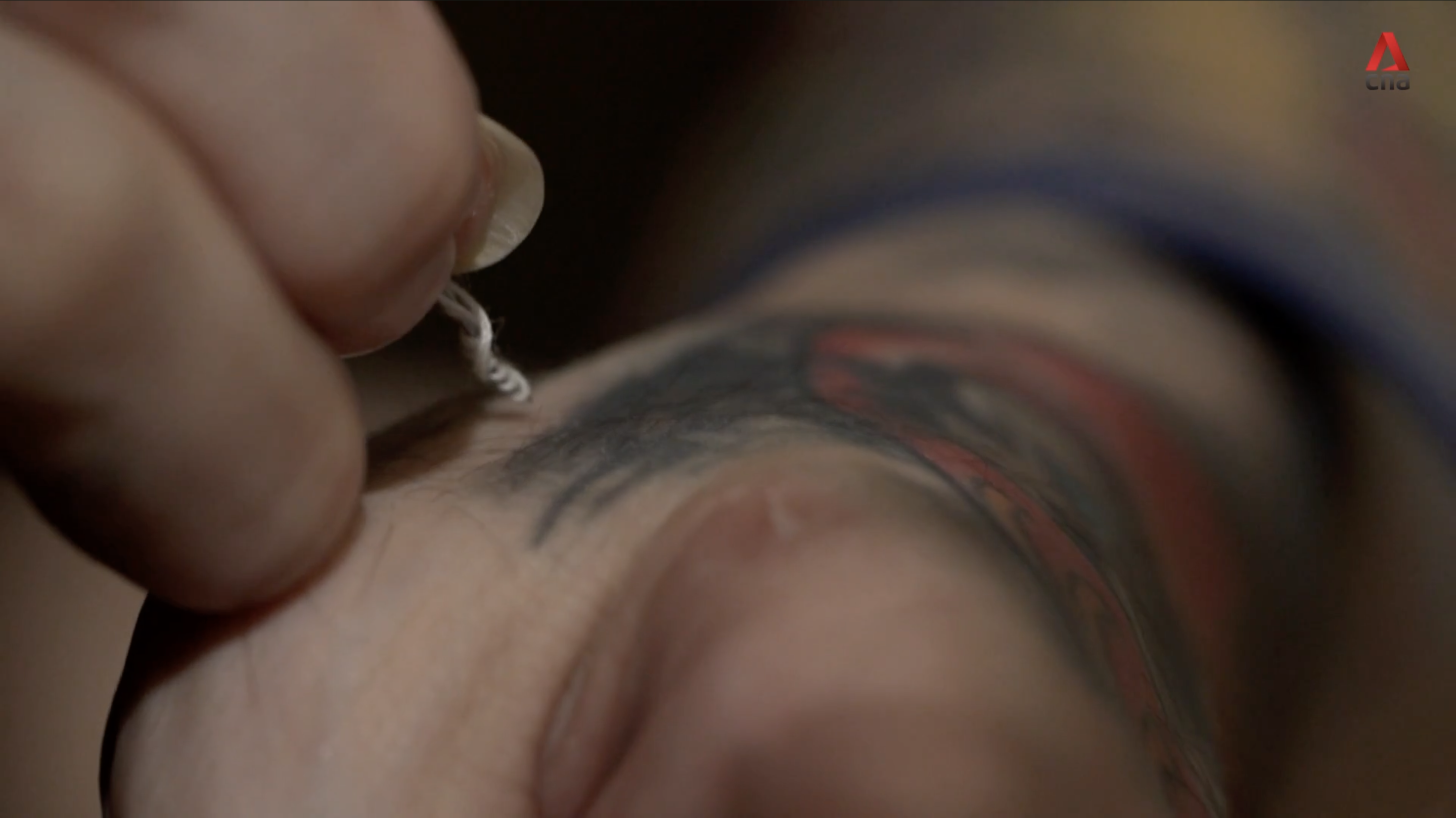 Image screenshot from CNA video.
Image screenshot from CNA video.
Inmates remove staplers from magazines and sharpen the metal against the concrete floor to achieve a needle-like tool.
The colouring is derived from charcoal pills that inmates are given if they complain of diarrhoea.
The self-tattooing process can then be carried out using these simple devices.
This has resulted in infections.
Special shout-out to Jim Ang's impeccably styled hair
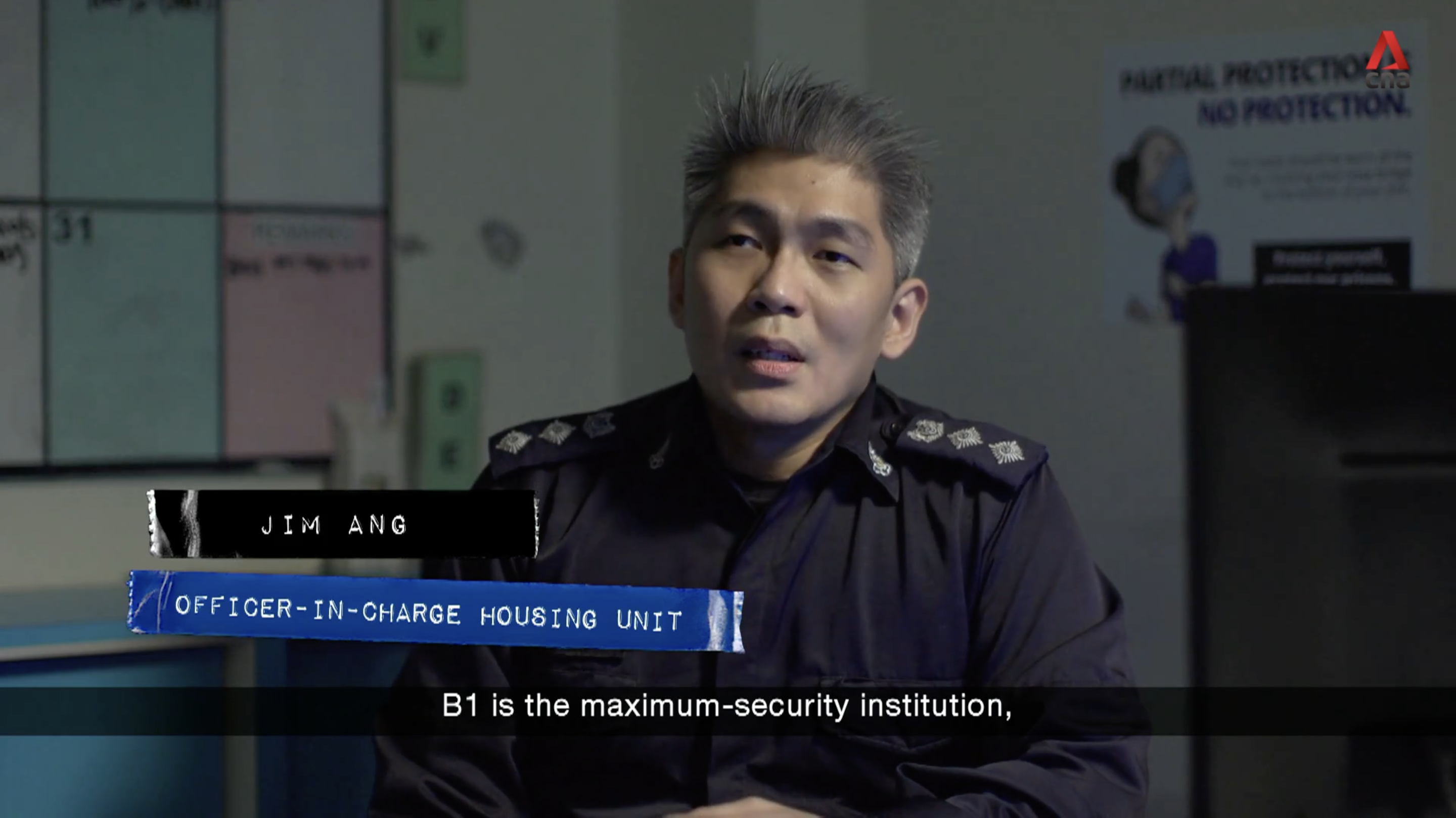 Image screenshot from CNA video.
Image screenshot from CNA video.
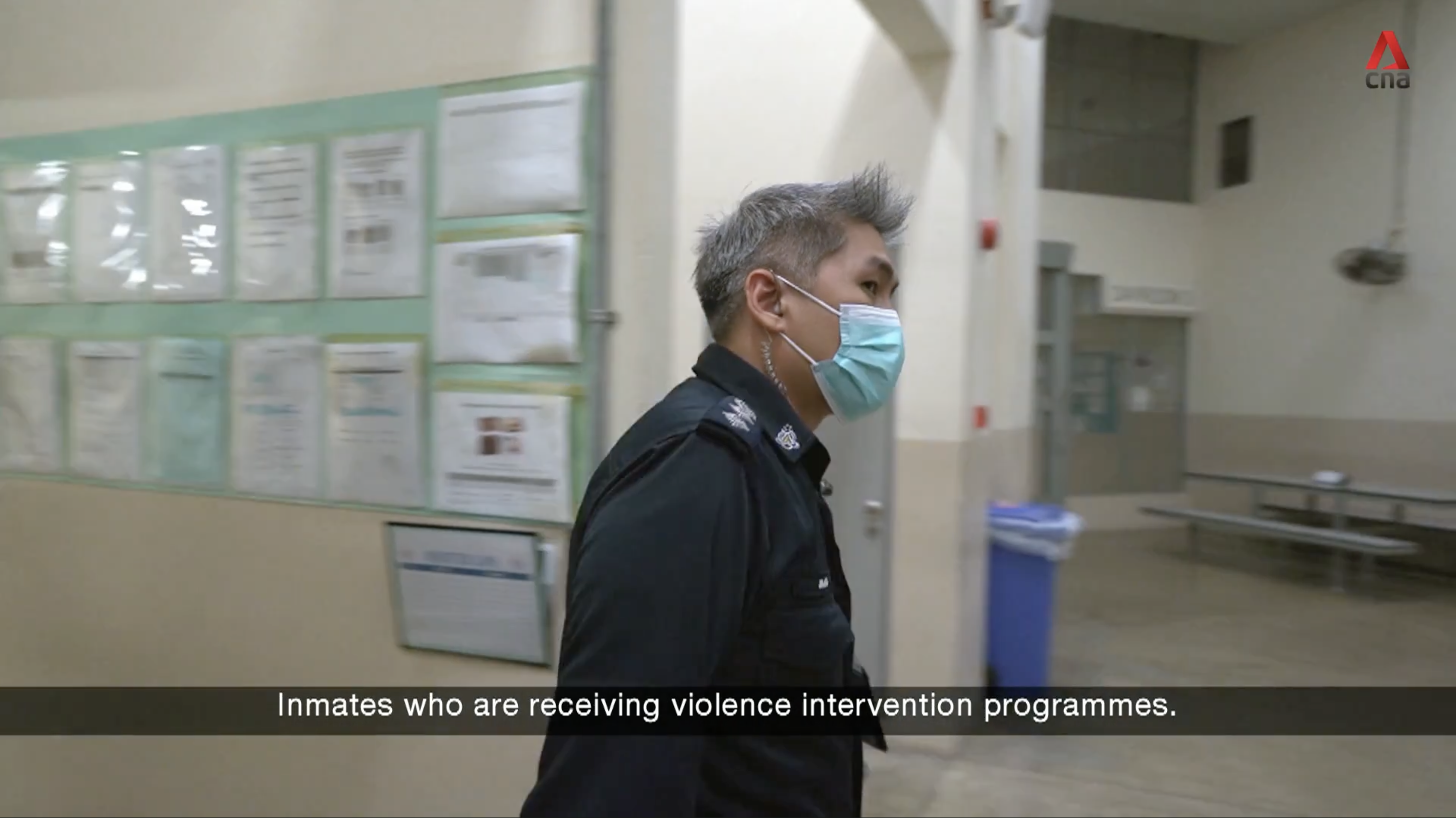 Image screenshot from CNA video.
Image screenshot from CNA video.
You can watch the episode here or here.
Follow and listen to our podcast here
Top image screenshot from CNA's video
If you like what you read, follow us on Facebook, Instagram, Twitter and Telegram to get the latest updates.
